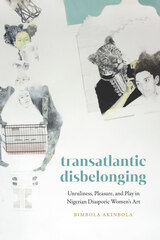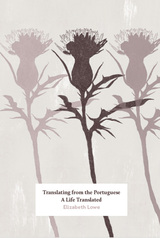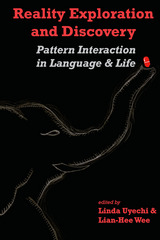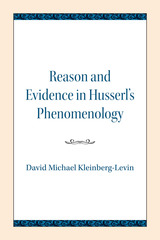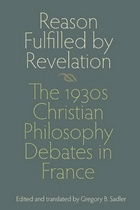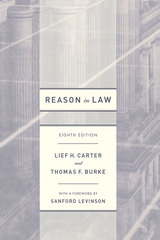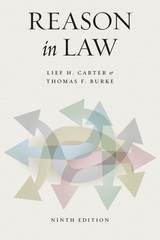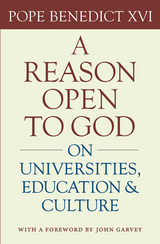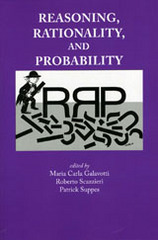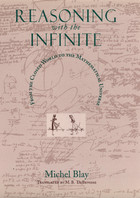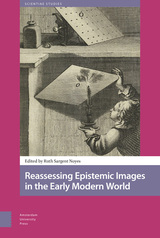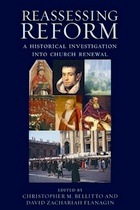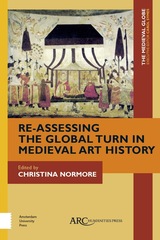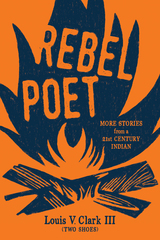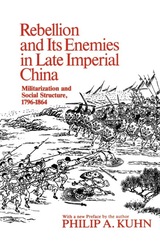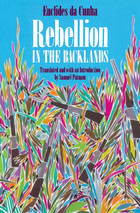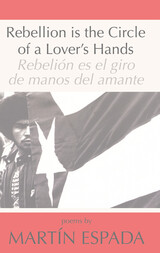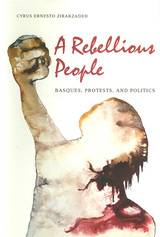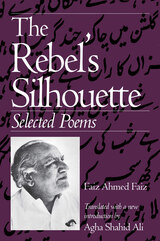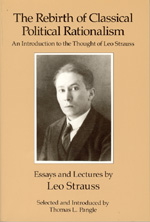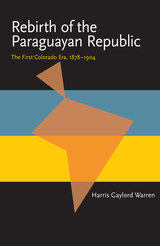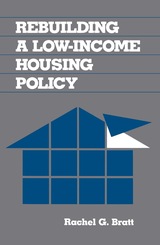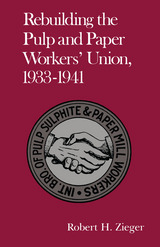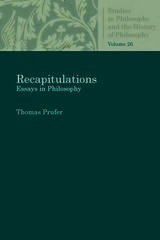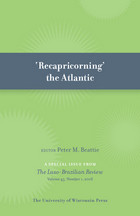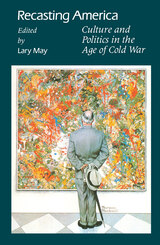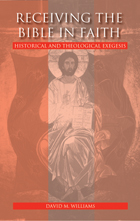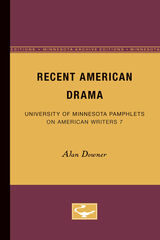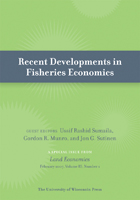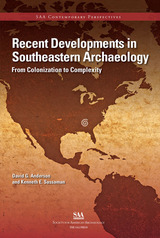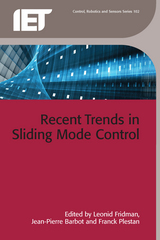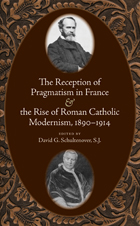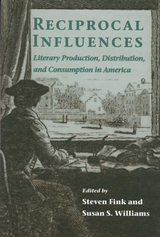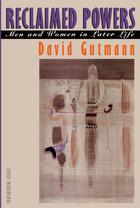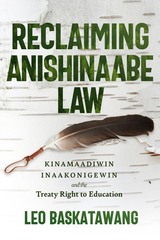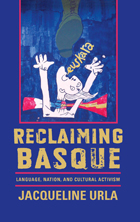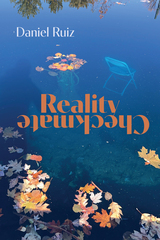 Reality Checkmate
Daniel Ruiz
Four Way Books, 2025 A dynamic and philosophical debut collection, Daniel Ruiz’s Reality Checkmate choreographs the endless wrestling match between lyrical sensibility and ontological principles taking place on the mind’s stage. These poems exquisitely demonstrate that phenomena in the material world are rarely as simple as they seem and yet must continually confront the universe’s countermove—the constraints of life itself, the knowledge that all we truly have is the present moment and the face value of our perceptions. He succinctly summarizes the history of art as cultural capital—“all of us are / eternally punished with proving / literature is about literature // after all”—while revealing the redundancies and blind spots of intellectualism—“Meanwhile, a lost sheep / finds grass to eat // anywhere it wants, / and does not mind, / like Lorca, letting its hair // grow long.” While Reality Checkmate delights in the cerebral mode, its celebration of relativity as well as the lush materiality of language yields equal imagery and musicality, upholding sensory experience and human relationships as existentially significant in the absence of absolute truths. In Ruiz’s astonishing first book, dawn is not morning—or rather, not merely morning. “Madrugada” rejects a navel-gazing discourse on sentimentality and the passage of days, commanding that “you for whom meaning / is the meaning of beauty, be gone.” We could spend our whole lives ideating a metaphysics of time and waste the wonder of sunlight right in front of us. “Meanwhile, / the clouds are proud of all of us. It’s 12:01. / A man dragged by a poodle says / Good morning. Everyone in the orchestra / stands up at once.”
Reality Exploration and Discovery: Pattern Interaction in Language and Life
Edited by Linda Ann Uyechi and Lian-Hee Wee
CSLI, 2009 The twenty-five papers in this volume present current analyses of a variety of data and, more significantly, illustrate the various analytical tools available to linguists in the quest for deeper comprehension of the puzzles, questions, and problems they confront in natural language. The distinguished authors collected here explore interactions between linguistic structure and sound patterns across a diverse set of languages. The integrating theme of the volume is the influence of K. P. Mohanan’s philosophy of inquiry, derived not only from his rich body of diverse work but also from the fresh perspectives and intellectual vitality that he has shared with colleagues and students in a career spanning over three decades.
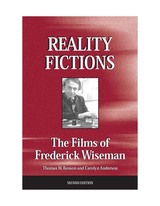 Reality Fictions: The Films of Frederick Wiseman
Thomas W. Benson and Carolyn Anderson
Southern Illinois University Press, 2002 Providing in-depth accounts and close critical examinations of nine of Wiseman’s films—Titicut Follies, High School, Basic Training, Essene, Juvenile Court, Primate, Welfare, Canal Zone, and The Store—thissecond edition features a new introduction, a revised and updated filmography, and an updated bibliography. No book on documentary film has ever analyzed in such detail the work of a single filmmaker. In impeccable close readings of his films, Tom Benson and Carolyn Anderson explore how Frederick Wiseman has elaborated his widely admired sensibility. A special feature is an extended chapter on the legal difficulties encountered by Wiseman’s first documentary, Titicut Follies, an unflinching depiction of conditions in the Massachusetts Correctional Institution at Bridgewater. The Commonwealth of Massachusetts took Wiseman to court, seeking to prevent the exhibition of Titicut Follies. In New York State, three judges refused to issue an injunction against the film. In Massachusetts, the film was the subject of a sensational series of legislative hearings and a court trial, in which the principals gave very different stories of the conditions and terms under which the film had been negotiated and produced. Wiseman, himself an attorney, exchanged charges and countercharges with Massachusetts Attorney General Elliot Richardson, and the controversy split the civil liberties community. Judge Harry Kalus, calling Titicut Follies "a nightmare of ghoulish obscenities," not only ruled for the Commonwealth but ordered that the film be destroyed. On appeal, the Massachusetts Supreme Judicial Court modified the Kalus ruling, allowing the film to be seen only by professional audiences. Titicut Follies became the only American film whose exhibition is restricted for reasons other than obscenity or national security. After Titicut Follies, Wiseman went on to become a major independent documentary producer. Many of his films have been shown on public television in the United States and at film festivals around the world. The films are widely admired and often highly controversial. Wiseman has developed a unique cinematic rhetoric that draws from both the documentary and fiction traditions to describe American institutions: a high school, basic training, a monastery, a juvenile court, a primate research center, a welfare agency, the Panama canal zone, and a department store. Benson and Anderson scrutinize each of these films, record the reactions of some of his subjects and audiences, and present the heretofore neglected contributions of his four cinematographers: John Marshall, Richard Leiterman, William Brayne, and John Davey.
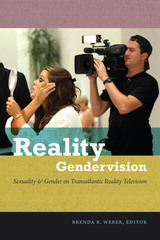 Reality Gendervision: Sexuality and Gender on Transatlantic Reality Television
Brenda R. Weber, ed.
Duke University Press, 2014 This essay collection focuses on the gendered dimensions of reality television in both the United States and Great Britain. Through close readings of a wide range of reality programming, from Finding Sarah and Sister Wives to Ghost Adventures and Deadliest Warrior, the contributors think through questions of femininity and masculinity, as they relate to the intersections of gender, race, class, and sexuality. They connect the genre's combination of real people and surreal experiences, of authenticity and artifice, to the production of identity and norms of citizenship, the commodification of selfhood, and the naturalization of regimes of power. Whether assessing the Kardashian family brand, portrayals of hoarders, or big-family programs such as 19 Kids and Counting, the contributors analyze reality television as a relevant site for the production and performance of gender. In the process, they illuminate the larger neoliberal and postfeminist contexts in which reality TV is produced, promoted, watched, and experienced.
Contributors. David Greven, Dana Heller, Su Holmes, Deborah Jermyn, Misha Kavka, Amanda Ann Klein, Susan Lepselter, Diane Negra, Laurie Ouellette, Gareth Palmer, Kirsten Pike, Maria Pramaggiore, Kimberly Springer, Rebecca Stephens, Lindsay Steenberg, Brenda R. Weber
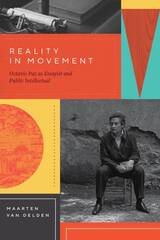 Reality in Movement: Octavio Paz as Essayist and Public Intellectual
Maarten van Delden
Vanderbilt University Press, 2021 In the last couple of decades there has been a surge of interest in Octavio Paz's life and work, and a number of important books have been published on Paz. However, most of these books are of a biographical nature, or they examine Paz's role in the various intellectual initiatives he headed in Mexico, specifically the journals he founded.
Reality in Movement looks at a wide range of topics of interest in Paz's career, including his engagement with the subversive, adversary strain in Western culture; his meditations on questions of cultural identity and intercultural contact; his dialogue with both leftist and conservative ideological traditions; his interest in feminism and psychoanalysis, and his theory of poetry. It concludes with a chapter on Octavio Paz as a literary character—a kind of reception study.
Offering a complex and nuanced portrait of Paz as a writer and thinker—as well as an understanding of the era in which he lived—Reality in Movement will appeal to students of Octavio Paz and of Mexican literature more generally, and to readers with an interest in the many significant literary, cultural, political, and historical topics Paz wrote about over the course of his long career.
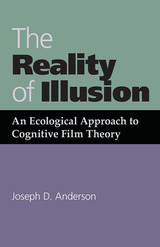 The Reality of Illusion: An Ecological Approach to Cognitive Film Theory
Joseph D. Anderson
Southern Illinois University Press, 1998 Applying research findings from studies in visual perception, neurophysiology, cognitive psychology, developmental psychology, and anthropology, Joseph D. Anderson defines the complex interaction of motion pictures with the human mind and organizes the relationship between film and cognitive science. Anderson’s primary argument is that motion picture viewers mentally process the projected images and sounds of a movie according to the same perceptual rules used in response to visual and aural stimuli in the world outside the theater. To process everyday events in the world, the human mind is equipped with capacities developed through millions of years of evolution. In this context, Anderson builds a metatheory influenced by the writings of J. J. and Eleanor Gibson and employs it to explore motion picture comprehension as a subset of general human comprehension and perception, focusing his ecological approach to film on the analysis of cinema’s true substance: illusion. Anderson investigates how viewers, with their mental capacities designed for survival, respond to particular aspects of filmic structure—continuity, diegesis, character development, and narrative—and examines the ways in which rules of visual and aural processing are recognized and exploited by filmmakers. He uses Orson Welles’s Citizen Kane to disassemble and redefine the contemporary concept of character identification; he addresses continuity in a shot-by-shot analysis of images from Casablanca; and he uses a wide range of research studies, such as Harry F. Harlow’s work with infant rhesus monkeys, to describe how motion pictures become a substitute or surrogate reality for an audience. By examining the human capacity for play and the inherent potential for illusion, Anderson considers the reasons viewers find movies so enthralling, so emotionally powerful, and so remarkably real.
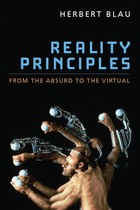 Reality Principles: From the Absurd to the Virtual
Herbert Blau
University of Michigan Press, 2011 “Herbert Blau’s long sustained inquiry into theater’s most provocative questions—presence, liveness, and finitude—are, at their deepest level, queries into life. Reality Principles returns us to Blau’s inspiring provocations and extends them to new subjects—9/11 and Ground Zero, the nature of charisma, Pirandello and Strindberg.”
—Peggy Phelan, Stanford University Reality Principles gathers recent essays by esteemed scholar and theater practitioner Herbert Blau covering a range of topics. The book’s provocative essays—including “The Emotional Memory of Directing,” “The Faith-Based Initiative of the Theater of the Absurd,” “Virtually Yours: Presence, Liveness, Lessness,” “The Human Nature of the Bot”—were given as keynotes and/or memorial lectures and are collected here for the first time. The essays take up a remarkable array of topics—from body art and the self-inflicted punishments of Stelarc, Orlan, and the Viennese Actionists, to Ground Zero and 9/11—and allow Blau to address critical questions of theater and theory, performance and relevance, the absurd and the virtual, history and illusion, community and memory. Reality Principles offers a panoramic view of Herbert Blau’s perspectives on life and the imitation of life on stage.
 Reality Squared: Televisual Discourse on the Real
Friedman, James
Rutgers University Press, 2002 “Reality Squared develops the scholarly discussion of the aesthetic of realism, documentary conventions, and modes of television broadcasting, in sophisticated new directions. Friedman’s historical perspective is especially valuable since so much discussion of the new aesthetic of realism on television fails to take into account similar trends throughout television history.”—Ellen Seiter, professor of communication, University of California at San Diego
“Reality Squared offers a rich variety of insights into the way television and new media make us believe in the worlds they represent. Spanning across the decades of early live TV to contemporary digital culture, this volume is an important history, not only of media but alsoof our perception of reality itself.”—Lynn Spigel, University of Southern California and author of Welcome to the Dreamhouse Through the 1980s and 1990s, the television industry and its critics have identified and promoted the re-emergence of “reality-based” television. During the past two decades, this type of programming has come to play a major role in both production decisions and network strategy. At the beginning of the twenty-first century, viewers’ desire for “reality TV” shows no signs of diminishing, as evidenced by the meteoric rise of shows such as Who Wants to be a Millionaire, Survivor, and MTV’s Real World. Although debates concerning the relationship between representational media and reality have occupied scholars and artists for quite some time, a surprisingly small number of books have examined this subject. As the title suggests, Reality Squared examines the representation of reality within the squared televisual viewing frame, as well as the exponential growth of these representational programs on broadcast, cable TV, and even beyond, to the worldwide web. The contributors approach the issues surrounding television and reality from a wide range of theoretical and methodological perspectives. Topics include: the internet, the impact of global news events, weather predictions on the Weather Channel, and the representation of criminality on America’s Most Wanted. This diverse volume contributes to the ongoing conversation about reality and representation, history and fiction, text and context, and the “inside” and “outside” of that box we call television.
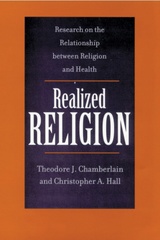 Realized Religion: Research on the Relationship between Religion and Health
Theodore J. Chamberlain
Templeton Press, 2001 Realized Religion includes research that investigates the impact of spirituality in health and healing, faith healing, religion and mental health, religion and life satisfaction, religion and mental disorders, religion and martial satisfaction, the effect of religion on suicide, and the effect of religion on alcohol use and abuse. This book documents over 300 scientific studies published by reputable scientific journals demonstrating that religion has an ameliorating effect on the survival rate of surgical patients, on depression and anxiety, on suicide rates, and on promotion of a healthy lifestyle. Realized Religion presents useful and helpful information to researchers and scholars who seek to understand the subtle connection between healing and spirituality. It will be an invaluable resource for libraries and others interested in the emerging field of spirituality and healing.
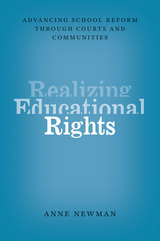 Realizing Educational Rights: Advancing School Reform through Courts and Communities
Anne Newman
University of Chicago Press, 2013 In Realizing Educational Rights, Anne Newman examines two educational rights questions that arise at the intersection of political theory, educational policy, and law: What is the place of a right to education in a participatory democracy, and how can we realize this right in the United States? Tracking these questions across both philosophical and pragmatic terrain, she addresses urgent moral and political questions, offering a rare, double-pronged look at educational justice in a democratic society.
Newman argues that an adequate K–12 education is the right of all citizens, as a matter of equality, and emphasizes that this right must be shielded from the sway of partisan and majoritarian policy making far more than it currently is. She then examines how educational rights are realized in our current democratic structure, offering two case studies of leading types of rights-based activism: school finance litigation on the state level and the mobilization of citizens through community-based organizations. Bringing these case studies together with rich philosophical analysis, Realizing Educational Rights advances understanding of the relationships among moral and legal rights, education reform, and democratic politics.
 Realizing Equality in Policy
Edited by Alexander Kaufman
University of Michigan Press, 2025 Economic and social inequality have become defining features of the world economy in the late twentieth and early twenty-first centuries. While increased inequality has been particularly pronounced in the United States, a similar phenomenon of increasing inequality of incomes and wealth has emerged in the economies of most major western European states. Realizing Equality in Policy brings together leading scholars to address current issues relating to rising inequality as it affects policy in the areas of education, health care, anti-poverty, employment, and economic policy.
With contributions from scholars of both luck and relational egalitarianism, the essays reexamine a number of basic assumptions regarding social and economic policy from an egalitarian perspective. They explore gender-based discrimination, international justice, and the possibility for engagement between socialist and left-liberal thought. Rather than focusing on the subtle distinctions that divide egalitarian views, this volume shows that both views have the potential to offer important insights about how differences might be overcome and gaps might be closed. In offering new directions for solving wealth inequality through policy, Realizing Equality in Policy contributes to ongoing conversations in political theory, economic theory, and moral philosophy.
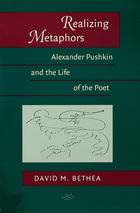 Realizing Metaphors: Alexander Pushkin and the Life of the Poet
David M. Bethea
University of Wisconsin Press, 1998 Readers often have regarded with curiosity the creative life of the poet. In this passionate and authoritative new study, David Bethea illustrates the relation between the art and life of nineteenth-century poet Alexander Pushkin, the central figure in Russian thought and culture. Bethea shows how Pushkin, on the eve of his two-hundredth birthday, still speaks to our time. He indicates how we as modern readers might "realize"— that is, not only grasp cognitively, but feel, experience—the promethean metaphors central to the poet's intensely "sculpted" life. The Pushkin who emerges from Bethea's portrait is one who, long unknown to English-language readers, closely resembles the original both psychologically and artistically.
Bethea begins by addressing the influential thinkers Freud, Bloom, Jakobson, and Lotman to show that their premises do not, by themselves, adequately account for Pushkin's psychology of creation or his version of the "life of the poet." He then proposes his own versatile model of reading, and goes on to sketches the tangled connections between Pushkin and his great compatriot, the eighteenth-century poet Gavrila Derzhavin. Pushkin simultaneously advanced toward and retreated from the shadow of his predecessor as he created notions of poet-in-history and inspiration new for his time and absolutely determinative for the tradition thereafter.
 Realizing Resilience: Toward a Fairer, Greener Future
Laurie Mazur
Island Press, 2025 How can we make our communities more resilient in the era of climate change and other large-scale disruptions? In 2015, Island Press set out to answer that question. With support from The Kresge Foundation, Island Press embarked on a deep dive into urban climate resilience to help inform the emerging field. It began with a review of the existing literature in various disciplines and a convening of an advisory committee of 40 activists, academics, and others at the vanguard of climate resilience.
The result of that work, Bounce Forward: Urban Resilience in the Era of Climate Change, defined resilience as “the capacity to anticipate, plan for, and mitigate the dangers—and seize the opportunities—associated with environmental and social change.” It emphasized the need to think critically about resilience, to ask what is being made resilient, to what changes or threats, and for whose benefit.
Much has happened in the decade since Bounce Forward was published. So, in 2024, The Kresge Foundation commissioned Island Press to produce an updated report. The goal was to revisit the framework developed in 2015, assess progress toward making that vision a reality, and—especially after the 2024 presidential election—consider prospects for advancing resilience in the current political climate. To that end, Island Press interviewed 30 individuals working on diverse aspects of resilience, including several who were consulted for the original report.
Realizing Resilience: Toward a Fairer, Greener Future finds that the original framework presented in Bounce Forward remains an aspirational guide to community resilience. The updated report documents progress, setbacks, and opportunities in several key areas—climate resilience, equity and climate, energy, climate and health, and cities and the built environment. It finds that the current moment poses unprecedented challenges as well as promising pathways to resilience. And perhaps most importantly, Realizing Resilience uncovers welcome glimmers of hope, even in these dark and uncertain times.
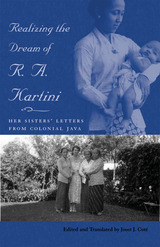 Realizing the Dream of R. A. Kartini: Her Sisters’ Letters from Colonial Java
Joost J. Coté
Ohio University Press, 2008 Realizing the Dream of R. A. Kartini: Her Sisters’ Letters from Colonial Java presents a unique collection of documents reflecting the lives, attitudes, and politics of four Javanese women in the early twentieth century. Joost J. Coté translates the correspondence between Raden Ajeng Kartini, Indonesia’s first feminist, and her sisters, revealing for the first time her sisters’ contributions in defining and carrying out her ideals. With this collection, Coté aims to situate Kartini’s sisters within the more famous Kartini narrative–and indirectly to situate Kartini herself within a broader narrative. The letters reveal the emotional lives of these modern women and their concerns for the welfare of their husbands and the success of their children in rapidly changing times. While by no means radical nationalists, and not yet extending their horizons to the possibility of an Indonesian nation, these members of a new middle class nevertheless confidently express their belief in their own national identity. Realizing the Dream of R. A. Kartini is essential reading for scholars of Indonesian history, providing documentary evidence of the culture of modern, urban Java in the late colonial era and an insight into the ferment of the Indonesian nationalist movement in which these women and their husbands played representative roles.
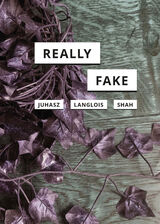 Really Fake
Alexandra Juhasz
University of Minnesota Press, 2020 More important than flagging things “really fake” is to understand why they are dismissed as fake
The new truth is the one that circulates: digital truth emerges from lists, databases, archives, and conditions of storage. Multiple truths may be activated through search, link, and retrieve queries. Alexandra Juhasz, Ganaele Langlois, and Nishant Shah respond by taking up story, poetry, and other human logics of care, intelligence, and dignity to explore sociotechnological and politico-aesthetic emergences in a world where information overload has become a new ontology of not-knowing. Their feminist digital methods allow considerations of internet things through alternative networked internet time: slowing down to see, honor, and engage with our past; invoking indeterminacy as a human capacity that lets multiple truths commingle on a page or in a body; and saving the truths of ourselves and our others differently from the corporate internet’s perpetual viral movement.
Writing across their own shared truisms, actors, and touchstones, the authors propose creative tactics, theoretical overtures, and experimental escape routes built to a human scale as ways to regain our capacities to know and tell truths about ourselves.
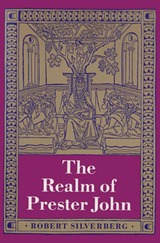 The Realm Of Prester John
Robert Silverberg
Ohio University Press, 1996 In this modern account of the genesis of a great medieval myth, celebrated science fiction author Robert Silverberg’s explores the mysterious origins of Prester John, the astonishing Christian potentate of the East. Prester John was a legendary figure who cast a powerful spell over Latin Christendom for almost five centuries. Rumors of the warrior-king-prelate’s fabulous realms first reached Europe in the eleventh century and quickly assumed an exalted status alongside such fabled wonders as El Dorado, The Fountain of Youth, and the Holy Grail. The defeat of a Moslem Turkish tribe by a Buddhist Chinese warlord seems to have been the unlikely historical nugget around which the Prester John myth grew, but contributions to this strange saga have also been traced all around the globe to the Apostle Thomas' apocryphal preaching in India, to the actual existence of small colonies of Nestorian schismatics in central Asia, and even to Genghis Khan.
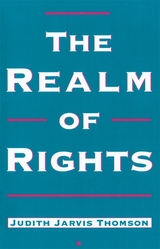 The Realm of Rights
Judith Jarvis Thomson
Harvard University Press, 1990 The concept of a right is fundamental to moral, political, and legal thinking, but much of the use of that concept is selective and fragmentary: it is common merely to appeal to this or that intuitively plausible attribution of rights as needed for purposes of argument. In The Realm of Rights Judith Thomson provides a full-scale, systematic theory of human and social rights, bringing out what in general makes an attribution of a right true.
Thomson says that the question what it is to have a right precedes the question which rights we have, and she therefore begins by asking why our having rights is a morally significant fact about us. She argues that a person’s having a right is reducible to a complex moral constraint: central to that constraint is that, other things being equal, the right ought to be accorded. Thomson asks what those other things are that may or may not be equal, and describes the tradeoffs that relieve us of the requirement to accord a right.
Our rights fall into two classes, those we have by virtue of being human beings and those we have by virtue of private interactions and law. Thomson argues that the first class includes rights that others not kill or harm us, but does not include rights that others meet our needs. The second class includes rights that issue from promises and consent, and Thomson shows how they are generated; she also argues that property rights issue only from a legitimate legal system, so that the second class includes them as well.
The Realm of Rights will take its place as a major effort to provide a stable foundation for our deeply held belief that we are not mere cogs in a communal machine, but are instead individuals whose private interests are entitled to respect.
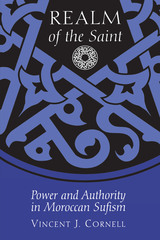 Realm of the Saint: Power and Authority in Moroccan Sufism
By Vincent J. Cornell
University of Texas Press, 1998 In premodern Moroccan Sufism, sainthood involved not only a closeness to the Divine presence (walaya) but also the exercise of worldly authority (wilaya). The Moroccan Jazuliyya Sufi order used the doctrine that the saint was a "substitute of the prophets" and personification of a universal "Muhammadan Reality" to justify nearly one hundred years of Sufi involvement in Moroccan political life, which led to the creation of the sharifian state. This book presents a systematic history of Moroccan Sufism through the fifteenth and sixteenth centuries C.E. and a comprehensive study of Moroccan Sufi doctrine, focusing on the concept of sainthood. Vincent J. Cornell engages in a sociohistorical analysis of Sufi institutions, a critical examination of hagiography as a source for history, a study of the Sufi model of sainthood in relation to social and political life, and a sociological analysis of more than three hundred biographies of saints. He concludes by identifying eight indigenous ideal types of saint that are linked to specific forms of authority. Taken together, they define sainthood as a socioreligious institution in Morocco.
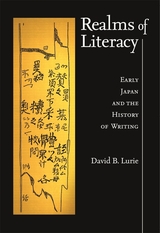 Realms of Literacy: Early Japan and the History of Writing
David B. Lurie
Harvard University Press, 2011 In the world history of writing, Japan presents an unusually detailed record of transition to literacy. Extant materials attest to the social, cultural, and political contexts and consequences of the advent of writing and reading, from the earliest appearance of imported artifacts with Chinese inscriptions in the first century BCE, through the production of texts within the Japanese archipelago in the fifth century, to the widespread literacies and the simultaneous rise of a full-fledged state in the late seventh and eighth centuries.
David B. Lurie explores the complex processes of adaptation and invention that defined the early Japanese transition from orality to textuality. Drawing on archaeological and archival sources varying in content, style, and medium, this book highlights the diverse modes and uses of writing that coexisted in a variety of configurations among different social groups. It offers new perspectives on the pragmatic contexts and varied natures of multiple simultaneous literacies, the relations between languages and systems of inscription, and the aesthetic dimensions of writing. Lurie’s investigation into the textual practices of early Japan illuminates not only the cultural history of East Asia but also the broader comparative history of writing and literacy in the ancient world.
 The Realms of Oblivion: An Excavation of the Davies Manor Historic Site's Omitted Stories
Andrew C. Ross
Vanderbilt University Press, 2024 Winner of the American Association for State and Local History’s Award of Excellence—Large-Press Publication, 2025
Winner of the Tennessee History Book Award (Tennessee Historical Society and Tennessee Historical Commission), 2024
The Realms of Oblivion explores the complexities involved in reconciling competing versions of history, channeled through Davies Manor, a historic site near Memphis that once centered a wealthy slave-owning family’s sprawling cotton plantation. Interrogating the forces of memorialization that often go unquestioned in the stories we believe about ourselves and our communities, this book simultaneously tells an informative and engrossing bottom-up history—of the Davies family, of the Black families they enslaved and exploited across generations, and of Memphis and Shelby County—while challenging readers to consider just what upholds the survival of that history into the present day.
Written in an engaging and critical style, The Realms of Oblivion is grounded in a rich source base, ranging from nineteenth-century legal records to the personal papers of the Davies family to twentieth-century African American oral histories. Author Andrew C. Ross uses these sources to unearth the stark contrast between the version of Davies Manor’s history that was built out of nostalgia, and the version that records have proven to actually be true. As a result, Ross illuminates the ongoing need for a deep and honest reckoning with the history of the South and of the United States, on the part of both individuals and community institutions such as local historic sites and small museums.
 The Reaper’s Garden: Death and Power in the World of Atlantic Slavery
Vincent Brown
Harvard University Press, 2010 Winner of the Merle Curti Award
Winner of the James A. Rawley Prize
Winner of the Louis Gottschalk Prize
Longlisted for the Cundill Prize
“Vincent Brown makes the dead talk. With his deep learning and powerful historical imagination, he calls upon the departed to explain the living. The Reaper’s Garden stretches the historical canvas and forces readers to think afresh. It is a major contribution to the history of Atlantic slavery.”—Ira Berlin
From the author of Tacky’s Revolt, a landmark study of life and death in colonial Jamaica at the zenith of the British slave empire.
What did people make of death in the world of Atlantic slavery? In The Reaper’s Garden, Vincent Brown asks this question about Jamaica, the staggeringly profitable hub of the British Empire in America—and a human catastrophe. Popularly known as the grave of the Europeans, it was just as deadly for Africans and their descendants. Yet among the survivors, the dead remained both a vital presence and a social force.
In this compelling and evocative story of a world in flux, Brown shows that death was as generative as it was destructive. From the eighteenth-century zenith of British colonial slavery to its demise in the 1830s, the Grim Reaper cultivated essential aspects of social life in Jamaica—belonging and status, dreams for the future, and commemorations of the past. Surveying a haunted landscape, Brown unfolds the letters of anxious colonists; listens in on wakes, eulogies, and solemn incantations; peers into crypts and coffins, and finds the very spirit of human struggle in slavery. Masters and enslaved, fortune seekers and spiritual healers, rebels and rulers, all summoned the dead to further their desires and ambitions. In this turbulent transatlantic world, Brown argues, “mortuary politics” played a consequential role in determining the course of history.
Insightful and powerfully affecting, The Reaper’s Garden promises to enrich our understanding of the ways that death shaped political life in the world of Atlantic slavery and beyond.
 Reaping the Whirlwind: Liberal Democracy and the Religious Axis
John R. Pottenger
Georgetown University Press, 2007 As early as the sixteenth century the liberal democratic state has been forced to confront the question of religion in politics. The result has been a tense and uncomfortable balancing act. Today, in the public square of liberal democracy, a number of religious confessions and beliefs compete for attention. In the American experience, some sense of religious pluralism and relative social harmony has been maintained. However, for this relationship to prevail, a tension must continue to exist—one that balances the political and social pursuits of self-interest with meeting the objectives of the common good. In Reaping the Whirlwind, John R. Pottenger shows how this process began in the modern world, and how societies attempt to manage this ongoing conflict. The first part of the book lays the groundwork of his analysis by using examples from history to demonstrate the genesis of political and religious "whirlwinds." It goes on to explore contemporary case studies, such as conflicts between Mormons and Evangelicals in the United States, liberation theology in Latin America, Islam and the state in Uzbekistan, and radical Christian reconstructionism. Pottenger believes that the formal institutions of liberal democracy should maintain this turbulence, even as religious activism threatens to upset the balance. He concludes by advocating religious liberty and recognizing the individual and social need for expression. At the same time, he maintains that the survival of liberal democracy requires that these religious traditions not dominate the public sphere.
 Reaping the Wind: How Mechanical Wizards, Visionaries, and Profiteers Helped Shape Our Energy Future
Peter Asmus
Island Press, 2000 From the solitary windmill standing sentry over a rural homestead to the sleek machinery of a modern wind farm, windmills are a powerful symbol of self-reliance and human ingenuity. Once the province of backyard tinkerers and eccentric inventors, they have over the past two decades entered the mainstream to be embraced by environmentalists, venture capitalists, and policymakers alike. But reaching that point wasn't easy.In Reaping the Wind, journalist Peter Asmus tells the fascinating and convoluted history of commercial wind power in the United States. He introduces readers to maverick scientists and technologists who labored in obscurity, to entrepreneurs and visionary capitalists who believed that a centuries-old idea could be made feasible in the modern world, and to enterprising financial advisers and investors who sought to exploit the last great tax shelter in federal history. Beginning with the early pioneers, from William Heronemus, a former U.S. Navy captain who dreamt of huge floating wind farms off the coast of New England, to the $40 million success story of Jim Dehlsen of Zond, he offers an animated narrative that profiles the colorful cast of characters involved with the development of the American wind power industry.Reaping the Wind is both engaging and instructive, with information about the technologies and policies that drive the industry and give it promise interwoven with the human story of the struggle to develop -- against great odds -- reliable, clean energy from a source as unpredictable and seemingly uncontrollable as the wind. Anyone interested in renewable energy or the human and political drama behind the development of new technologies will find the book an engrossing and enlightening read.
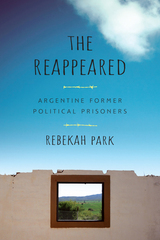 The Reappeared: Argentine Former Political Prisoners
Park, Rebekah
Rutgers University Press, 2014 Between 1976 and 1983, during a period of brutal military dictatorship, armed forces in Argentina abducted 30,000 citizens. These victims were tortured and killed, never to be seen again. Although the history of los desaparecidos, “the disappeared,” has become widely known, the stories of the Argentines who miraculously survived their imprisonment and torture are not well understood. The Reappeared is the first in-depth study of an officially sanctioned group of Argentine former political prisoners, the Association of Former Political Prisoners of Córdoba, which organized in 2007. Using ethnographic methods, anthropologist Rebekah Park explains the experiences of these survivors of state terrorism and in the process raises challenging questions about how societies define victimhood, what should count as a human rights abuse, and what purpose memorial museums actually serve. The men and women who reappeared were often ostracized by those who thought they must have been collaborators to have survived imprisonment, but their actual stories are much more complex. Park explains why the political prisoners waited nearly three decades before forming their own organization and offers rare insights into what motivates them to recall their memories of solidarity and resistance during the dictatorial past, even as they suffer from the long-term effects of torture and imprisonment.
The Reappeared challenges readers to rethink the judicial and legislative aftermath of genocide and forces them to consider how much reparation is actually needed to compensate for unimaginable—and lifelong—suffering.
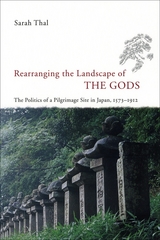 Rearranging the Landscape of the Gods: The Politics of a Pilgrimage Site in Japan, 1573-1912
Sarah Thal
University of Chicago Press, 2005 When people create new societies, economies, and nations—both now and in the past—they create gods, rituals, and miracles to support them. Even what seem to be some of the most timeless and sacred sites in the world have been shaped, reshaped, and reinterpreted by countless people to produce oases of peace and nature today.
Using miracle tales, votive plaques, diaries, and newspapers, Sarah Thal traces such changes at one of the most popular Japanese pilgrimage sites of the nineteenth and twentieth centuries: the shrine of Konpira on the island of Shikoku. This rich and fascinating history explores how people from all walks of life gave shape to the gods, shrines, and rituals so often attributed to ancient, indigenous Japan. Thal shows how worshippers and priests, rulers and entrepreneurs, repeatedly rebuilt and reinterpreted Konpira to reflect their needs and aspirations in a changing world—and how, in doing so, they helped shape the structures of the modern state, economy, and society in turn.
Rearranging the Landscape of the Gods will be welcomed by all scholars of Japanese history and by students of religion interested in the construction of modernity.
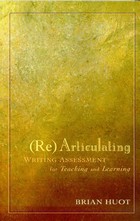 Rearticulating Writing Assessment for Teaching and Learning
Brian Huot
Utah State University Press, 2002 Brian Huot's aim for this book is both ambitious and provocative. He wants to reorient composition studies' view of writing assessment. To accomplish this, he not only has to inspire the field to perceive assessment--generally not the most appreciated area of study--as deeply significant to theory and pedagogy, he also has to counter some common misconceptions about the history of assessment in writing. In (Re)Articulating Writing Assessment, Huot advocates a new understanding, a more optimistic and productive one than we have seen in composition for a very long time. Assessment, as Huot points out, defines what is valued by a teacher or a society. What isn't valued isn't assessed; it tends to disappear from the curriculum. The dark side of this truth is what many teachers find troubling about large scale assessments, as standardized tests don't grant attention or merit to all they should. Instead, assessment has been used as an interested social mechanism for reinscribing current power relations and class systems.
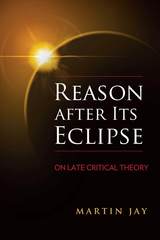 Reason after Its Eclipse: On Late Critical Theory
Martin Jay
University of Wisconsin Press, 2017 Martin Jay tackles a question as old as Plato and still pressing today: what is reason, and what roles does and should it have in human endeavor? Applying the tools of intellectual history, he examines the overlapping, but not fully compatible, meanings that have accrued to the term "reason" over two millennia, homing in on moments of crisis, critique, and defense of reason.
After surveying Western ideas of reason from the ancient Greeks through Kant, Hegel, and Marx, Jay engages at length with the ways leading theorists of the Frankfurt School—Horkheimer, Marcuse, Adorno, and most extensively Habermas—sought to salvage a viable concept of reason after its apparent eclipse. They despaired, in particular, over the decay in the modern world of reason into mere instrumental rationality. When reason becomes a technical tool of calculation separated from the values and norms central to daily life, then choices become grounded not in careful thought but in emotion and will—a mode of thinking embraced by fascist movements in the twentieth century.
Is there a more robust idea of reason that can be defended as at once a philosophical concept, a ground of critique, and a norm for human emancipation? Jay explores at length the ommunicative rationality advocated by Habermas and considers the range of arguments, both pro and con, that have greeted his work.
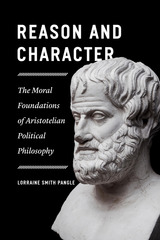 Reason and Character: The Moral Foundations of Aristotelian Political Philosophy
Lorraine Smith Pangle
University of Chicago Press, 2020 A close and selective commentary on Aristotle’s Nicomachean Ethics, offering a novel interpretation of Aristotle’s teachings on the relation between reason and moral virtue. What does it mean to live a good life or a happy life, and what part does reason play in the quest for fulfillment? Lorraine Smith Pangle shows how Aristotle’s arguments for virtue as the core of happiness and for reason as the guide to virtue emerge in response to Socrates’s paradoxical claim that virtue is knowledge and vice is ignorance. Against Socrates, Aristotle does justice to the effectual truth of moral responsibility—that our characters do indeed depend on our own voluntary actions. But he also incorporates Socratic insights into the close interconnection of passion and judgment and the way passions and bad habits work not to overcome knowledge that remains intact but to corrupt the knowledge one thinks one has. Reason and Character presents fresh interpretations of Aristotle’s teaching on the character of moral judgment and moral choice, on the way reason finds the mean—especially in justice—and on the relation between practical and theoretical wisdom.
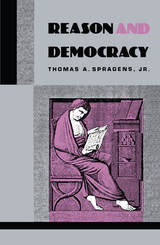 Reason and Democracy
Thomas A. Spragens Jr.
Duke University Press, 1990 Reason and Democracy breaks new ground in providing a plausible philosophical basis for the communitarian view of a healthy democracy as the rational pursuit of common purposes by free and equal citizens. Thomas A. Spragens Jr. argues that the most persistent paradigms of Western political rationality originated in classical philosophy, took their modern expression in the philosophies of Kant and Mill, and terminated in Max Weber’s pairing of purely technical rationality with arbitrary ends.
Drawing on recent work in the philosophy of science and the philosophy of language, combined with appropriate analogies in political thought and action, Spragens maintains that it is possible to discern the outlines of a philosophically cogent and morally beneficial concept of rational practice on the part of a political community. This possibility, he contends, provides a philosophical basis for liberal democratic politics that is superior to utilitarian and deontological accounts.
Reason and Evidence in Husserl's Phenomenology
David Michael Kleinberg-Levin
Northwestern University Press, 1970 In Reason and Evidence in Husserl's Phenomenology David Michael Kleinberg-Levin examines Husserl’s concept of necessary, a priori, and absolutely certain indubitable evidence, which he terms apodictic, and his related concept of complete evidence, which he terms adequate. To do so it explicates some of the more general relevant features of phenomenology as a whole.
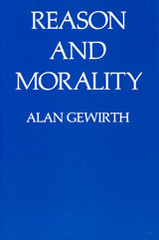 Reason and Morality
Alan Gewirth
University of Chicago Press, 1982 "Most modern philosophers attempt to solve the problem of morality from within the epistemological assumptions that define the dominant cultural perspective of our age. Alan Gewirth's Reason and Morality is a major work in this ongoing enterprise. Gewirth develops, with patience and skill, what he calls a 'modified naturalism' in which morality is derived by logic alone from the concept of action. . . . I think that the publication of Reason and Morality is a major event in the history of moral philosophy. It develops with great power a new and exciting position in ethical naturalism. No one, regardless of philosophical stance, can read this work without an enlargement of mind. It illuminates morality and agency for all."—E. M. Adams, The Review of Metaphysics
"This is a fascinating study of an apparently intractable problem. Gewirth has provided plenty of material for further discussion, and his theory deserves serious consideration. He is always aware of possible rejoinders and argues in a rigorous manner, showing a firm grasp of the current state of moral and political philosophy."—Mind
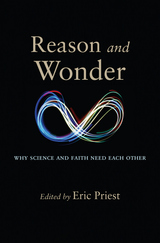 Reason and Wonder: Why Science and Faith Need Each Other
Eric Priest
Templeton Press, 2016
Often science and religion are seen as completely separate entities. Science exists in the realm of fact, whereas religion exists in the realm of faith. Conversations about genes, psychology, or even the meaning of life occur in silos. But as Eric Priest, Keith Ward, David Myers, N. T. Wright, and others show, these conversations are so much richer when both science and faith are incorporated.
This is exactly what Reason and Wonder does. Eric Priest has brought together twelve of the leading thinkers in science and theology to discuss everything from the origins of the universe to evolution and evil. At the heart of each essay is an understanding that the best science—and the best theology— are both undergirded by an appeal to reason as well as a deep sense of wonder.
Each of these great scientific and theological thinkers offers a chapter on their area of expertise, and the book closes with a stimulating set of questions for group discussion or personal reflection.
- Contributors and their topics include:
- Eric Priest: Towards an integration of science and religion
- Keith Ward: God, science and the New Atheism
- Eleonore Stump: Natural law, reductionism and the Creator
- David Wilkinson: The origin and end of the universe: A challenge for Christianity
- Jennifer Wiseman: Universe of wonder, universe of life
- Kenneth R. Miller: Evolution, faith and science
- Michael J. Murray and Jeff Schloss: Evolution and evil
- Pauline Rudd: Is there more to life than genes?
- David G. Myers: Psychological science meets Christian faith
- John Wyatt: Being a person: Towards an integration of neuroscientific and Christian perspectives
- John Swinton: From projection to connection: Conversations between science, spirituality and health
- Mark Harris: Do the miracles of Jesus contradict science?
- N. T. Wright: Can a scientist trust the New Testament?
Reason in Law: Eighth Edition
Lief H. Carter and Thomas F. Burke
University of Chicago Press, 2009 Over the years, Reason in Law has established itself as the leading textbook for courses in legal reasoning, a critical aspect of the rule of law. This eighth edition brings the book’s analyses and examples fully up to date, adding new cases while retaining old ones whose lessons remain potent. It takes full account of the dramatic changes--and challenges--to legal reasoning that emerged from the Bush administration’s attempts to fight terrorism and also explores recent conflicts over same-sex marriage, gun control, hate crimes, and climate change. The result is an indispensable introduction to an issue that lies at the heart of the workings of the law.
Reason in Law: Ninth Edition
Lief H. Carter and Thomas F. Burke
University of Chicago Press, 2016 Over the nearly four decades it has been in print, Reason in Law has established itself as the place to start for understanding legal reasoning, a critical component of the rule of law. This ninth edition brings the book’s analyses and examples up to date, adding new cases while retaining old ones whose lessons remain potent. It examines several recent controversial Supreme Court decisions, including rulings on the constitutionality and proper interpretation of the Affordable Care Act and Justice Scalia’s powerful dissent in Maryland v. King. Also new to this edition are cases on same-sex marriage, the Voting Rights Act, and the legalization of marijuana. A new appendix explains the historical evolution of legal reasoning and the rule of law in civic life. The result is an indispensable introduction to the workings of the law.
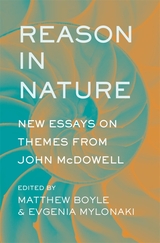 Reason in Nature: New Essays on Themes from John McDowell
Matthew Boyle
Harvard University Press, 2022 A group of distinguished philosophers reflect on John McDowell’s arguments for nonreductive naturalism, an approach that can explain what is special about human reason without implying that it is in any sense supernatural.
John McDowell is one of the English-speaking world’s most influential living philosophers, whose work has shaped debates in mind, language, metaphysics, epistemology, meta-ethics, and the history of philosophy. A common thread running through McDowell’s diverse contributions has been his critique of a form of reductive naturalism according to which human minds must be governed by laws essentially similar to those that govern the rest of nature. Against this widely accepted view, McDowell maintains that human minds should be seen as “transformed” by reason in such a way that the principles governing our minds, while not supernatural, are in an important sense sui generis.
Editors Matthew Boyle and Evgenia Mylonaki assemble a group of distinguished philosophers to clarify and criticize McDowell’s core position and explore its repercussions for contemporary debates about metaphysics and epistemology, perception, language, action, and value. The essays here scrutinize the core idea that human reason constitutes a second nature, emerging from humanity’s basic animal nature, and reflect on the underpinnings of McDowell’s claims in Aristotle, Kant, and Hegel. Many of the contributors extend McDowell’s views beyond his own articulations, elaborating the transformative role that reason plays in human experience.
In clarifying and expanding McDowell’s insights, Reason in Nature challenges contemporary orthodoxy, much as McDowell himself has. And, as this collection makes clear, McDowell’s unorthodox position is of enduring importance and has wide-ranging implications, still not fully appreciated, for ongoing philosophical debates.
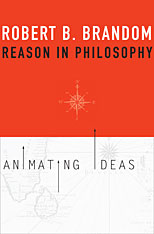 Reason in Philosophy: Animating Ideas
Robert B. Brandom
Harvard University Press, 2013 Transcendentalism never came to an end in America. It just went underground for a stretch, but is back in full force in Robert Brandom’s new book. Brandom takes up Kant and Hegel and explores their contemporary significance as if little time had expired since intellectuals gathered around Emerson in Concord to discuss reason and idealism, selves, freedom, and community. Brandom’s discussion belongs to a venerable tradition that distinguishes us as rational animals, and philosophy by its concern to understand, articulate, and explain the notion of reason that is thereby cast in that crucial demarcating role.
An emphasis on our capacity to reason, rather than merely to represent, has been growing in philosophy over the last thirty years, and Robert Brandom has been at the center of this development. Reason in Philosophy is the first book that gives a succinct overview of his understanding of the role of reason as the structure at once of our minds and our meanings—what constitutes us as free, responsible agents. The job of philosophy is to introduce concepts and develop expressive tools for expanding our self-consciousness as sapients: explicit awareness of our discursive activity of thinking and acting, in the sciences, politics, and the arts. This is a paradigmatic work of contemporary philosophy.
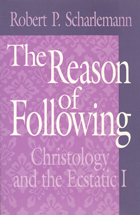 The Reason of Following: Christology and the Ecstatic I
Robert P. Scharlemann
University of Chicago Press, 1991 In the Reason of Following noted scholar Robert P. Scharlemann takes Christology in a radically new direction, suggesting that Christology itself represents a form of reason and an understanding of selfhood. For the first time, Scharlemann establishes a logical place for Christology in philosophical theology.
Scharlemann presents a christological phenomenology of the self, tracing the connections between the "I am" of the God who spoke to Moses, the "I am" of Christ, and the "I am" of autonomous self-identification. How, he asks, can the self that spontaneously responds to Jesus' "Follow me!" be compared with the everyday, autonomous self? What is the nature of "following" on the part of those who answer the summons of one whose name is "I am"? Pursuing these questions, Scharlemann develops a christological phenomenology of the self—an account in which following means not the expression of the self in action or reflection but rather self-discovery in another person.
With a deep sense of both culture and philosophy, Scharlemann distinguishes the forms of reason involved in "following" from those in ethics, aesthetics, and other modes of religious philosophic thought. His penetrating readings of nineteenth- and twentieth-century German theological and philosophical traditions provide an introduction to lesser-known thinkers such as Hermann and Picht as well as a profound critique of major figures such as Descartes, Heidegger, Fichte, and Kant.
Finally Scharlemann outlines a program for a more systematic and rounded presentation of what Christian doctrine might mean in the contemporary world. His work will be of interest to students of theology and philosophy alike.
A Reason Open to God
Pope Benedict XVI
Catholic University of America Press, 2013 With clarity and wisdom, Pope Benedict XVI sets out his vision for Catholic higher education in this first and only collection of his major addresses on the topic. What is the mission and identity of a Catholic university? What are the responsibilities of administrators, teachers, and students in Catholic institutes of higher learning? Where does the central theme of "love of God and others" fit into academia?
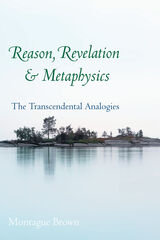 Reason, Revelation, and Metaphysics
Montague Brown
Catholic University of America Press, 2021 Any realist metaphysics must include an integrated account of the transcendentals and the analogy of being, for an adequate metaphysics must be about everything, and all things share in some key metaphysical characteristic—being, unity, truth, goodness, and beauty. However, they do not share in them in exactly the same way. Therefore, there is need to explain the transcendental characteristics in an analogical way. By using the phrase “transcendental analogies,” Reason, Revelation and Metaphysics claims that there are analogies of unity, truth, goodness, and beauty, which are related to, but irreducible to, the analogy of being. As this book is a systematic study of the topic, theoretical reason has primacy in the project and metaphysics is given pride of place. But reason is practical and aesthetic as well; that is, our consciences urge us to seek what is good, and we are delighted by what is beautiful. Although goodness and beauty are not reducible to truth, they must be included in any adequate metaphysical account, for metaphysics looks to explain everything.
Although metaphysics is traditionally thought to be a philosophical project involving ontology and natural theology, Montague Brown argues that an adequate metaphysics must ultimately be theological, including within its scope the truths of revelation. Philosophical reason’s examination of the transcendental analogies raises questions that it cannot answer. We experience a world of many beings, truths, goods, and beauties. Recognizing that these many instances have something in common, we affirm a transcendent instance of each (traditionally called God). However, although we know that a transcendent instance exists, we do not know its nature: therefore, we cannot say how it is related to the other instances. If we try to apply this transcendent instance as the prime analogate to shed light on the other analogates, we must fail, for the abstractness and universality of the transcendent instance can add nothing to our understanding of the particular instances. Wanting to know how the many exist and are related, philosophical reason finds no way forward and recognizes its need for help.
It is the thesis of this book that reason finds this help only in the revelation of the God’s covenantal relation with the world. The first principle of all things—most perfectly revealed in Jesus Christ, perfect God and perfect man—is really and freely related to us. Only by accepting this revealed prime analogate can the transcendental analogies bear fruit in our ongoing quest for understanding.
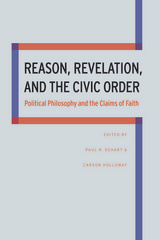 Reason, Revelation, and the Civic Order: Political Philosophy and the Claims of Faith
Paul R. DeHart
Northern Illinois University Press, 2014 While the dominant approaches to the current study of political philosophy are various, with some friendlier to religious belief than others, almost all place constraints on the philosophic and political role of revelation. Mainstream secular political theorists do not entirely disregard religion. But to the extent that they pay attention, their treatment of religious belief is seen more as a political or philosophic problem to be addressed rather than as a positive body of thought from which we might derive important insights about the nature of politics and the truth of the human condition.
In a one-of-a-kind collection, DeHart and Holloway bring together leading scholars from various fields, including political science, philosophy, and theology, to challenge the prevailing orthodoxy and to demonstrate the role that religion can and does play in political life. Contributing authors include such important thinkers as Peter Augustine Lawler, Robert C. Koons, J. Budziszewski, Francis J. Beckwith, and James Stoner.
 Reason, Tradition, and the Good: MacIntyre's Tradition-Constituted Reason and Frankfurt School Critical Theory
Jeffery L. Nicholas
University of Notre Dame Press, 2012
In Reason, Tradition, and the Good, Jeffery L. Nicholas addresses the failure of reason in modernity to bring about a just society, a society in which people can attain fulfillment. Developing the critical theory of the Frankfurt School, Nicholas argues that we rely too heavily on a conception of rationality that is divorced from tradition and, therefore, incapable of judging ends. Without the ability to judge ends, we cannot engage in debate about the good life or the proper goods that we as individuals and as a society should pursue.
Nicholas claims that the project of enlightenment—defined as the promotion of autonomous reason—failed because it was based on a deformed notion of reason as mere rationality, and that a critical theory of society aimed at human emancipation must turn to substantive reason, a reason constituted by and constitutive of tradition. To find a reason capable of judging ends, Nicholas suggests, we must turn to Alasdair MacIntyre’s Thomistic-Aristotelianism. Substantive reason comprises thinking and acting on the set of standards and beliefs within a particular tradition. It is the impossibility of enlightenment rationality to evaluate ends and the possibility of substantive reason to evaluate ends that makes the one unsuitable and the other suitable for a critical theory of society. Nicholas’s compelling argument, written in accessible language, remains committed to the promise of reason to help individuals achieve a good and just society and a good life. This requires, however, a complete revolution in the way we approach social life.
“Jeffery Nicholas has written an important and valuable book that invites its readers to discover the difficulties of late modern Western thought from the perspective of twentieth-century critical theory, and to consider a response to those difficulties drawn from the work of Alasdair MacIntyre and Charles Taylor.” —Christopher Stephen Lutz, Saint Meinrad Seminary and School of Theology
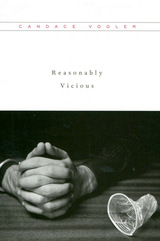 Reasonably Vicious
Candace Vogler
Harvard University Press, 2002 Is unethical conduct necessarily irrational? Answering this question requires giving an account of practical reason, of practical good, and of the source or point of wrongdoing. By the time most contemporary philosophers have done the first two, they have lost sight of the third, chalking up bad action to rashness, weakness of will, or ignorance. In this book, Candace Vogler does all three, taking as her guides scholars who contemplated why some people perform evil deeds. In doing so, she sets out to at once engage and redirect contemporary debates about ethics, practical reason, and normativity.
Staged as a limited defense of a standard view of practical reason (an ancestor of contemporary instrumentalist views), Vogler's essay develops Aquinas's remark about three ways an action might be desirable into an exhaustive system for categorizing reasons for acting. Drawing on Elizabeth Anscombe's pioneering work on intention, Vogler argues that one sort (means/end or calculative reasons for acting) sets the terms for all sound work on practical rationality.
She takes up Aquinas's work on evil throughout, arguing that he provides us with a systematic theory of immorality that takes seriously the goods at issue in wrongdoing and the reasons for unethical conduct. Vogler argues that, shorn of its theological context, this theory leaves us with no systematic, uncontroversial way of arguing that wrongdoing is necessarily contrary to reason.
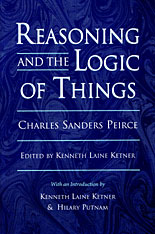 Reasoning and the Logic of Things: The Cambridge Conferences Lectures of 1898
Charles Sanders Peirce
Harvard University Press, 1992 Charles Sanders Peirce (1839–1914) was an American philosopher, physicist, mathematician, and the founder of pragmatism. Despite his importance in the history of philosophy, a unified statement of his thought has been unavailable. With this publication, readers at long last are offered the philosopher’s only known, complete, and coherent account of his own work. Originally delivered as the Cambridge Conferences Lectures of 1898, Reasoning and the Logic of Things is the most accessible and thorough introduction to Peirce’s mature thought to be found within the compass of a single book.
Beginning with an explanation of the nature of philosophy, Peirce proceeds to illustrate his claim that mathematics provides the foundation of our logic and metaphysics. We find here the clearest formulation of an idea present in Peirce’s thought since the 1860s, the distinction between three kinds of reasoning: induction, deduction, and retroduction. Then follows an introduction to Peirce’s chief logical doctrines, as well as his attempts to provide a classification of the sciences, a theory of categories, and a theory of science. In conclusion, turning from “reasoning” to the “logic of things,” Peirce called for an evolutionary cosmology to explain the reality of laws and described the kinds of reasoning he employed in developing this cosmology.
At the urging of his friend William James, Peirce made an uncharacteristic effort in these lectures to present his ideas in terms intelligible to a general audience—those without advanced training in logic and philosophy. The introductory materials by Kenneth Ketner and Hilary Putman add to the volume’s lucidity. Consequently, this book will be a valuable source for readers outside of the circle of Peirce specialists.
 Reasoning from Race: Feminism, Law, and the Civil Rights Revolution
Serena Mayeri
Harvard University Press, 2011 Informed in 1944 that she was “not of the sex” entitled to be admitted to Harvard Law School, African American activist Pauli Murray confronted the injustice she called “Jane Crow.” In the 1960s and 1970s, the analogies between sex and race discrimination pioneered by Murray became potent weapons in the battle for women’s rights, as feminists borrowed rhetoric and legal arguments from the civil rights movement. Serena Mayeri’s Reasoning from Race is the first book to explore the development and consequences of this key feminist strategy.
Mayeri uncovers the history of an often misunderstood connection at the heart of American antidiscrimination law. Her study details how a tumultuous political and legal climate transformed the links between race and sex equality, civil rights and feminism. Battles over employment discrimination, school segregation, reproductive freedom, affirmative action, and constitutional change reveal the promise and peril of reasoning from race—and offer a vivid picture of Pauli Murray, Ruth Bader Ginsburg, and others who defined feminists’ agenda.
Looking beneath the surface of Supreme Court opinions to the deliberations of feminist advocates, their opponents, and the legal decision makers who heard—or chose not to hear—their claims, Reasoning from Race showcases previously hidden struggles that continue to shape the scope and meaning of equality under the law.
Reasoning, Rationality and Probability
Edited by Maria Carla Galavotti, Roberto Scazzieri, and Patrick Suppes
CSLI, 2008 This volume broadens our concept of reasoning and rationality to allow for a more pluralistic and situational view of human thinking as a practical activity. Drawing on contributors across disciplines including philosophy, economics, psychology, statistics, computer science, engineering, and physics, Reasoning, Rationality, and Probability argues that the search for strong theories should leave room for the construction of context-sensitive conceptual tools. Both science and everyday life, the authors argue, are too complex and multifaceted to be forced into ready-made schemata.
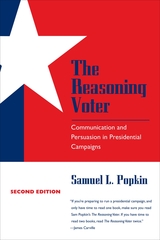 The Reasoning Voter: Communication and Persuasion in Presidential Campaigns
Samuel L. Popkin
University of Chicago Press, 1991 The Reasoning Voter is an insider's look at campaigns, candidates, media, and voters that convincingly argues that voters make informed logical choices. Samuel L. Popkin analyzes three primary campaigns—Carter in 1976; Bush and Reagan in 1980; and Hart, Mondale, and Jackson in 1984—to arrive at a new model of the way voters sort through commercials and sound bites to choose a candidate. Drawing on insights from economics and cognitive psychology, he convincingly demonstrates that, as trivial as campaigns often appear, they provide voters with a surprising amount of information on a candidate's views and skills. For all their shortcomings, campaigns do matter.
"Professor Popkin has brought V.O. Key's contention that voters are rational into the media age. This book is a useful rebuttal to the cynical view that politics is a wholly contrived business, in which unscrupulous operatives manipulate the emotions of distrustful but gullible citizens. The reality, he shows, is both more complex and more hopeful than that."—David S. Broder, The Washington Post
Reasoning with the Infinite: From the Closed World to the Mathematical Universe
Michel Blay
University of Chicago Press, 1999 Until the Scientific Revolution, the nature and motions of heavenly objects were mysterious and unpredictable. The Scientific Revolution was revolutionary in part because it saw the advent of many mathematical tools—chief among them the calculus—that natural philosophers could use to explain and predict these cosmic motions. Michel Blay traces the origins of this mathematization of the world, from Galileo to Newton and Laplace, and considers the profound philosophical consequences of submitting the infinite to rational analysis.
"One of Michael Blay's many fine achievements in Reasoning with the Infinite is to make us realize how velocity, and later instantaneous velocity, came to play a vital part in the development of a rigorous mathematical science of motion."—Margaret Wertheim, New Scientist
 Reasons and Feelings: Writing for the Humanities Now
Sarah Mesle
University of Chicago Press, 2025 This book of practical writing and publishing advice celebrates the creative, community-building pleasures of humanist expertise.
Humanities experts today are embattled. In a world of crises undermining higher education at every turn, what can still motivate humanists to write? Galvanizing, imaginative, and unrepentantly nerdy, Sarah Mesle’s Reasons and Feeling offers practical writing and publishing advice alongside a forcefully affirmative account of why humanities writing matters.
Mesle proposes that writing can help envision sustainable community, but only when we recognize that humanist authority comes from both our reasons and our feelings. Alongside everyday compositional advice—including strategies for addressing different audiences, pitching publications, and managing writing anxiety—readers will find an account of how such craft practices connect to both their intellectual commitments and their historical conditions. Mesle shows how university-trained writers at all levels benefit from embracing a broader range of styles and affects. Doing so helps them harness their writing’s community-building potential and makes them better able to value their own expertise, whether they write for the classroom, in public venues, or for the specialized scholarly communities that share their niche, weird, or beloved, objects of study.
Reasons and Feelings draws on Mesle’s expertise as a professor of writing and her work as an editor helping academics shift between writing for scholarly venues and journalistic ones. In a voice that’s honest, warm, accessible, and bracingly funny, Reasons and Feelings gives humanists a path toward bolder fantasies of the worlds their writing can make.
 Reason's Muse: Sexual Difference and the Birth of Democracy
Geneviève Fraisse
University of Chicago Press, 1994 The French Revolution proclaimed the equality of all human beings, yet women remained less than equal in the new society. The exclusion of women at the birth of modern democracy required considerable justification, and by tracing the course of this reasoning through early nineteenth-century texts, Genevieve Fraisse maps a moment of crisis in the history of sexual difference.
Through an analysis of literary, religious, legal, philosophical, and medical texts, Fraisse links a range of positions on women's proper role in society to specific historical and rhetorical circumstances. She shows how the Revolution marked a sharp break in the way women were represented in language, as traditional bantering about the "war of the sexes" gave way to serious discussions of the political and social meanings of sexual difference. Following this discussion on three different planes—the economical, the political, and the biological—Fraisse looks at the exclusion of women against the backdrop of democracy's inevitable lie: the affirmation of an equality so abstract it was impossible to concretely apply.
This study of the place of sexual equality in the founding moment of democracy offers insight into a persistent question: whether female emancipation is to be found through the achievement of equality with men or in the celebration of female difference.
 Reasons of Conscience: The Bioethics Debate in Germany
Stefan Sperling
University of Chicago Press, 2013 The implicit questions that inevitably underlie German bioethics are the same ones that have pervaded all of German public life for decades: How could the Holocaust have happened? And how can Germans make sure that it will never happen again? In Reasons of Conscience, Stefan Sperling considers the bioethical debates surrounding embryonic stem cell research in Germany at the turn of the twenty-first century, highlighting how the country’s ongoing struggle to come to terms with its past informs the decisions it makes today. Sperling brings the reader unmatched access to the offices of the German parliament to convey the role that morality and ethics play in contemporary Germany. He describes the separate and interactive workings of the two bodies assigned to shape German bioethics—the parliamentary Enquiry Commission on Law and Ethics in Modern Medicine and the executive branch’s National Ethics Council—tracing each institution’s genesis, projected image, and operations, and revealing that the content of bioethics cannot be separated from the workings of these institutions. Sperling then focuses his discussion around three core categories—transparency, conscience, and Germany itself—arguing that without fully considering these, we fail to understand German bioethics. He concludes with an assessment of German legislators and regulators’ attempts to incorporate criteria of ethical research into the German Stem Cell Law.
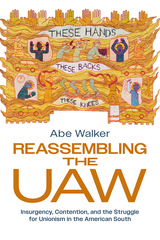 Reassembling the UAW: Insurgency, Contention, and the Struggle for Unionism in the American South
Abe Walker
Temple University Press, 2026 When Volkswagen’s Chattanooga Assembly Plant opened in 2012, the United Auto Workers were excited by the golden opportunity to organize in the anti-union South, where their efforts had been routinely thwarted. However, it took ten years and several attempts before the UAW was successful in unionizing the plant. Reassembling the UAW explains why.
Abe Walker chronicles the organizing campaign from its origin in 2014 to the union’s breakthrough victory in 2024, illustrating what went wrong—and what went right—along the way. Walker provides a systematic analysis of the strategic challenges and tactical shifts, showing the patterns that persisted across three election cycles while highlighting their differences, from global-level alliances to local labor issues.
Reassembling the UAW also demonstrates how rebel rank-and-file workers ousted the old-guard leadership and transformed the UAW into a militant union to achieve results. Ultimately, Walker offers valuable lessons for organizational strategy, the power of collective action, and the future of the labor movement.
 Reassessing Communism: Concepts, Culture, and Society in Poland 1944–1989
Katarzyna Chmielewska
Central European University Press, 2021 The thirteen authors of this collective work undertook to articulate matter-of-fact critiques of the dominant narrative about communism in Poland while offering new analyses of the concept, and also examining the manifestations of anticommunism. Approaching communist ideas and practices, programs and their implementations, as an inseparable whole, they examine the issues of emancipation, upward social mobility, and changes in the cultural canon. The authors refuse to treat communism in Poland in simplistic categories of totalitarianism, absolute evil and Soviet colonization, and similarly refuse to equate communism and fascism. Nor do they adopt the neoliberal view of communism as a project doomed to failure. While wholly exempt from nostalgia, these essays show that beyond oppression and bad governance, communism was also a regime in which people pursued a variety of goals and sincerely attempted to build a better world for themselves. The book is interdisciplinary and applies the tools of social history, intellectual history, political philosophy, anthropology, literature, cultural studies, and gender studies to provide a nuanced view of the communist regimes in east-central Europe.
Reassessing Epistemic Images in the Early Modern World
Ruth Noyes
Amsterdam University Press, 2023 This edited collection of papers explores from an interdisciplinary perspective the role of images and objects in early modern knowledge-making practices with an emphasis on mapping methodological approaches against printed pictures and things. The volume brings together work across diverse printed images, objects, and materials produced c. 1500-1700, as well as well as works in the ambit of early modern print culture, to reframe a comparative history of the rise of the ‘epistemic imprint’ as a new visual genre at the onset of the scientific revolution. The book includes contributions from the perspective of international scholars and museum professionals drawing on methodologies from a range of fields.
Reassessing Reform
Christopher M. Bellitto
Catholic University of America Press, 2012 Now, in celebration of the fiftieth anniversaries of the publication of The Idea of Reform and the Second Vatican Council, Reassessing Reform explores and critiques the enduring significance of Ladner's study, surveying new avenues and insights of more recent reform scholarship, especially concerning the long Middle Ages.
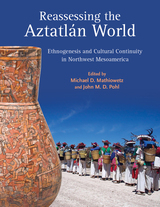 Reassessing the Aztatlán World: Ethnogenesis and Cultural Continuity in Northwest Mesoamerica
Edited by Michael D. Mathiowetz and John M. D. Pohl
University of Utah Press, 2024 The Aztatlán tradition of northwest Mesoamerica (AD 850/900–1350+) is one of the most understudied and enigmatic cultural developments in the Americas. This volume presents a spectrum of interdisciplinary research into Aztatlán societies, combining innovative archaeological methods with historical and ethnographic investigations. The results offer significant revelations about west Mexico’s critical role in over a millennium of cultural interaction between Indigenous societies in northwest and northeast Mexico, the Greater U.S. Southwest, Mesoamerica, lower Central America, and beyond.
Volume contributors show how those responsible for the Aztatlán tradition were direct ancestors of diverse Indigenous peoples such as the Náayeri (Cora), Wixárika (Huichol), O’dam (Tepehuan), Caz’ Ahmo (Caxcan), Yoeme (Yaqui), Yoreme (Mayo), and others who continue to reside across the former Aztatlán region and its frontiers. The prosperity of the Aztatlán tradition was achieved through long-distance networks that fostered the development of new ritual economies and integrated peoples in Greater Mesoamerica with those in the U.S. Southwest/Mexican Northwest.
Re-Assessing the Global Turn in Medieval Art History
Christina Normore
Arc Humanities Press, 2018 The growth in debates concerning the concept of 'the global' in medieval art history, and the more complex picture of Eurasian and African societies and material culture that has emerged in the past two decades has highlighted challenges to traditional art historical narratives, specializations, and scholarly training. And while these problems affect Byzantine, Islamic, Western medieval, and East Asian art history, there has been little conversation among scholars in these fields. A cutting-edge work on global medieval art, this volume offers a starting point for conversations among scholars working on multiple cultural regions.
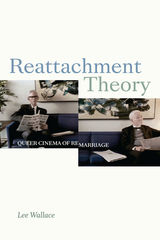 Reattachment Theory: Queer Cinema of Remarriage
Lee Wallace
Duke University Press, 2020 In Reattachment Theory Lee Wallace argues that homosexuality—far from being the threat to “traditional” marriage that same-sex marriage opponents have asserted—is so integral to its reimagining that all marriage is gay marriage. Drawing on the history of marriage, Stanley Cavell's analysis of Hollywood comedies of remarriage, and readings of recent gay and lesbian films, Wallace shows that queer experiments in domesticity have reshaped the affective and erotic horizons of heterosexual marriage and its defining principles: fidelity, exclusivity, and endurance. Wallace analyzes a series of films—Dorothy Arzner's Craig's Wife (1936); Tom Ford's A Single Man (2009); Lisa Cholodenko's High Art (1998), Laurel Canyon (2002), and The Kids Are All Right (2010); and Andrew Haigh's Weekend (2011) and 45 Years (2015)—that, she contends, do not simply reflect social and legal changes; they fundamentally alter our sense of what sexual attachment involves as both a social and a romantic form.
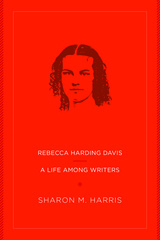 Rebecca Harding Davis: A Life Among Writers
Sharon M. Harris
West Virginia University Press, 2019 2018 Choice Outstanding Academic Title Rebecca Harding Davis is best known for her gritty short story “Life in the Iron-Mills,” set in her native Wheeling, West Virginia. Far less is known of her later career among elite social circles in Philadelphia, New York, and Europe, or her relationships with American presidents and leading international figures in the worlds of literature and the stage. In the first book-length biography of Davis, Sharon M. Harris traces the extraordinary life of this pioneering realist and recovers her status as one of America’s notable women journalists. Harris also examines Rebecca’s role as the leading member of the Davis family, a unique and nationally recognized family of writers that shaped the changing culture of later nineteenth-century literature and journalism.
This accessible treatment of Davis’s life, based on deep research in archival sources, provides new perspective on topics ranging from sectional tensions in the border South to the gendered world of nineteenth-century publishing. It promises to be the authoritative treatment of an important figure in the literary history of West Virginia and the wider world.
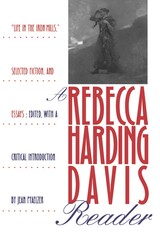 A Rebecca Harding Davis Reader: “Life in the Iron Mills,” Selected Fiction, and Essays
Jean Pfaelzer
University of Pittsburgh Press, 1995
Rebecca Harding Davis was a prolific writer who published chiefly in popular periodicals over the latter half of the nineteenth century. In tales that combine realism with sentimentalism and in topical essays, Davis confronted a wide range of current issues—notably women’s problems—as one who knew the frustration caused by the genteel female’s helpless social position and barriers against women entering the working world. In an excellent critical introduction, Jean Pfaelzer integrates cultural, historical, and psychological approaches in penetrating readings of Davis’s work. She emphasizes how Davis’s fictional embrace of the commonplace was instrumental in the demise of American romanticism and in eroding the repressive cultural expectations for women.
In both fiction and nonfiction, Davis attacked contemporary questions such as slavery, prostitution, divorce, the Spanish-American War, the colonization of Africa, the plight of the rural South, northern racism, environmental pollution, and degraded work conditions generated by the rise of heavy industry. Written from the standpoint of a critical observer in the midst of things, Davis’s work vividly recreates the social and ideological ferment of the post-Civil War United States. The American literary canon is enriched by this collection, nearly all of which is reprinted for the first time.
Rebecca Harding Davis: Writing Cultural Autobiography
Janice Milner Lasseter
Vanderbilt University Press, 2001 This is the annotated edition of novelist/journalist Rebecca Harding Davisís 1904 autobiography, Bits of Gossip, and a previously unpublished family history written for her children. The memoirs are not traditional autobiography; rather, they are Davis's perspective on the extraordinary cultural changes that occurred during her lifetime and of the remarkable--and sometimes scandalous--people who shaped the events. She provides intimate portraits of the famous people she knew, including Emerson, Hawthorne, Louisa May Alcott, Ann Stephens, Oliver Wendell Holmes, and Horace Greeley. Equally important are Davis's commentaries on the political activists of the Civil War era, from Abraham Lincoln to Booker T. Washington, from the "daughters of the Southland" to Lucretia Mott, from Henry Ward Beecher to William Still.
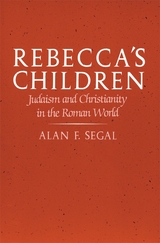 Rebecca’s Children: Judaism and Christianity in the Roman World
Alan F. Segal
Harvard University Press, 1986 Renowned scholar Alan F. Segal offers startlingly new insights into the origins of rabbinic Judaism and Christianity. These twin descendants of Hebrew heritage shared the same social, cultural, and ideological context, as well as the same minority status, in the first century of the common era.
Through skillful application of social science theories to ancient Western thought, including Judaism, Hellenism, early Christianity, and a host of other sectarian beliefs, Segal reinterprets some of the most important events of Jewish and Christian life in the Roman world. For example, he finds:
— That the concept of myth, as it related to covenant, was a central force of Jewish life. The Torah was the embodiment of covenant both for Jews living in exile and for the Jewish community in Israel.
— That the Torah legitimated all native institutions at the time of Jesus, even though the Temple, Sanhedrin, and Synagogue, as well as the concepts of messiah and resurrection, were profoundly affected by Hellenism. Both rabbinic Judaism and Christianity necessarily relied on the Torah to authenticate their claim on Jewish life.
— That the unique cohesion of early Christianity, assuring its phenomenal success in the Hellenistic world, was assisted by the Jewish practices of apocalypticism, conversion, and rejection of civic ritual.
— That the concept of acculturation clarifies the Maccabean revolt, the rise of Christianity, and the emergence of rabbinic Judaism.
— That contemporary models of revolution point to the place of Jesus as a radical.
— That early rabbinism grew out of the attempts of middle-class Pharisees to reach a higher sacred status in Judea while at the same time maintaining their cohesion through ritual purity.
— That the dispute between Judaism and Christianity reflects a class conflict over the meaning of covenant.
The rising turmoil between Jews and Christians affected the development of both rabbinic Judaism and Christianity, as each tried to preserve the partly destroyed culture of Judea by becoming a religion. Both attempted to take the best of Judean and Hellenistic society without giving up the essential aspects of Israelite life. Both spiritualized old national symbols of the covenant and practices that consolidated power after the disastrous wars with Rome. The separation between Judaism and Christianity, sealed in magic, monotheism, law, and universalism, fractured what remained of the shared symbolic life of Judea, leaving Judaism and Christianity to fulfill the biblical demands of their god in entirely different ways.
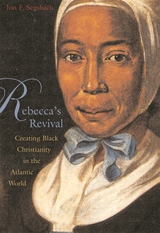 Rebecca's Revival: Creating Black Christianity in the Atlantic World
Jon F. Sensbach
Harvard University Press, 2005 Rebecca's Revival is the remarkable story of a Caribbean woman--a slave turned evangelist--who helped inspire the rise of black Christianity in the Atlantic world. All but unknown today, Rebecca Protten left an enduring influence on African-American religion and society. Born in 1718, Protten had a childhood conversion experience, gained her freedom from bondage, and joined a group of German proselytizers from the Moravian Church. She embarked on an itinerant mission, preaching to hundreds of the enslaved Africans of St. Thomas, a Danish sugar colony in the West Indies. Laboring in obscurity and weathering persecution from hostile planters, Protten and other black preachers created the earliest African Protestant congregation in the Americas.
Protten's eventful life--the recruiting of converts, an interracial marriage, a trial on charges of blasphemy and inciting of slaves, travels to Germany and West Africa--placed her on the cusp of an emerging international Afro-Atlantic evangelicalism. Her career provides a unique lens on this prophetic movement that would soon sweep through the slave quarters of the Caribbean and North America, radically transforming African-American culture.
Jon Sensbach has pieced together this forgotten life of a black visionary from German, Danish, and Dutch records, including letters in Protten's own hand, to create an astounding tale of one woman's freedom amidst the slave trade. Protten's life, with its evangelical efforts on three continents, reveals the dynamic relations of the Atlantic world and affords great insight into the ways black Christianity developed in the New World.
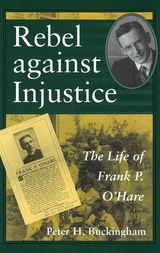 Rebel against Injustice: The Life of Frank P. O'Hare
Peter H. Buckingham
University of Missouri Press, 1996
Rebel against Injustice, a carefully crafted biography of Frank P. O'Hare (1877-1960), socialist, political activist, editor, and husband of prominent radical Kate Richards O'Hare, is the first study of a much-neglected but important figure of the American Left whose contributions are often referred to, in passing, in many other works.
Abandoned by his father at the age of four, O'Hare grew up in the Kerry Patch slum of St. Louis. Although he began his career in business, O'Hare turned to socialism with the sublime dream of bringing about a better world. While attending a school for Socialist organizers, he met Kate Richards, and the young couple forged a personal and professional partnership. Settling in Oklahoma, the O'Hares helped build a strong grassroots movement through grueling lecture tours and colorful camp meetings. In 1911, Frank, his wife, and their four children moved to St. Louis, where they transformed the National Rip-Saw into a popular Socialist monthly magazine. It was there that Frank found his niche as a Socialist impresario, editing the writings and arranging the tours of his "stars," Kate O'Hare and Eugene Debs.
A series of calamities, including the breakup of his marriage, brought Frank O'Hare near the edge of despair in the mid-1920s. Divorcing and remarrying, he made a new life in St. Louis. Plunging back into radical activism, he worked for the Federated Press syndicate. During the last twenty years of his life, O'Hare wrote for the St. Louis Post-Dispatch, worked as a business consultant, and continued his involvement as a community activist in St. Louis. Although Frank O'Hare has long been dismissed as a lost soul without Kate Richards O'Hare, Rebel against Injustice shows that he continued to be a presence in St. Louis and never stopped his fight against injustice. In 1958, a Teamster newspaper referred to O'Hare as "one of the truly great men of St. Louis--possibly the ONLY one."
Based upon a close study of the largely untapped Frank P. O'Hare papers, this well-written biography will enlighten readers about the organizational choices behind the success of American Socialism, while shedding new light on the lives and activities of many prominent American radicals.
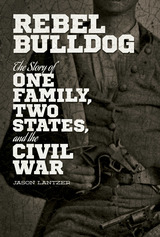 Rebel Bulldog: The Story of One Family, Two States, and the Civil War
Jason Lantzer
Indiana Historical Society Press, 2017 Rebel Bulldog tells the story of Preston Davidson, a Northerner who fought for the Confederacy, and his family who lived in Indiana and Virginia. It is a story that examines antebellum religion, education, reform, and politics, and how they affected the identity of not just one young man, but of a nation caught up in a civil war. Furthermore, it discusses how a native-born Hoosier reached the decision to fight for the South, while detailing a unique war experience and the postwar life of a proud Rebel who returned to the North after the guns fell silent and tried to remake his life in a very different state and nation than the ones he had left in 1860.
Using the lives of Preston and his family as a lens to help us glimpse the past, Rebel Bulldog delves into the human experience on multiple levels, asks us to reconsider what we think we know of the Civil War, and complicates, while it complements the existing literature. It is a story that perhaps could only have happened in Indiana.
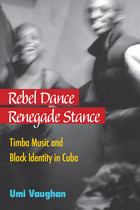 Rebel Dance, Renegade Stance: Timba Music and Black Identity in Cuba
Umi Vaughan
University of Michigan Press, 2013 Rebel Dance, Renegade Stanceshows how community music-makers and dancers take in all that is around them socially and globally, and publicly and bodily unfold their memories, sentiments, and raw responses within open spaces designated or commandeered for local popular dance. Umi Vaughan, an African American anthropologist, musician, dancer, and photographer "plantao" in Cuba—planted, living like a Cuban—reveals a rarely discussed perspective on contemporary Cuban society during the 1990s, the peak decade of timba, and beyond, as the Cuban leadership transferred from Fidel Castro to his brother. Simultaneously, the book reveals popular dance music in the context of a young and astutely educated Cuban generation of fierce and creative performers. By looking at the experiences of black Cubans and exploring the notion of "Afro Cuba," Rebel Dance, Renegade Stanceexplains timba's evolution and achieved significance in the larger context of Cuban culture. Vaughan discusses a maroon aesthetic extended beyond the colonial era to the context of contemporary society; describes the dance spaces of Cuba; and examines the performance of identity and desire through the character of the "especulador." This book will find an audience with musicians, anthropologists, ethnomusicologists, interdisciplinary specialists in performance studies, cultural studies, and Latin American and Caribbean studies, as well as laypeople who are interested in Atlantic/African and African American/Africana studies and/or Cuban culture.
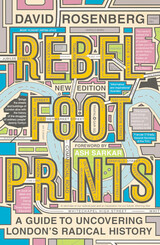 Rebel Footprints: A Guide to Uncovering London's Radical History
David Rosenberg
Pluto Press, 2019 "There is so much that is inspirational in this book, whether the struggles of Jewish tailors in Spitalfields, bakers across the city (who were obliged to work 16-hour shifts in poorly ventilated basements), or the battles against fascism in Cable Street." ― Guardian
If you visit London, and you’ve only experienced Buckingham Palace, The Tower of London, and The Millennium Wheel, you’ve missed the true essence of London, and its politically-charged, rebellious history. A truly radical response to conservative heritage tours and banal day trips, Rebel Footprints brings to life the history of social movements in England's capital by providing lively commentary, maps, and walking tours you will not find anywhere else.
David Rosenberg transports readers from well-known landmarks to history-making hidden corners, while telling the story of protest and struggle in London from the early nineteenth to the mid-twentieth century.
From the suffragettes to the socialists, from the chartists to the trade unionists: Rosenberg invites us to step into the footprints of a diverse cast of dedicated fighters for social justice. Individual chapters highlight particular struggles and their participants, from famous faces to lesser-known luminaries. Chapters include:
*Writers and Rioters in the Fleet Street Precinct
*Trailblazers for Democracy in Clerkenwell Green
*The Spark of Rebellion in Bow
*Coming in from the Cold: Immigrant Agitators and Radicals in Spitalfields
*No Gods, No Masters: Radical Bloomsbury
*Life on the Boundary: Fighting for Housing in Bethnal Green and Shoreditch
*Stirrings from the South: The Battersea Four
*peaking Truth to Power: Suffragettes and Westminster
*Not Afraid of the Prison Walls: Rebel Women and Men of Poplar
*People's Power in Bermondsey
Rebel Footprints sets London's radical campaigners against the backdrop of the city's multi-faceted development. Self-directed walks pair with narratives that seamlessly blend history, politics, and geography, while specially commissioned maps and illustrations immerse the reader in the story of the city.
Whether you're visiting London for the first time, or born and raised there, Rosenberg invites you to see London as you never have before—the radical center of the English-speaking world.
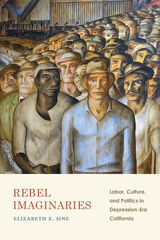 Rebel Imaginaries: Labor, Culture, and Politics in Depression-Era California
Elizabeth E. Sine
Duke University Press, 2021 During the Great Depression, California became a wellspring for some of the era's most inventive and imaginative political movements. In response to the global catastrophe, the multiracial laboring populations who formed the basis of California's economy gave rise to an oppositional culture that challenged the modes of racialism, nationalism, and rationalism that had guided modernization during preceding decades. In Rebel Imaginaries Elizabeth E. Sine tells the story of that oppositional culture's emergence, revealing how aggrieved Californians asserted political visions that embraced difference, fostered a sense of shared vulnerability, and underscored the interconnectedness and interdependence of global struggles for human dignity. From the Imperial Valley's agricultural fields to Hollywood, seemingly disparate communities of African American, Native American, Mexican, Filipinx, Asian, and White working-class people were linked by their myriad struggles against Depression-era capitalism and patterns of inequality and marginalization. In tracing the diverse coalition of those involved in labor strikes, citizenship and immigration reform, and articulating and imagining freedom through artistic practice, Sine demonstrates that the era's social movements were far more heterogeneous, multivalent, and contested than previously understood.
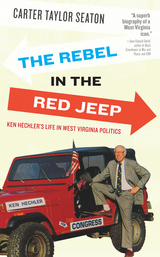 The Rebel in the Red Jeep: Ken Hechler's Life in West Virginia Politics
Carter Taylor Seaton
West Virginia University Press, 2017 The Rebel in the Red Jeep follows the personal and professional experiences of Ken Hechler, the oldest living person to have served in the US Congress, from his childhood until his marriage at 98 years of age.
This biography recounts a century of accomplishments, from Hechler’s introduction of innovative teaching methods at major universities, to his work as a speechwriter and researcher for President Harry Truman, and finally to his time representing West Virginia in the US House of Representatives and as the secretary of state.
In West Virginia, where he resisted mainstream political ideology, Hechler was the principal architect behind the Federal Coal Mine Health and Safety Act of 1969 and constantly battled big coal, strip-mining, and fellow politicians alike. He and his signature red jeep remain a fixture in West Virginia. Since 2004, Hechler has campaigned against mountaintop removal mining. He was arrested for trespassing during a protest in 2009 at the age of 94.
Rebel Poet: More Stories from a 21st Century Indian
Louis V. Clark (Two Shoes)
Wisconsin Historical Society Press, 2019 This eagerly anticipated follow-up to the breakout memoir How to Be an Indian in the 21st Century delves more deeply into the themes of family, community, grief, and the struggle to make a place in the world when your very identity is considered suspect. In Rebel Poet: More Stories from a 21st Century Indian, author Louis Clark examines the effects of his mother's alcoholism and his young sister's death, offers an intimate recounting of the backlash he faced as an Indian on the job, and celebrates the hard-fought sense of home he and his wife have created. Rebel Poet continues the author's tradition of seamlessly mixing poetry and prose, and is at turns darker and more nuanced than its predecessor.
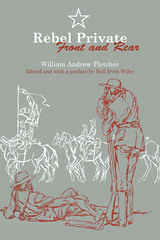 Rebel Private Front and Rear
By William Andrew Fletcher
University of Texas Press, 1954 Rebel Private Front and Rear is a line soldier’s account of the Civil War without heroics. Private Fletcher tells how at Gettysburg he was overcome by a “bad case of cowardly horror” when an order came on the third day to get ready to charge. “I tried to force manhood to the front, but fright would drive it back with a shudder,” he confessed. The attack of jitters lasted about fifteen minutes, and then he fell asleep while awaiting the order to advance. But Fletcher could be brave to a fault. He was restless and venturesome and during the lulls between fighting would sometimes ask for permission to go on dangerous scouts into enemy territory. Once, just before Fredericksburg, he slipped out to a haystack in the no-man’s-land near the Rappahannock so that he could watch the Yankees build a bridge. And in his last fight at Bentonville he risked his life on a rash and futile impulse to capture a whole squad of Federals. At Second Manassas, Fletcher was struck by a bullet that grazed his bowels and lodged in his hip. His detailed description of his subsequent sensations and experiences is one of the most interesting portions of his narrative. He begged the surgeons to operate, but when they started cutting he howled so profanely that they threatened to abandon him. His reply was: “It don’t hurt as badly when I am cursing.” Wounded again at Chickamauga, Fletcher was incapacitated for further infantry service and was transferred to Company E, Eighth Texas Cavalry, and served with Terry’s Rangers until the end of the war. In north Georgia he participated in a number of thrilling skirmishes with mounted forces of Sherman’s command, and in one of these encounters he lost his horse. A short time later, in a daring effort to capture a mount from the Yankees, he was taken prisoner. The story of the forming and execution of his plan to escape by jumping from a moving boxcar is full of suspense and excitement. Rebel Private also reveals Fletcher as something of a philosopher. The narrative is sprinkled with dissertations on unexpected subjects, such as God, justice, and war. He reflects on the rightness and the necessity of “foraging,” in home as well as enemy territory, but he tells with evident relish how he and his “pard” of the occasion “pressed” whiskey, honey, and chickens. Fletcher set down his experiences some forty years after the close of the Civil War. His story is told with the artlessness of the natural raconteur. Though the style is unpolished, the memoir makes lively reading because of the author’s eye for detail, his straightforward language, and his sense of humor. One of the most frequently cited narratives written by soldiers of Lee’s army, it derives its value as a historical source mainly from Fletcher’s honesty, his close observations, the richness and variety of his experiences, and the sharpness of his memory.
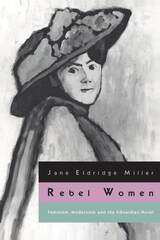 Rebel Women: Feminism, Modernism and the Edwardian Novel
Jane Eldridge Miller
University of Chicago Press, 1996 With the rise of women's suffrage, challenges to marriage and divorce laws, and expanding opportunities for education and employment for women, the early years of the twentieth century were a time of social revolution. Examining British novels written in 1890-1914, Jane Eldridge Miller demonstrates how these social, legal, and economic changes rendered the traditional narratives of romantic desire and marital closure inadequate, forcing Edwardian novelists to counter the limitations and ideological implications of those narratives with innovative strategies. The original and provocative novels that resulted depict the experiences of modern women with unprecedented variety, specificity, and frankness. Rebel Women is a major re-evaluation of Edwardian fiction and a significant contribution to literary history and criticism.
"Miller's is the best account we have, not only of Edwardian women novelists, but of early 20th-century women novelists; the measure of her achievement is that the distinction no longer seems workable." —David Trotter, The London Review of Books
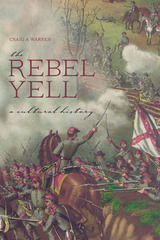 The Rebel Yell: A Cultural History
Craig A. Warren
University of Alabama Press, 2014 The first comprehensive history of the fabled Confederate battle cry from its origins and myths through its use in American popular culture
No aspect of Civil War military lore has received less scholarly attention than the battle cry of the Southern soldier. In The Rebel Yell, Craig A. Warren brings together soldiers' memoirs, little-known articles, and recordings to create a fascinating and exhaustive exploration of the facts and myths about the “Southern screech.”
Through close readings of numerous accounts, Warren demonstrates that the Rebel yell was not a single, unchanging call, but rather it varied from place to place, evolved over time, and expressed nuanced shades of emotion. A multifunctional act, the flexible Rebel yell was immediately recognizable to friends and foes but acquired new forms and purposes as the epic struggle wore on. A Confederate regiment might deliver the yell in harrowing unison to taunt Union troops across the empty spaces of a battlefield. At other times, individual soldiers would call out solo or in call-and-response fashion to communicate with or secure the perimeters of their camps.
The Rebel yell could embody unity and valor, but could also become the voice of racism and hatred. Perhaps most surprising, The Rebel Yell reveals that from Reconstruction through the first half of the twentieth century, the Rebel yell—even more than the Confederate battle flag—served as the most prominent and potent symbol of white Southern defiance of Federal authority. With regard to the late-twentieth and early twenty-first centuries, Warren shows that the yell has served the needs of people the world over: soldiers and civilians, politicians and musicians, re-enactors and humorists, artists and businessmen. Warren dismantles popular assumptions about the Rebel yell as well as the notion that the yell was ever “lost to history.”
Both scholarly and accessible, The Rebel Yell contributes to our knowledge of Civil War history and public memory. It shows the centrality of voice and sound to any reckoning of Southern culture.
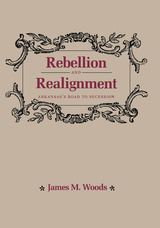 Rebellion and Realignment: Arkansas's Road to Secession
James M. Woods
University of Arkansas Press, 1987 Arkansas, the Old South’s last frontier, was forced, after the election of Lincoln, to face the issue of secession. A decade earlier, the state had spurned all efforts from within to withdraw from the Union, but the following ten years drew Arkansas deeper into the economic and cultural community that bound it to the other slaveholding states. Now rumblings of secession were heard even before the president-elect assumed office on March 4, 1861. The question was asked on street corners, in offices, barbershops and living rooms: Would Arkansas leave the Union? Answers to that question caused a fundamental realignment of politics in Arkansas during the winter of 1860–61. The former political coalition of Democrat and Whig fell away in a geographical split between the uplands and the lowlands. In this important and exciting book, the first to tell the story of Arkansas’s road to secession, James Woods examines the differences between uplanders, whose mountain regions offered little useful farmland for any crop, and lowlanders, whose vast deltas were ideally suited for cotton farming. The southern portion of the state began to rely increasingly upon slavery as it became linked to the economy of cotton and Southern antebellum values, but the northern region of the state did not. Woods focuses upon the resulting social, economic, and geographic divisions that grew within Arkansas before and during the secession crisis. He captures the political struggles of the state as it tore away from the nation, and as it threatened, in so doing, to tear itself apart.
Rebellion in the Backlands
Euclides da Cunha
University of Chicago Press, 1957 Euclides da Cunha's classic account of the brutal campaigns against religious mystic Antonio Conselheiro has been called the Bible of Brazilian nationality.
"Euclides da Cunha went on the campaigns [against Conselheiro] as a journalist and what he returned with and published in 1902 is still unsurpassed in Latin American literature. Cunha is a talent as grand, spacious, entangled with knowledge, curiosity, and bafflement as the country itself. . . . On every page there is a heart of idea, speculation, dramatic observation that tells of a creative mission undertaken, the identity of the nation, and also the creation of a pure and eloquent prose style."—Elizabeth Hardwick, Bartleby in Manhattan
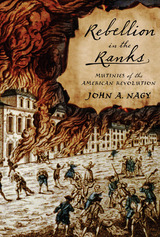 Rebellion in the Ranks: Mutinies of the American Revolution
John A. Nagy
Westholme Publishing, 2007 How General Washington Avoided the Peril From Within His Own Forces
"It gives me great pain to be obliged to solicit the attention of the honorable Congress to the state of the army...the greater part of the army is in a state not far from mutiny...I know not to whom to impute this failure, but I am of the opinion, if the evil is not immediately remedied and more punctuality observed in future, the army must absolutely break up."—George Washington, September 1775 Mutiny has always been a threat to the integrity of armies, particularly under trying circumstances, and since Concord and Lexington, mutiny had been the Continental Army's constant traveling companion. It was not because the soldiers lacked resolve to overturn British rule or had a lack of faith in their commanders. It was the scarcity of food—during winter months it was not uncommon for soldiers to subsist on a soup of melted snow, a few peas, and a scrap of fat—money, clothing, and proper shelter, that forced soldiers to desert or organize resistance. Mutiny was not a new concept for George Washington. During his service in the French and Indian War he had tried men under his command for the offense and he knew that disaffection and lack of morale in an army was a greater danger than an armed enemy. In Rebellion in the Ranks: Mutinies of the American Revolution, John A. Nagy provides one of the most original and valuable contributions to American Revolutionary War history in recent times. Mining previously ignored British and American primary source documents and reexamining other period writings, Nagy has corrected misconceptions about known events, such as the Pennsylvania Line Mutiny, while identifying for the first time previously unknown mutinies. Covering both the army and the navy, Nagy relates American officers' constant struggle to keep up the morale of their troops, while highlighting British efforts to exploit this potentially fatal flaw.
Rebellion Is the Circle of a Lover's Hands/Rebelió
Martín Espada
Northwestern University Press, 1995 In his masterful bilingual collection Rebellion Is the Circle of a Lover's Hands/Rebelión es el giro de manos del amante, acclaimed, award-winning poet Martín Espada explores and illuminates what it means to be Puerto Rican in the United States today.
 Rebellion or Revolution?
Harold Cruse
University of Minnesota Press, 2009 A classic work of African American cultural, social, and political thought by a forerunner of the Black Power movement One of the leading writers of African American intellectual life in the second half of the twentieth century, Harold Cruse first came to international attention in 1967 with the publication of his influential and inflammatory book, The Crisis of the Negro Intellectual. This fiercely opinionated and deeply informed critique of both integrationism and black nationalism established Cruse as a bold new voice on race and resistance in America. First published in the wake of The Crisis of the Negro Intellectual’s success , Rebellion or Revolution? collects reviews and essays Cruse wrote between 1950 and 1966, examining the relevance of such figures as James Baldwin, Booker T. Washington, Albert Camus, and Josephine Baker, as well as such subjects as Marxism and the African American community, the economics of black nationalism, and the emerging Black Power movement. Rebellion or Revolution? contains a number of significant writings not available elsewhere.Now, with a new foreword by Cedric Johnson, this work finally emerges as both an essential document from a crucial moment in African American history and a road map to the origins and evolution of Cruse’s critical thought, asserting its importance in today’s debates on race in America.
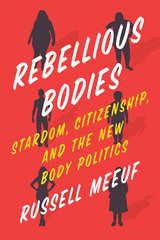 Rebellious Bodies: Stardom, Citizenship, and the New Body Politics
By Russell Meeuf
University of Texas Press, 2017 Celebrity culture today teems with stars who challenge long-held ideas about a “normal” body. Plus-size and older actresses are rebelling against the cultural obsession with slender bodies and youth. Physically disabled actors and actresses are moving beyond the stock roles and stereotypes that once constrained their opportunities. Stars of various races and ethnicities are crafting new narratives about cultural belonging, while transgender performers are challenging our culture’s assumptions about gender and identity. But do these new players in contemporary entertainment media truly signal a new acceptance of body diversity in popular culture? Focusing on six key examples—Melissa McCarthy, Gabourey Sidibe, Peter Dinklage, Danny Trejo, Betty White, and Laverne Cox—Rebellious Bodies examines the new body politics of stardom, situating each star against a prominent cultural anxiety about bodies and inclusion, evoking issues ranging from the obesity epidemic and the rise of postracial rhetoric to disability rights, Latino/a immigration, an aging population, and transgender activism. Using a wide variety of sources featuring these celebrities—films, TV shows, entertainment journalism, and more—to analyze each one’s media persona, Russell Meeuf demonstrates that while these stars are promoted as examples of a supposedly more inclusive industry, the reality is far more complex. Revealing how their bodies have become sites for negotiating the still-contested boundaries of cultural citizenship, he uncovers the stark limitations of inclusion in a deeply unequal world.
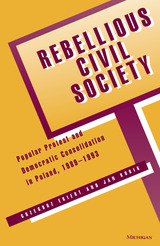 Rebellious Civil Society: Popular Protest and Democratic Consolidation in Poland, 1989-1993
Grzegorz Ekiert and Jan Kubik
University of Michigan Press, 2001 Poland is the only country in which popular protest and mass opposition, epitomized by the Solidarity movement, played a significant role in bringing down the communist regime. This book, the first comprehensive study of the politics of protest in postcommunist Central Europe, shows that organized protests not only continued under the new regime but also had a powerful impact on Poland's democratic consolidation.
Following the collapse of communism in 1989, the countries of Eastern Europe embarked on the gargantuan project of restructuring their social, political, economic, and cultural institutions. The social cost of these transformations was high, and citizens expressed their discontent in various ways. Protest actions became common events, particularly in Poland. In order to explain why protest in Poland was so intense and so particularized, Grzegorz Ekiert and Jan Kubik place the situation within a broad political, economic, and social context and test it against major theories of protest politics. They conclude that in transitional polities where conventional political institutions such as parties or interest groups are underdeveloped, organized collective protest becomes a legitimate and moderately effective strategy for conducting state-society dialogue. The authors offer an original and rich description of protest movements in Poland after the fall of communism as a basis for developing and testing their ideas. They highlight the organized and moderate character of the protests and argue that the protests were not intended to reverse the change of 1989 but to protest specific policies of the government.
This book contributes to the literature on democratic consolidation, on the institutionalization of state-society relationship, and on protest and social movements. It will be of interest to political scientists, sociologists, historians, and policy advisors.
Grzegorz Ekiert is Professor of Government, Harvard University. Jan Kubik is Associate Professor of Political Science, Rutgers University.
A Rebellious People: Basques, Protests, And Politics
Cyrus Ernesto Zirakzadeh
University of Nevada Press, 1991 In this scholarly work, Zirakzadeh argues that there is a calculated reasoning behind ETA's political violence that is often overlooked by researchers. His book is a comprehensive account of the Basque region's grassroots politics.
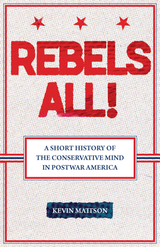 Rebels All!: Rebels All! A Short History of the Conservative Mind in Postwar America
Mattson, Kevin
Rutgers University Press, 2008 Outstanding Academic Title of 2008
Do you ever wonder why conservative pundits drop the word “faggot” or talk about killing and then Christianizing Muslims abroad? Do you wonder why the right’s spokespeople seem so confrontational, rude, and over-the-top recently? Does it seem strange that conservative books have such apocalyptic titles? Do you marvel at why conservative writers trumpeted the “rebel” qualities of George W. Bush just a few years back? There is no doubt that the style of the political right today is tough, brash, and by many accounts, not very conservative sounding. After all, isn’t conservatism supposed to be about maintaining standards, upholding civility, and frowning upon rebellion? Historian Kevin Mattson explains the apparent contradictions of the party in this fresh examination of the postwar conservative mind. Examining a big cast of characters that includes William F. Buckley, Whittaker Chambers, Norman Podhoretz, Irving Kristol, Kevin Phillips, David Brooks, and others, Mattson shows how right-wing intellectuals have always, but in different ways, played to the populist and rowdy tendencies in America’s political culture. He boldly compares the conservative intellectual movement to the radical utopians among the New Left of the 1960s and he explains how conservatism has ingested central features of American culture, including a distrust of sophistication and intellectualism and a love of popular culture, sensation, shock, and celebrity. Both a work of history and political criticism, Rebels All! shows how the conservative mind made itself appealing, but also points to its endemic problems. Mattson’s conclusion outlines how a recast liberalism should respond to the conservative ascendancy that has marked our politics for the last thirty years.
 Rebels and Outliers: Real Stories of the American West
John M Glionna
University of Nevada Press, 2025 Rebels and Outliers: Real Stories of the American West shines a spotlight on the unforgettable characters that author and journalist John M. Glionna has encountered during his more than 30 years crisscrossing the western United States for some of the nation’s top newspapers. With sharp insights, Glionna captures the essence of the modern West through the lives of its most intriguing, unconventional inhabitants. From the struggles of a Navajo Nation police officer grappling with the tension of enforcing laws among her own people to the quirks of a pig farmer who feeds his livestock with leftovers from Las Vegas’s extravagant buffets, Glionna fearlessly delves into topics that reveal the complexities of life on the fringes. Each showcases Glionna’s remarkable talent for uncovering the universal truths that connect us all.
This vibrant collection invites readers to journey through the rugged landscapes and tight-knit communities that define the American West. Along the way, you’ll meet individuals whose grit, resilience, and pioneering spirit embody the heart of this region’s legacy.
A captivating follow-up to Glionna’s 2022 book, Outback Nevada: Real Stories of the Silver State, Rebels and Outliers is a testament to the untamed, enduring character of the people who call the West home.
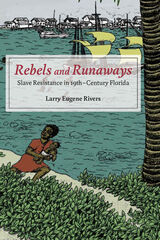 Rebels and Runaways: Slave Resistance in Nineteenth-Century Florida
Larry Eugene Rivers
University of Illinois Press, 2013 This gripping study examines slave resistance and protest in antebellum Florida and its local and national impact from 1821 to 1865. Using a variety of sources such as slaveholders' wills and probate records, ledgers, account books, court records, oral histories, and numerous newspaper accounts, Larry Eugene Rivers discusses the historical significance of Florida as a runaway slave haven dating back to the seventeenth century and explains Florida's unique history of slave resistance and protest. In moving detail, Rivers illustrates what life was like for enslaved blacks whose families were pulled asunder as they relocated from the Upper South to the Lower South to an untamed place such as Florida, and how they fought back any way they could to control small parts of their own lives.
Against a smoldering backdrop of violence, this study analyzes the various degrees of slave resistance--from the perspectives of both slave and master--and how they differed in various regions of antebellum Florida. In particular, Rivers demonstrates how the Atlantic world view of some enslaved blacks successfully aided their escape to freedom, a path that did not always lead North but sometimes farther South to the Bahama Islands and Caribbean. Identifying more commonly known slave rebellions such as the Stono, Louisiana, Denmark (Telemaque) Vesey, Gabriel, and the Nat Turner insurrections, Rivers argues persuasively that the size, scope, and intensity of black resistance in the Second Seminole War makes it the largest sustained slave insurrection ever to occur in American history.
Meticulously researched, Rebels and Runaways offers a detailed account of resistance, protest, and violence as enslaved blacks fought for freedom.
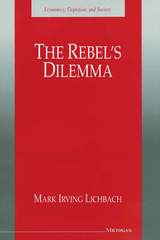 The Rebel's Dilemma
Mark Irving Lichbach
University of Michigan Press, 1998 Since the mid 1960s, theorists have elaborated over two dozen different solutions to the collection action problem. During much of this same period, students of conflict have explored many questions about protest and rebellion. The Rebel's Dilemma examines what happens when one brings the full richness of collective action theories to bear on the many complex problems of collective dissent.
". . . a significant contribution to the understanding of collective behavior, protest, and rebellion." --Choice
"The book is interesting and thought-provoking, and its insights extend beyond the narrow subject of rebellion to help illuminate many issues related to organizing groups to undertake collective action." --Public Choice
"[Lichbach's] book is monumental and pivotal. . . . [It] consolidates over three decades of research on collective action problems and sets the agenda for future studies of collective dissent and rebellion. . . . [This] book is a major step forward. It will have an enormous impact in the field of conflict studies and belongs on the shelf of anyone even casually interested in dissent, rebellion, and revolution. . . . [This] book is a major step forward. It will have an enormous impact in the field of conflict studies and belongs on the shelf of anyone even casually interested in dissent, rebellion, and revolution." --American Political Science Review
"For scholars interested in game-theoretic analyses of politics . . . essential reading." --Manus I. Midlarsky, Journal of Politics
"Lichbach has to be praised for providing valuable insight on the logic of collective dissent. . . ." --Political Studies
Mark Irving Lichbach is Professor of Political Science, University of Colorado.
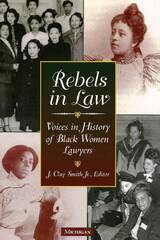 Rebels in Law: Voices in History of Black Women Lawyers
J. Clay Smith, Jr., Editor
University of Michigan Press, 2000 Black women lawyers are not new to the practice of law or to leadership in the fight for justice and quality. Black women formally entered the practice of American law in 1872, the year that Charlotte E. Ray became the first black woman to graduate from an American law school. Rebels in Lawintroduces some of these women and through their own writing tells a compelling story about the little-known involvement of black women in law and politics. Beginning with a short essay written in 1897, the writing collected by J. Clay Smith, Jr., tells us how black women came to the practice of law, the challenges they faced as women and as blacks in making a place for themselves in the legal profession, their fight to become legal educators, and their efforts to encourage other black women and black men to come to the practice of law.
The essays demonstrate the involvement of black women lawyers in important public issues of our time and show them addressing the sensitive subjects of race, equality, justice and freedom. Drawing together many writings that have never been published or have been published in obscure journals or newspapers, Rebels in Law is a groundbreaking study. In addition, it offers historical background information on each writer and on the history of black women lawyers. Providing an opportunity to study the origins of black women as professionals, community leaders, wives, mothers, and feminists, it will be of interest to scholars in the fields of law, history, political science, sociology, black studies and women's studies.
J. Clay Smith, Jr., is Professor of Law, Howard University Law School. He was formerly a member of the United States Equal Employment Opportunity Commission, Dean of Howard University Law School, and President of the Washington Bar Association. He is the author of Emancipation: The Making of the Black Lawyer, 1844-1944 and numerous articles.
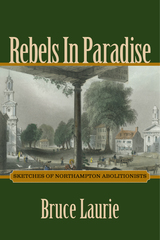 Rebels in Paradise: Sketches of Northampton Abolitionists
Bruce Laurie
University of Massachusetts Press, 2014 Long ago dubbed the "Paradise of America," Northampton, Massachusetts, is also known as the home of visionaries—from the Reverend Jonathan Edwards, father of the First Great Awakening, to George W. Benson, brother-in-law of William Lloyd Garrison and a founder of the utopian Northampton Association for Education and Industry. During the mid-nineteenth century the town became a center of political abolitionism and a hub in the Underground Railroad. In this book, Bruce Laurie profiles five rebellious figures who launched Northampton's abolitionist movement—Sylvester Judd Jr., John Payson Williston, David Ruggles, Henry Sherwood Gere, and Erastus Hopkins. Through their individual stories he traces the evolution of the antislavery movement in western Massachusetts and links it to broader developments in economics, civil life, and political affairs.
Northampton's abolitionists were a heterodox group, yet most were intrepid devotees of democracy and racial equality, idealists who enjoyed genuine friendships and political alliances with African Americans. Several even took the bold step of hiring African Americans in their businesses. They avoided the doctrinal rivalries that sometimes troubled the antislavery movement in other places, skillfully steering clear of the xenophobic nativism that infected Massachusetts politics in the mid–1850s and divided the Republican Party at large. Although a prohibitionist faction disrupted the Northampton abolitionist movement for a time, the leaders prevailed on the strength of their personal prestige and political experience, making the seat of Hampshire County what one of them called an abolitionist "stronghold."
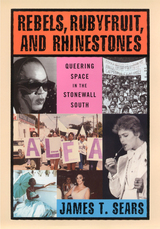 Rebels, Rubyfruit, and Rhinestones: Queering Space in the Stonewall South
Sears, James T.
Rutgers University Press, 2001 While Scarlett O'Hara may resemble a drag queen, and Mardi Gras inspires more camp than a gay pride parade, the American South also boasts a rich, authentic and transgressive gay and lesbian history. In this chatty, free-ranging cultural survey, Sears (Growing Up Gay in the South) presents a vivid kaleidoscope of the mores and political activities of many gay Southerners following the 1969 Stonewall riots and leading up to the 1979 march on Washington. Sears unspools this history through portraits of activists and community organizers including Merril Mushroom, Jack Nichols, Lige Clark, Vicki Gabriner, Minnie Bruce Pratt and Sgt. Leonard Matlovitch who helped shape the social and political climate below the Mason Dixon line and often in the rest of the country. While giving a nod to historic events like Anita Bryant's Save Our Children campaign, Sears focuses more closely on obscure but important local political events, like the founding of the lesbian journal Sinister Wisdom, the emergence of the Atlanta Lesbian Feminist Alliance and community response to a deadly firebombing that killed 31 patrons in a New Orleans bar in the mid-1970s. Sears's multifaceted approach pays off when he sketches such relatively unknown players as comedian Ray Bourbon and radical fairy Faygele ben Miriam, and he conveys well the complexity and intensity of the political activity of the decade. While not as historically conclusive or theoretically astute as John Howard's masterful Men Like That (2000), Sears provides a panoply of emotionally riveting snapshots that aptly portray Southern gay experience in the 1970s. B&w photos.
The Rebel's Silhouette: Selected Poems
Faiz Ahmed Faiz, translated and edited by Agha Shalid Ali
University of Massachusetts Press, 1995 Born in India and considered the leading poet on the South Asian subcontinent, Faiz Ahmed Faiz (1911-1984) was a two-time Nobel nominee and winner of the 1962 Lenin Peace Prize. His evening readings in Hindi/Urdu-speaking regions drew thousands of listeners. Associated with the Communist party in his youth, Faiz became an outspoken poet in opposition to the Pakistani government. This volume offers a selection of Faiz's poetry in a bilingual Urdu/English edition with a new introduction by poet and translator Agha Shahid Ali.
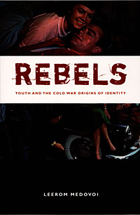 Rebels: Youth and the Cold War Origins of Identity
Leerom Medovoi
Duke University Press, 2005 Holden Caulfield, the beat writers, Elvis Presley, Chuck Berry, and James Dean—these and other avatars of youthful rebellion were much more than entertainment. As Leerom Medovoi shows, they were often embraced and hotly debated at the dawn of the Cold War era because they stood for dissent and defiance at a time when the ideological production of the United States as leader of the “free world” required emancipatory figures who could represent America’s geopolitical claims. Medovoi argues that the “bad boy” became a guarantor of the country’s anti-authoritarian, democratic self-image: a kindred spirit to the freedom-seeking nations of the rapidly decolonizing third world and a counterpoint to the repressive conformity attributed to both the Soviet Union abroad and America’s burgeoning suburbs at home. Alongside the young rebel, the contemporary concept of identity emerged in the 1950s. It was in that decade that “identity” was first used to define collective selves in the politicized manner that is recognizable today: in terms such as “national identity” and “racial identity.” Medovoi traces the rapid absorption of identity themes across many facets of postwar American culture, including beat literature, the young adult novel, the Hollywood teen film, early rock ‘n’ roll, black drama, and “bad girl” narratives. He demonstrates that youth culture especially began to exhibit telltale motifs of teen, racial, sexual, gender, and generational revolt that would burst into political prominence during the ensuing decades, bequeathing to the progressive wing of contemporary American political culture a potent but ambiguous legacy of identity politics.
The Rebirth of Classical Political Rationalism: An Introduction to the Thought of Leo Strauss
Leo Strauss
University of Chicago Press, 1989 This concise and accessible introduction to Strauss's thought provides, for wider audience, a bridge to his more complex theoretical work. Editor Pangle has gathered five of Strauss's previously unpublished lectures and five hard-to-find published writings and has arranged them so as to demonstrate the systematic progression of the major themes that underlay Strauss's mature work.
"[These essays] display the incomparable insight and remarkable range of knowledge that set Strauss's works apart from any other twentieth-century philosopher's."—Charles R. Kesler, National Review
The Rebirth of Environmentalism: Grassroots Activism from the Spotted Owl to the Polar Bear
Douglas Bevington
Island Press, 2009 Over the past two decades, a select group of small but highly effective grassroots organizations have achieved remarkable success in protecting endangered species and forests in the United States. The Rebirth of Environmentalism tells for the first time the story of these grassroots biodiversity groups. Filled with inspiring stories of activists, groups, and campaigns that most readers will not have encountered before, The Rebirth of Environmentalism explores how grassroots biodiversity groups have had such a big impact despite their scant resources, and presents valuable lessons that can help the environmental movement as a whole—as well as other social movements—become more effective.
 The Rebirth of Russian Democracy: An Interpretation of Political Culture
Nicolai N. Petro
Harvard University Press, 1995 How could the West have better prepared for the fall of communism and gained a clearer picture of Russia's new political landscape? By cultivating an awareness, Nicolai Petro argues, of the deep democratic aspirations of the Russian people since Muscovite times. Petro traces the long history of those aspirations, recovering for us an understanding crucial to our formation of successful foreign policy toward Russia.
Expanding the traditional definition of political culture from single thread to continuous historical tapestry, Petro illuminates a reality previously lost to even the most rigorous Sovietology: the fragility of communism. He portrays an abiding "alternative political culture" that tells us Russia indeed possesses a democratic tradition on which its contemporary democracy rests.
Petro's analysis includes many surprising and incisive observations. In a look at the Russian Orthodox Church, he traces its long history of support for opposition sentiment during both tsarist and Soviet times and its support for democracy today. He also explores the character and power of contemporary Russian nationalism and traces its origins to the neo-Slavophile national identity that took its shape as a challenge to Bolshevik oppression. Delineating Russia's postcommunist political parties, the author reveals their roots in prerevolutionary times and explains how this continuity makes Russian political aspirations far more predictable than is commonly assumed.
Awakening us to Russia's historical involvement in the democratic quest that lies at the heart of Western values, Petro opens a path for a more meaningful, more productive understanding of modern Russia.
 The Rebirth of the Clinic: An Introduction to Spirituality in Health Care
Daniel P. Sulmasy, OFM, MD
Georgetown University Press, 2006 The Rebirth of the Clinic begins with a bold assertion: the doctor-patient relationship is sick. Fortunately, as this engrossing book demonstrates, the damage is not irreparable. Today, patients voice their desires to be seen not just as bodies, but as whole people. Though not willing to give up scientific progress and all it has to offer, they sense the need for more. Patients want a form of medicine that can heal them in body and soul. This movement is reflected in medical school curricula, in which courses in spirituality and health care are taught alongside anatomy and physiology. But how can health care workers translate these concepts into practice? How can they strike an appropriate balance, integrating and affirming spirituality without abandoning centuries of science or unwittingly adopting pseudoscience? Physician and philosopher Daniel Sulmasy is uniquely qualified to guide readers through this terrain. At the outset of this accessible, engaging volume, he explores the nature of illness and healing, focusing on health care's rich history as a spiritual practice and on the human dignity of the patient. Combining sound theological reflection with doses of healthy skepticism, he goes on to describe empirical research on the effects of spirituality on health, including scientific studies of the healing power of prayer, emphasizing that there are reasons beyond even promising research data to attend to the souls of patients. Finally, Sulmasy devotes special attention and compassion to the care of people at the end of life, incorporating the stories of several of his patients. Throughout, the author never strays from the theme that, for physicians, attending to the spiritual needs of patients should not be a moral option, but a moral obligation. This book is an essential resource for scholars and students of medicine and medical ethics and especially medical students and health care professionals.
 Rebirth of the Clinic: Places and Agents in Contemporary Health Care
Cindy Patton
University of Minnesota Press, 2010 From physical location to payment processes to expectations of both patients and caregivers, nearly everything surrounding the contemporary medical clinic's central activity has changed since Michel Foucualt's Birth of the Clinic. Indebted to that work, but recognizing the gap between what the modern clinic hoped to be and what it has become, Rebirth of the Clinic explores medical practices that shed light on the fraught relationship between medical systems, practitioners, and patients.
Combining theory, history, and ethnography, the contributors to this volume ground today's clinic in a larger scheme of power relations, identifying the cultural, political, and economic pressures that frame clinical relationships, including the instrumentalist definition of health, actuarial-based medical practices, and patient self-help movements, which simultaneously hem in and create the conditions under which agents creatively change ideas of illness and treatment.
From threatened community health centers in poor African American locales to innovative nursing practices among the marginally housed citizens of Canada's poorest urban neighborhood, this volume addresses not just the who, what, where, and how of place-specific clinical practices, but also sets these local experiences against a theoretical backdrop that links them to the power of modern medicine in shaping fundamental life experiences.
Contributors: Christine Ceci, U of Alberta; Lisa Diedrich, Stony Brook U; Suzanne Fraser, Monash U; John Liesch, Simon Fraser U; Jenna Loyd, CUNY; Annemarie Mol, U of Amsterdam; Mary Ellen Purkis, U of Victoria.
Rebirth of the Paraguayan Republic: The First Colorado Era, 1878-1904
Harris Gaylord Warren
University of Pittsburgh Press, 1985 A scholarly study of Paraguay in the decades dominated by the Colorados, immediately following the Allied occupation of the country after the disastrous War of the Triple Alliance, when half of Paraguay's population died. This period of rebirth saw the formal organization of Paraguay's major political parties, the Colorados and the Liberals, and the dominance of the Colorados until the Liberal revolution of 1904.
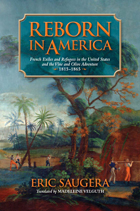 Reborn in America: French Exiles and Refugees in the United States and the Vine and Olive Adventure, 1815-1865
Eric Saugera, translated by Madeleine Velguth
University of Alabama Press, 2011 Normal0falsefalsefalseEN-USX-NONEX-NONEMicrosoftInternetExplorer4 The history of the Vine and Olive Colony in Demopolis, Alabama, has long been clouded by romantic myths. The notion that it was a doomed attempt by Napoleonic exiles in America to plant a wine- and olive-growing community in Alabama based on the ideals of the French Revolution, has long been bolstered by the images that have been proliferated in the popular imagination of French ladies (in Josephine-style gowns) and gentlemen (in officer’s full dress uniforms) lounging in the breeze on the bluffs overlooking the Tombigbee River while sturdy French peasants plowed the rich soil of the Black Belt. Indeed, these picturesque images come close to matching the dreams that many of the exiles themselves entertained upon arrival. But Eric Saugera’s recent scholarship does much to complicate the story. Based on a rich cache of letters by settlement founders and promoters discovered in French regional archives, Reborn in America humanizes the refugees, who turn out to have been as interested in profiteering as they were in social engineering and who dallied with schemes to restore the Bonapartes and return gloriously to their homeland. The details presented in this story add a great deal to what we know of antebellum Alabama and international intrigues in the decades after Napoleon’s defeat, and shed light as well on the other, less glamorous refugees: planters fleeing from the revolution in Haiti, whose interest was much more purely agricultural and whose lasting influence on the region was far more durable.
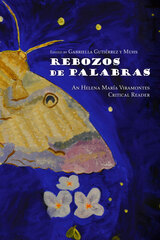 Rebozos de Palabras: An Helena María Viramontes Critical Reader
Edited by Gabriella Gutiérrez y Muhs
University of Arizona Press, 2013 Helena María Viramontes is a professor, scholar-activist, and renowned author of works of fiction and nonfiction. Her work has been anthologized and is read widely in the United States and abroad. For many of her readings and speaking engagements she arrives wearing a rebozo, a shawl worn by Mexican and Chicana women living on both sides of the US–Mexico border. Once, when asked about her rebozo, Viramontes explained that the pre-Columbian icon is her “security blanket,” which she embraces in order to find comfort. For her readers, her writing functions like a "rebozo de palabras,” a shawl woven with words that nurture.
As Gabriella Gutiérrez y Muhs points out in her insightful introduction, not only has Viramontes’s work not yet received the broad critical engagement it richly deserves, but there remains a monumental gap in the interpretations of Chicana literature that reach mainstream audiences. Rebozos de Palabras addresses this void by focusing on how the Chicana image has evolved through Viramontes’s body of work. With a foreword by Sonia Saldívar-Hull, this collection addresses Viramontes entire oeuvre through newly produced articles by major literary critics and emerging scholars who engage Viramontes’s writing from multiple perspectives.
 Rebuilding Buddhism: The Theravada Movement in Twentieth-Century Nepal
Sarah LeVine and David N. Gellner
Harvard University Press, 2007 Rebuilding Buddhism describes in evocative detail the experiences and achievements of Nepalis who have adopted Theravada Buddhism. This form of Buddhism was introduced into Nepal from Burma and Sri Lanka in the 1930s, and its adherents have struggled for recognition and acceptance ever since. With its focus on the austere figure of the monk and the biography of the historical Buddha, and more recently with its emphasis on individualizing meditation and on gender equality, Theravada Buddhism contrasts sharply with the highly ritualized Tantric Buddhism traditionally practiced in the Kathmandu Valley.
Based on extensive fieldwork, interviews, and historical reconstruction, the book provides a rich portrait of the different ways of being a Nepali Buddhist over the past seventy years. At the same time it explores the impact of the Theravada movement and what its gradual success has meant for Buddhism, for society, and for men and women in Nepal.
Rebuilding Cities and Citizens: Mass Housing in Red Vienna and Cold War Berlin
Margaret Haderer
Amsterdam University Press, 2023 In Vienna after WWI and Berlin after WWII, the provision of mass housing not only was a response to a dire social need but also served as a key lever for building variants of socialism and liberalism. Zooming into the interplay between political ideologies and the production of space, this book shows that ideologies, understood as political beliefs that underpin everyday life, are never simply ‘written’ into space but that their meaning is made and re-made, negotiated and contested, and sometimes cunningly subverted in and through space. How people live was – and continues to be – a profoundly political question that involves negotiations of, and decisions on, norms and ideals of citizenship, freedom, equality, property, democracy, gender, and family life – negotiations and decisions that come with legacies that shape the present.
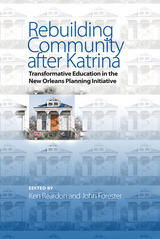 Rebuilding Community after Katrina: Transformative Education in the New Orleans Planning Initiative
Ken Reardon
Temple University Press, 2015 Rebuilding Community after Katrina chronicles the innovative and ambitious partnership between Cornell University’s City and Regional Planning department and ACORN Housing, an affiliate of what was the nation’s largest low-income community organization. These unlikely allies came together to begin to rebuild devastated neighborhoods in New Orleans after Hurricane Katrina. The editors and contributors to this volume allow participants’ voices to show how this partnership integrated careful, technical analysis with aggressive community outreach and organizing. With essays by activists, organizers, community members, and academics on the ground, Rebuilding Community after Katrina presents insights on the challenges involved in changing the way politicians and analysts imagined the future of New Orleans’ Ninth Ward. What emerges from this complex drama are lessons about community planning, organizational relationships, and team building across multi-cultural lines. The accounts presented in Rebuilding Community after Katrina raise important and sensitive questions about the appropriate roles of outsiders in community-based planning processes.
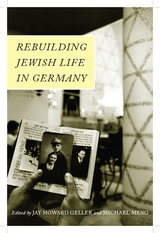 Rebuilding Jewish Life in Germany
Jay Howard Geller
Rutgers University Press, 2020 Seventy-five years after the Holocaust, 100,000 Jews live in Germany. Their community is diverse and vibrant, and their mere presence in Germany is symbolically important. In Rebuilding Jewish Life in Germany, scholars of German-Jewish history, literature, film, television, and sociology illuminate important aspects of Jewish life in Germany from 1949 to the present day. In West Germany, the development of representative bodies and research institutions reflected a desire to set down roots, despite criticism from Jewish leaders in Israel and the Diaspora. In communist East Germany, some leftist Jewish intellectuals played a prominent role in society, and their experience reflected the regime’s fraught relationship with Jewry. Since 1990, the growth of the Jewish community through immigration from the former Soviet Union and Israel have both brought heightened visibility in society and challenged preexisting notions of Jewish identity in the former “land of the perpetrators.”
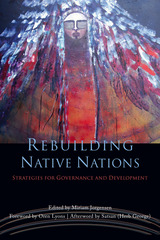 Rebuilding Native Nations: Strategies for Governance and Development
Edited by Miriam Jorgensen; Foreword by Oren Lyons; Afterword by Satsan (Herb George)
University of Arizona Press, 2007 A revolution is underway among the Indigenous nations of North America. It is a quiet revolution, largely unnoticed in society at large. But it is profoundly important. From High Plains states and Prairie Provinces to southwestern deserts, from Mississippi and Oklahoma to the northwest coast of the continent, Native peoples are reclaiming their right to govern themselves and to shape their future in their own ways. Challenging more than a century of colonial controls, they are addressing severe social problems, building sustainable economies, and reinvigorating Indigenous cultures. In effect, they are rebuilding their nations according to their own diverse and often innovative designs.
Produced by the Native Nations Institute for Leadership, Management, and Policy at the University of Arizona and the Harvard Project on American Indian Economic Development, this book traces the contours of that revolution as Native nations turn the dream of self-determination into a practical reality. Part report, part analysis, part how-to manual for Native leaders, it discusses strategies for governance and community and economic development being employed by American Indian nations and First Nations in Canada as they move to assert greater control over their own affairs.
Rebuilding Native Nations provides guidelines for creating new governance structures, rewriting constitutions, building justice systems, launching nation-owned enterprises, encouraging citizen entrepreneurs, developing new relationships with non-Native governments, and confronting the crippling legacies of colonialism. For nations that wish to join that revolution or for those who simply want to understand the transformation now underway across Indigenous North America, this book is a critical resource.
CONTENTS
Foreword by Oren Lyons
Editor's Introduction
Part 1
Starting Points
1. Two Approaches to the Development of Native Nations: One Works, the Other Doesn't
Stephen Cornell and Joseph P. Kalt
2. Development, Governance, Culture: What Are They and What Do They Have to Do with Rebuilding Native Nations?
Manley A. Begay, Jr., Stephen Cornell, Miriam Jorgensen, and Joseph P. Kalt
Part 2
Rebuilding the Foundations
3. Remaking the Tools of Governance: Colonial Legacies, Indigenous Solutions
Stephen Cornell
4. The Role of Constitutions in Native Nation Building: Laying a Firm Foundation
Joseph P. Kalt
5 . Native Nation Courts: Key Players in Nation Rebuilding
Joseph Thomas Flies-Away, Carrie Garrow, and Miriam Jorgensen
6. Getting Things Done for the Nation: The Challenge of Tribal Administration
Stephen Cornell and Miriam Jorgensen
Part 3
Reconceiving Key Functions
7. Managing the Boundary between Business and Politics: Strategies for Improving the Chances for Success in Tribally Owned Enterprises
Kenneth Grant and Jonathan Taylor
8. Citizen Entrepreneurship: An Underutilized Development Resource
Stephen Cornell, Miriam Jorgensen, Ian Wilson Record, and Joan Timeche
9. Governmental Services and Programs: Meeting Citizens' Needs
Alyce S. Adams, Andrew J. Lee, and Michael Lipsky
10. Intergovernmental Relationships: Expressions of Tribal Sovereignty
Sarah L. Hicks
Part 4
Making It Happen
11. Rebuilding Native Nations: What Do Leaders Do?
Manley A. Begay, Jr., Stephen Cornell, Miriam Jorgensen, and Nathan Pryor
12. Seizing the Future: Why Some Native Nations Do and Others Don't
Stephen Cornell, Miriam Jorgensen, Joseph P. Kalt, and Katherine Spilde Contreras
Afterword by Satsan (Herb George)
References
About the Contributors
Index
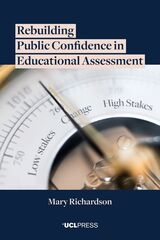 Rebuilding Public Confidence in Educational Assessment
Mary Richardson
University College London, 2022 Reassessing educational assessment: how the way we talk about exams and grades exacerbates the problems of pressure, anxiety, and expectation.
Educational assessment is important. Yet it is easy to feel that schooling and other phases of education are shaped entirely by certain assessments and that assessment is only about exam results. The idea that grades can accurately describe the aims and outcomes of education is both reductive and pervasive. This book is about the stories we tell each other about educational assessment and how they impact public trust and confidence in educational assessment. It explains the roots and nature of assessment discourses and proposes a restructuring of the debate to rebuild public confidence. It aims to challenge dominant assessment discourses and demands a more nuanced, informed debate about what happens in and beyond schools, and how this influences public thinking. Using examples from international settings to explore the nature of trust in assessment discourses, this book shows how these discourses can be reframed so that all aspects of the assessment system—policymaking, school planning, home practice with students—can be delivered with confidence.
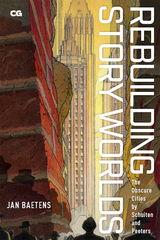 Rebuilding Story Worlds: The Obscure Cities by Schuiten and Peeters
Jan Baetens
Rutgers University Press, 2020 A collaboration between Belgian artist François Schuiten and French writer Benoît Peeters, The Obscure Cities is one of the few comics series to achieve massive popularity while remaining highly experimental in form and content. Set in a parallel world, full of architecturally distinctive city-states, The Obscure Cities also represents one of the most impressive pieces of world-building in any form of literature.
Rebuilding Story Worlds offers the first full-length study of this seminal series, exploring both the artistic traditions from which it emerges and the innovative ways it plays with genre, gender, and urban space. Comics scholar Jan Baetens examines how Schuiten’s work as an architectural designer informs the series’ concerns with the preservation of historic buildings. He also includes an original interview with Peeters, which reveals how poststructuralist critical theory influenced their construction of a rhizomatic fictional world, one which has made space for fan contributions through the Alta Plana website.
Synthesizing cutting-edge approaches from both literary and visual studies, Rebuilding Story Worlds will give readers a new appreciation for both the aesthetic ingenuity of The Obscure Cities and its nuanced conception of politics.
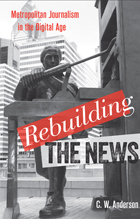 Rebuilding the News: Metropolitan Journalism in the Digital Age
C. W. Anderson
Temple University Press, 2013 Breaking down the walls of the traditional newsroom, Rebuilding the News traces the evolution of news reporting as it moves from print to online. As the business models of newspapers have collapsed, author C. W. Anderson chronicles how bloggers, citizen journalists, and social networks are implicated in the massive changes confronting journalism. Through a combination of local newsroom fieldwork, social-network analysis, and online archival research, Rebuilding the News places the current shifts in news production in socio-historical context. Focusing on the Philadelphia Inquirer, the Philadelphia Daily News, Anderson presents a gripping case study of how these papers have struggled to adapt to emerging economic, social, and technological realities. As he explores the organizational, networked culture of journalism, Anderson lays bare questions about the future of news-oriented media and its evolving relationship with “the public” in the digital age.
Rebuilding the Pulp and Paper Workers Union, 1933–1941: 1933-1941
Robert H. Zieger
University of Tennessee Press, 1984 Winner of the Philip Taft Labor History Award (New York State School of Industrial and Labor Relations at Cornell University)
This study of the pulp and paper workers' union helps explain the AFL's often limited response to worker militancy in the 1930s as well as the more institutionalized moderation that emerged from the labor upsurge. Zieger sympathetically explains the union's limited goals but steady achievements—i.e., raising wages, narrowing differentials, and organizing blacks, women, and ethnically diverse workers—without resorting to strikes.
 Rebuilding Trust: Clergy Morale in the Wake of the Abuse Crisis
Brandon Vaidyanathan
Catholic University of America Press, 2025 While much attention has rightly been given to abuse survivors and institutional accountability, less has been said about how the sexual abuse crisis has shaped the experience of clergy themselves. Drawing on findings from the National Study of Catholic Priests (NSCP)—the most comprehensive survey of American priests in over 50 years—Rebuilding Trust explores how the abuse crisis and the Church’s institutional response have affected priestly well-being and morale, perceptions of episcopal leadership, and the culture of the presbyterate more broadly. The study reveals a striking breakdown in trust between priests and their bishops, exacerbated by concerns over due process in the wake of an abuse allegation, inconsistent application of abuse prevention policies, and a widening ideological divide between younger and older clergy. The book combines sociological analysis with theological, psychological, historical, canonical, and pastoral perspectives to contextualize these findings. Contributors from various fields examine shifts in the priesthood over the past few decades, assess the implementation of the 2002 Charter for the Protection of Children and Young People (the “Dallas Charter”) and explore practical strategies for strengthening clergy formation, fostering fraternity, and improving bishop-priest relationships. By integrating empirical research with theological reflection, this volume offers a timely and necessary addition to the discussion of how the Church can rebuild trust, support priests, and cultivate a healthier presbyterate. It will be essential reading for Church leaders, seminary formators, scholars of Catholicism, and anyone concerned with the future of the priesthood in the United States.
 Recalcitrance Faulkner Professors: A Critical Fiction
Austin M. Wright
University of Iowa Press, 1990 Recalcitrance, Faulkner, and the Professors is a wonderfully fetching book of criticism that presents fairly, coherently, and forcefully the major critical viewpoints operating in literature studies today and puts them into an invigorating conflict. In the framework of a deliberately artificial plot, characters at an imaginary university present a variety of theoretical and critical points of view in a four-day round table discussion. Centering on Faulker's As I Lay Dying, the discussion has at stake the hand of Eve Birdsong, a student whose distress with the conflicts among her professors had inspired these proceedings. The cast also includes a young hero—assistant professor Charlie Mercer—professors representing a variety of contemporary critical positions, and several extraordinary students. The discussion, presented in turn by speeches, exchanges in dialogue, and short papers, focuses on the concept of recalcitrance in fiction: the resistance that texts offer to the development of formal structures. Recalcitrance, Faulkner, and the Professors is, variously, a pedagogical text, a critical theory text, and a text about a single novel. But Wright's volume breaks the rules of categorization: it refuses to sit neatly in any genre.
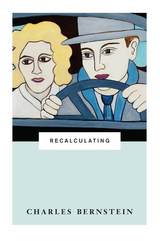 Recalculating
Charles Bernstein
University of Chicago Press, 2013 Long anticipated, Recalculating is Charles Bernstein’s first full-length collection of new poems in seven years. As a result of this lengthy time under construction, the scope, scale, and stylistic variation of the poems far surpasses Bernstein’s previous work. Together, the poems of Recalculating take readers on a journey through the history and poetics of the decades since the end of the Cold War as seen through the lens of social and personal turbulence and tragedy. The collection’s title, the now–familiar GPS expression, suggests a change in direction due to a mistaken or unexpected turn. For Bernstein, formal invention is a necessary swerve in the midst of difficulty. As in all his work since the 1970s, he makes palpable the idea that radically new structures, appropriated forms, an aversion to received ideas and conventions, political engagement, and syntactic novelty will open the doors of perception to exuberance and resonance, from giddiness to pleasure to grief. But at the same time he cautions, with typical deflationary ardor, “The pen is tinier than the sword.” In these poems, Bernstein makes good on his claim that “the poetry is not in speaking to the dead but listening to the dead.” In doing so, Recalculating incorporates translations and adaptations of Baudelaire, Cole Porter, Mandelstam, and Paul Celan, as well as several tributes to writers crucial to Bernstein’s work and a set of epigrammatic verse essays that combine poetics with wry observation, caustic satire, and aesthetic slapstick. Formally stunning and emotionally charged, Recalculating makes the familiar strange—and in a startling way, makes the strange familiar. Into these poems, brimming with sonic and rhythmic intensity, philosophical wit, and multiple personae, life events intrude, breaking down any easy distinction between artifice and the real. With works that range from elegy to comedy, conceptual to metrical, expressionist to ambient, uproarious to procedural, aphoristic to lyric, Bernstein has created a journey through the dark striated by bolts of imaginative invention and pure delight.
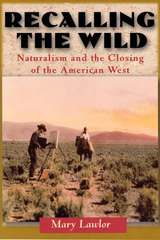 Recalling the Wild: Naturalism and the Closing of the American West
Lawlor, Mary
Rutgers University Press, 2000 Ever since the first interactions between Europeans and Native Americans, the “West” has served as a site of complex geographical, social and cultural transformation. American literature is defined, in part, by the central symbols derived from these points of contact. By the end of the nineteenth century, the Western frontier was declared “closed,” a demise solidified by Frederick Jackson Turner’s influential essay “The Significance of the Frontier in American History (1893). At the same time, “naturalism” was popularized by the writings of Frank Norris, Stephen Crane, Jack London, Willa Cather, and the photographs of Edward Curtis. Though very different artists, they were united by their common attraction to the mythic American West.
As she investigates the interactions of representations of the West, Lawlor effortlessly melds literary studies, American studies, and history. She traces the cultural conception of the American West through its incarnations in the “westernism” of Daniel Boone and James Fenimore Cooper and the romanticism of the expansive frontier they helped formulate. Simultaneously, however, the influence of evolutionism and the styles of French naturalism began to challenge this romantic idiom. This naturalistic discourse constructed the West as a strictly material place, picturing a limited and often limiting geography that portrayed regional identity as the product of material “forces” rather than of individualistic enterprise.
With subtle, probing language, Lawlor explains how literary and artistic devices helped shape the idea of the American West and the changing landscape of the continent at the turn of the last century.
Recapitulations
Thomas Prufer
Catholic University of America Press, 2018 Provides commentary on prominent philosophers on important philosophical themes. "These unusual and exquisiteessays focus on a problem or a text with extraordinary acuity".
'ReCapricorning' the Atlantic: Special Issue of Luso-Brazilian Review 45:1 (2008)
Edited by Peter M. Beattie
University of Wisconsin Press, 2010 This special issue of Luso-Brazilian Review includes articles on the Lusophone South Atlantic by historians of Africa and Brazil originally presented in May of 2006 at the Michigan State University and University of Michigan’s Atlantic History Workshop “ReCapricorning the Atlantic: Luso-Brazilian and Luso-African Perspectives on the Atlantic World.” Workshop participants set out to “ReCapricorn the Atlantic” by assessing how new research on the Lusophone South Atlantic modifies, challenges, or confirms major trends and paradigms in the expanding scholarship on Atlantic History.
 Recapturing a Homeric Legacy: Images and Insights from the Venetus A Manuscript of the Iliad
Casey Dué
Harvard University Press, 2009 Marcianus Graecus Z. 454 [= 822], known to Homeric scholars as the Venetus A, is the oldest complete text of the Iliad in existence, meticulously crafted during the tenth century ce. An impressive thousand years old and then some, its historical reach is far greater. The Venetus A preserves in its entirety a text that was composed within an oral tradition that can be shown to go back as far as the second millennium bce, and the writings in its margins preserve the scholarship of Ptolemaic scholars working in the second century bce and in the centuries following. Two thousand years later, technology offers a new opportunity to rediscover this scholarship and better understand the epic that is the foundation of Western literature. The high-resolution images of the manuscript that accompany these essays were acquired by a multinational team of scholars and conservators in May 2007.
 Recast Your City: How to Save Your Downtown with Small-Scale Manufacturing
Ilana Preuss
Island Press, 2021 Too many U.S. cities and towns have been focused on a model of economic development that relies on recruiting one big company (such as Amazon), a single industry (usually in technology), or pursuing other narrow or short-term fixes that are inequitable and unsustainable. Some cities and towns were changing, even before the historic retail collapse brought on by COVID-19. They started to shift to a new economic model that works with the community to invest in place in an inclusive and thoughtful way, with short-term wins that build momentum for long-term growth. A secret ingredient to this successful model is small-scale manufacturing.
In Recast Your City: How to Save Your Downtown with Small-Scale Manufacturing, community development expert Ilana Preuss explains how local leaders can revitalize their downtowns or neighborhood main streets by bringing in and supporting small-scale manufacturing. Small-scale manufacturing businesses help create thriving places, with local business ownership opportunities and well-paying jobs that other business types can’t fulfill.
Preuss draws from her experience working with local governments, large and small and illuminates her recommendations with real-world examples. She details her five-step method for recasting your city using small-scale manufacturing: (1) light the spark (assess what you can build on and establish goals); (2) find and connect (get out of your comfort zone and find connectors outside of your usual circles); (3) interview (talk to people and build trust); (4) analyze (look for patterns and gaps as well as what has not been said); and (5) act (identify short-term actions to help build long-term change). This work is difficult and sometimes uncomfortable, but necessary and critical for success. Preuss supports and inspires change by drawing from her work in cities from Knoxville, Tennessee, to Columbia, Missouri, to Fremont, California.
In Recast Your City, Preuss shows how communities across the country can build strong local businesses through small-scale manufacturing, reinvest in their downtowns, and create inclusive economic opportunity. Preuss provides tools that local leaders in government, business, and real estate as well as entrepreneurs and advocates in every community can use.
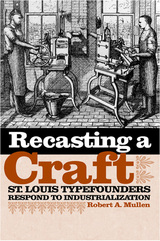 Recasting a Craft: St. Louis Typefounders Respond to Industrialization
Robert A. Mullen
Southern Illinois University Press, 2005 In the nineteenth and early twentieth centuries, type for newspapers and books was set one letter at a time, and the manufacturers of the metal type used in the printing trade were called typefounders. This prominent yet rarely documented industry was essential to the development of modern American publishing and was particularly prevalent in St. Louis. In Recasting a Craft: St. Louis Typefounders Respond to Industrialization, Robert A. Mullen recognizes the city’s significant contributions to typefounding and details how the craft fundamentally changed through mechanization, growth, and the creation of a large conglomerate. Like many trades of the nineteenth and early twentieth centuries that were eventually lost to industrialization, the typefoundries of St. Louis grew from small shops to factories with organized labor. Mullen describes three distinct periods of the industry that emerged in St. Louis’s typefounding trade: the early struggles in establishing the industry there, the period of intense competition and creative enterprise, and the proliferation of new companies that appealed to those customers who felt alienated by the monopolizing older companies. Mullen discusses at length the technological, social, and demographic foundations of the immense growth of the trade in the nineteenth century, identifying the changes in typographical design and the demand for it in the new era of advertising. He also profiles the workers, working conditions, and labor issues—such as the failed industry-wide strike of 1903—that emerged as the craft of typefounding entered the industrial age. More than two hundred type designs that originated with the St. Louis firms are listed in an appendix with examples of each face. The volume also contains a list of the catalogs of the St. Louis typefoundries known to exist in the public and academic libraries of the United States.
 Recasting Commodity and Spectacle in the Indigenous Americas
Edited by Helen Gilbert and Charlotte Gleghorn
University of London Press, 2014 Indigenous artists frequently voice concerns over the commodification of their cultures, a process acutely felt by those living with the consequences of colonialism. This timely book, which features color illustrations throughout, examines the ways in which contemporary indigenous peoples in different parts of the Americas have harnessed performance practices to resist imposed stereotypes and shape their own complex identities. Essays by leading academics and practitioners show the vibrancy of a wide array of indigenous arts and cultural events in the United States, Mexico, Peru, Bolivia, Canada, Nicaragua, Ecuador, and Belize. As well as analyzing performance idioms, the authors trace the circulation of creative products and practices as commodities, as cultural capital, and/or as heritage. Making reference to aesthetic forms, intellectual property, and political empowerment, these essays weigh the impact of music, festivities, film, photography, theater, and museum installations among diverse audiences and discuss ways in which spectacles of cultural difference are remodeled in the hands of indigenous practitioners.
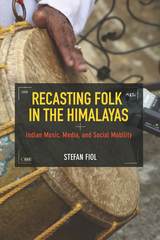 Recasting Folk in the Himalayas: Indian Music, Media, and Social Mobility
Stefan Fiol
University of Illinois Press, 2017 Colonialist, nationalist, and regionalist ideologies have profoundly influenced folk music and related musical practices among the Garhwali and Kumaoni of Uttarakhand. Stefan Fiol blends historical and ethnographic approaches to unlock these influences and explore a paradox: how the œfolk designation can alternately identify a universal stage of humanity, or denote alterity and subordination. Fiol explores the lives and work of Gahrwali artists who produce folk music. These musicians create art as both a discursive idea and as a set of expressive practices across strikingly different historical and cultural settings. Juxtaposing performance contexts in Himalayan villages with Delhi recording studios, Fiol shows how the practices have emerged within and between sites of contrasting values and expectations. Throughout, Fiol presents the varying perspectives and complex lives of the upper-caste, upper-class, male performers spearheading the processes of folklorization. But he also charts their resonance with, and collision against, the perspectives of the women and hereditary musicians most affected by the processes. Expertly observed, Recasting Folk in the Himalayas offers an engaging immersion in a little-studied musical milieu.
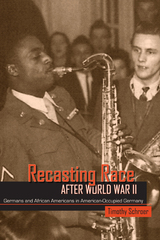 Recasting Race after World War II: Germans and African Americans in American-Occupied Germany
Timothy L. Schroer
University Press of Colorado, 2007 Historian Timothy L. Schroer's Recasting Race after World War II explores the renegotiation of race by Germans and African American GIs in post-World War II Germany. Schroer dissects the ways in which notions of blackness and whiteness became especially problematic in interactions between Germans and American soldiers serving as part of the victorious occupying army at the end of the war.
The segregation of U.S. Army forces fed a growing debate in America about whether a Jim Crow army could truly be a democratizing force in postwar Germany. Schroer follows the evolution of that debate and examines the ways in which postwar conditions necessitated reexamination of race relations. He reveals how anxiety about interracial relationships between African American men and German women united white American soldiers and the German populace. He also traces the importation and influence of African American jazz music in Germany, illuminating the subtle ways in which occupied Germany represented a crucible in which to recast the meaning of race in a post-Holocaust world.
Recasting Race after World War II will appeal to historians and scholars of American, African American, and German studies.
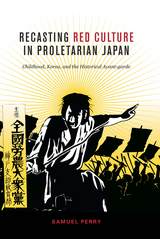 Recasting Red Culture in Proletarian Japan: Childhood, Korea, and the Historical Avant-garde
Samuel Perry
University of Hawaii Press, 2014 Recasting Red Culture turns a critical eye on the influential proletarian cultural movement that flourished in 1920s and 1930s Japan. This was a diverse, cosmopolitan, and highly contested moment in Japanese history when notions of political egalitarianism were being translated into cultural practices specific to the Japanese experience. Both a political and historiographical intervention, the book offers a fascinating account of the passions—and antimonies—that animated one of the most admirable intellectual and cultural movements of Japan’s twentieth century, and argues that proletarian literature, cultural workers, and institutions fundamentally enrich our understanding of Japanese culture.
What sustained the proletarian movement’s faith in the idea that art and literature were indispensable to the task of revolution? How did the movement manage to enlist artists, teachers, and scientist into its ranks, and what sorts of contradictions arose in the merging of working-class and bourgeois cultures? Recasting Red Culture asks these and other questions as it historicizes proletarian Japan at the intersection of bourgeois aesthetics, radical politics, and a flourishing modern print culture. Drawing parallels with the experiences of European revolutionaries, the book vividly details how cultural activists “recast” forms of modern culture into practices commensurate with the goals of revolution.
Weaving over a dozen translated fairytales, poems, and short stories into his narrative, Samuel Perry offers a fundamentally new approach to studying revolutionary culture. By examining the margins of the proletarian cultural movement, Perry effectively redefines its center as he closely reads and historicizes proletarian children’s culture, avant-garde “wall fiction,” and a literature that bears witness to Japan’s fraught relationship with its Korean colony. Along the way, he shows how proletarian culture opened up new critical spaces in the intersections of class, popular culture, childhood, gender, and ethnicity.
 Recasting the Machine Age: Henry Ford's Village Industries
Howard P. Segal
University of Massachusetts Press, 2005 Recasting the Machine Age recounts the history of Henry Ford's efforts to shift the production of Ford cars and trucks from the large-scale factories he had pioneered in the Detroit area to nineteen decentralized, small-scale plants within sixty miles of Ford headquarters in Dearborn. The visionary who had become famous in the early twentieth century for his huge and technologically advanced Highland Park and River Rouge complexes gradually changed his focus beginning in the teens and continuing until his death in 1947.
Ford may well have been motivated to spend great sums on the village industries in part to prevent the unionization of his company. But these industrial experiments represented much more than "union busting." They were significant examples of profound social, cultural, and ideological shifts in America between the World Wars as reflected in the thought and practice of one notable industrialist.
Howard P. Segal recounts the development of the plants, their fate after Ford's death, their recent revival as part of Michigan's renewed appreciation of its industrial heritage, and their connections to contemporary efforts to decentralize high-tech working and living arrangements.
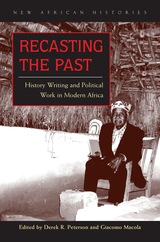 Recasting the Past: History Writing and Political Work in Modern Africa
Derek R. Peterson
Ohio University Press, 2009 The study of intellectual history in Africa is in its infancy. We know very little about what Africa’s thinkers made of their times. Recasting the Past brings one field of intellectual endeavor into view. The book takes its place alongside a small but growing literature that highlights how, in autobiographies, historical writing, fiction, and other literary genres, African writers intervened creatively in their political world. The past has already been worked over by the African interpreters that the present volume brings into view. African brokers—pastors, journalists, kingmakers, religious dissidents, politicians, entrepreneurs all—have been doing research, conducting interviews, reading archives, and presenting their results to critical audiences. Their scholarly work makes it impossible to think of African history as an inert entity awaiting the attention of professional historians. Professionals take their place in a broader field of interpretation, where Africans are already reifying, editing, and representing the past. The essays collected in Recasting the Past study the warp and weft of Africa’s homespun historical work. Contributors trace the strands of discourse from which historical entrepreneurs drew, highlighting the sources of inspiration and reference that enlivened their work. By illuminating the conventions of the past, Africa’s history writers set their contemporary constituents on a path toward a particular future. History writing was a means by which entrepreneurs conjured up constituencies, claimed legitimate authority, and mobilized people around a cause. By illuminating the spheres of debate in which Africa’s own scholars participated, Recasting the Past repositions the practice of modern history.
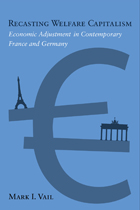 Recasting Welfare Capitalism: Economic Adjustment in Contemporary France and Germany
Mark I. Vail
Temple University Press, 2009 In Recasting Welfare Capitalism, Mark Vail employs a sophisticated and original theoretical approach to compare welfare states and political-economic adjustment in Germany and France. He examines how and why institutional change takes place and what factors characterize economic evolution when moving from times of prosperity to more austere periods and back again. Covering the 1970s to the present, Vail analyzes social and economic reforms, including labor policy, social-insurance, and anti-poverty programs. He focuses on the tactics and actions of key political players, and demolishes the stagnation argument that suggests that France and Germany have largely frozen political economies, incapable of reform.
Vail finds that these respective evolutions involve interrelated changes in social and economic policies and are characterized by political relationships that are continuously renegotiated—often in unpredictable ways. In the process, he presents a compelling reconceptualization of change in both the welfare state and the broader political economy during an age of globalization.
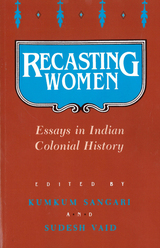 Recasting Women: Essays in Indian Colonial History
Sangari, Kumkum
Rutgers University Press, 1990 "This collection fills a very long felt need, a fact which is reinforced by the generally very high quality of the contributions and the fast-growing reputation in international feminist circles of many of the authors."--Arjun Appadurai, University of Pennsylvania
The political and social life of India in the last decade has given rise to a variety of questions concerning the nature and resilience of patriarchal systems in a transitional and post-colonial society. The contributors to this interdisciplinary volume recognize that every aspect of reality is gendered, and that such a recognition involves a dismantling of the ideological presuppositions of the so-called gender neutral ideologies, as well as the boundaries of individual disciplines.
The first set of essays seeks to analyze the patriarchal discourses of a colonial society and includes an analysis of the shaping of Hindu-Aryan identity, the parameters of the discourse on widow-immolation, the "defeminization" of popular culture in nineteenth-century urban Calcutta, the nature of the reforms proposed by early women's journals in Hindi, and the implications of the nationalist movement and of Indo-Anglian leterature on middle-class patriarchal norms.
The second set of articles relates to women of the productive classes--the reconstitution of patriarchies in the agrarian transition in Haryana, in the Oudh peasant movement, in the armed peasant struggle in Telangana, and among the working class in Bengal. The contributors explore the interrelation of patriarchies with political economy, law, religion, and culture, and suggest a different history of "reform" movements, and of class and gender relations.
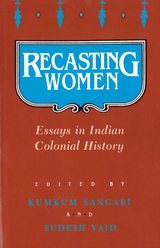 Recasting Women: Essays in Indian Colonial History
Sangari, Kumkum
Rutgers University Press, 1990 "This collection fills a very long felt need, a fact which is reinforced by the generally very high quality of the contributions and the fast-growing reputation in international feminist circles of many of the authors."--Arjun Appadurai, University of Pennsylvania
The political and social life of India in the last decade has given rise to a variety of questions concerning the nature and resilience of patriarchal systems in a transitional and post-colonial society. The contributors to this interdisciplinary volume recognize that every aspect of reality is gendered, and that such a recognition involves a dismantling of the ideological presuppositions of the so-called gender neutral ideologies, as well as the boundaries of individual disciplines.
The first set of essays seeks to analyze the patriarchal discourses of a colonial society and includes an analysis of the shaping of Hindu-Aryan identity, the parameters of the discourse on widow-immolation, the "defeminization" of popular culture in nineteenth-century urban Calcutta, the nature of the reforms proposed by early women's journals in Hindi, and the implications of the nationalist movement and of Indo-Anglian leterature on middle-class patriarchal norms.
The second set of articles relates to women of the productive classes--the reconstitution of patriarchies in the agrarian transition in Haryana, in the Oudh peasant movement, in the armed peasant struggle in Telangana, and among the working class in Bengal. The contributors explore the interrelation of patriarchies with political economy, law, religion, and culture, and suggest a different history of "reform" movements, and of class and gender relations.
Receiving the Bible in faith: historical and theological exegesis
David M. Williams
Catholic University of America Press, 2004 The book should prove helpful to students as an overview of some of the issues involved, while more advanced readers will appreciate its analysis of recent scholars as well the attempt to integrate and adapt their insights.
Recent Advances in High-Power Electromagnetics
Felix Vega
The Institution of Engineering and Technology, 2024 We live in a modern world powered by large, complex systems, including financial markets, communication networks, transportation networks, and security infrastructure. Sensitive electronics are omnipresent, making them increasingly vulnerable to high-power electromagnetic (HPEM) threats - an emerging risk capable of disrupting critical networks and the infrastructure they support. This book explores recent advances in HPEM sources, electromagnetic compatibility (EMC), strategies for protecting against intentional electromagnetic interference (IEMI) and detection and mitigation of these threats.
Recent Developments in Fisheries Economics: Special Issue of Land Economics 83:1 (February 2007)
Ussif Rashid Sumaila
University of Wisconsin Press, 2007 Articles cover a wide variety of recent topical issues in fisheries economics and the latest developments in the field, including marine protected areas, individual transferable quotas, fisheries subsidies, habitat values, data fouling, and rotational management of sedentary fishery resources. Seven of the articles were presented at the 2005 North American Association of Fisheries Economics Forum at the University of British Columbia in Vancouver, Canada.
Recent Developments in Southeastern Archaeology: From Colonization to Complexity
David G. Anderson
University Press of Colorado, 2012 This book in the SAA Press Current Perspectives Series represents a period-by-period synthesis of southeastern prehistory designed for high school and college students, avocational archaeologists, and interested members of the general public. It also serves as a basic reference for professional archaeologists worldwide on the record of a remarkable region.
 Recent Mammals of Alaska
Stephen O. MacDonald and Joseph A. Cook
University of Alaska Press, 2009 From the polar bear and the gray wolf to the walrus and river otter, there are 115 species of mammals in Alaska that have never been fully catalogued until now. Biologists Joseph A. Cook and Stephen O. MacDonald have compiled here the first comprehensive guide to all of Alaska’s mammals, big and small, endearing and ferocious.
Through extensive fieldwork and research the authors have produced a unique and authoritative reference. Detailed entries for each species include distribution and taxonomic information, status, habitat, and fossil history. Appendices include quick reference listings of mammal distribution by region, specimen locations, conservation status, and the incidence of Pleistocene mammals. The guide is generously illustrated with line drawings by Alaskan artist W. D. Berry and includes several maps indicating populations and locations of species.
Mammals of Alaska will be an accessible, easy to use source for scholars and hobbyists alike.
 Recent Studies Indicate: The Best of Sarah Bird
By Sarah Bird
University of Texas Press, 2019 When Sarah Bird arrived in Austin in 1973 in pursuit of a boyfriend who was “hotter than lava,” she found an abundance of inspiration for storytelling (her sweetheart left her for Scientology, but she got to taste a morsel of Lynda Bird Johnson’s poorly preserved wedding cake as a temp worker at the LBJ Library). Sarah Bird went on to write ten acclaimed novels and contribute hundreds of articles to publications coast to coast, developing a signature voice that combines laser-sharp insight with irreverent, wickedly funny prose in the tradition of Molly Ivins and Nora Ephron Now collecting forty of Bird’s best nonfiction pieces, from publications that range from Texas Monthly to the New York Times and others, Recent Studies Indicate presents some of Bird’s earliest work, including a prescient 1976 profile of a transgender woman, along with recent calls to political action, such as her 2017 speech at a benefit for Annie’s List. Whether Bird is hanging out with socialites and sanitation workers or paying homage to her army-nurse mom, her collection brings a poignant perspective to the experience of being a woman, a feminist, a mother, and a Texan—and a writer with countless, spectacular true tales to tell us.
Recent Trends in Sliding Mode Control
Leonid Fridman
The Institution of Engineering and Technology, 2016 In control theory, sliding mode control, or SMC, is a nonlinear control method that alters the dynamics of a nonlinear system by application of a discontinuous control signal that forces the system to 'slide' along a cross-section of the system's normal behaviour. This book describes recent advances in the theory, properties, methods and applications of SMC.
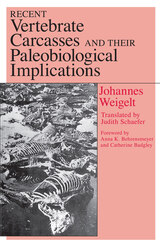 Recent Vertebrate Carcasses and Their Paleobiological Implications
Johannes Weigelt
University of Chicago Press, 1989 The first English translation of Johannes Weigelt's 1927 classic makes available the seminal work in taphonomy, the study of how organisms die, decay, become entombed in sediments, and fossilize over time. Weigelt emphasized the importance of empirical work and made extensive observations of modern carcasses on the Texas Gulf Coast. He applied the results to evidence from the fossil record and demonstrated that an understanding of the postmortem fate of modern animals is crucial to making sound inferences about fossil vertebrate assemblages and their ecological communities.
Weigelt spent sixteen months on the Gulf Coast in the mid-1920s, gathering evidence from the carcasses of cattle and other animals in the early stages of preservation. This book reports his observations. He discusses death and decomposition; classifies various modes of death (drowning, cold, dehydration, fire, mud, quicksand, oil slicks, etc.); documents and analyzes the positions of carcasses; presents detailed data on carcass assemblages at the Smither's Lake site in Texas; and, in a final chapter, makes comparisons to carcass assemblages from the geologic past. He raises questions about whether much of the fossil record is a product of unusual events and, if so, what the implications are for paleoecological studies.
The English edition of Recent Vertebrate Carcasses includes a foreword and a translator's note that comment on Weigelt's life and the significance of his work. The original bibliography has been brought up to date, and, where necessary, updated scientific and place names have been added to the text in brackets. An index of names, places, and subjects is included, and Weigelt's own photographs of carcasses and drawings of skeletons illustrate the text.
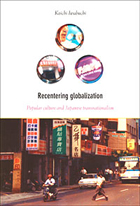 Recentering Globalization: Popular Culture and Japanese Transnationalism
Koichi Iwabuchi
Duke University Press, 2002 Globalization is usually thought of as the worldwide spread of Western—particularly American—popular culture. Yet if one nation stands out in the dissemination of pop culture in East and Southeast Asia, it is Japan. Pokémon, anime, pop music, television dramas such as Tokyo Love Story and Long Vacation—the export of Japanese media and culture is big business. In Recentering Globalization, Koichi Iwabuchi explores how Japanese popular culture circulates in Asia. He situates the rise of Japan’s cultural power in light of decentering globalization processes and demonstrates how Japan’s extensive cultural interactions with the other parts of Asia complicate its sense of being "in but above" or "similar but superior to" the region. Iwabuchi has conducted extensive interviews with producers, promoters, and consumers of popular culture in Japan and East Asia. Drawing upon this research, he analyzes Japan’s "localizing" strategy of repackaging Western pop culture for Asian consumption and the ways Japanese popular culture arouses regional cultural resonances. He considers how transnational cultural flows are experienced differently in various geographic areas by looking at bilateral cultural flows in East Asia. He shows how Japanese popular music and television dramas are promoted and understood in Taiwan, Hong Kong, and Singapore, and how "Asian" popular culture (especially Hong Kong’s) is received in Japan. Rich in empirical detail and theoretical insight, Recentering Globalization is a significant contribution to thinking about cultural globalization and transnationalism, particularly in the context of East Asian cultural studies.
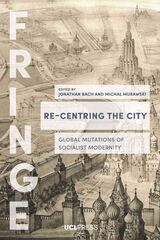 Re-Centring the City: Urban Mutations, Socialist Afterlives and the Global East
Edited by Jonathan Bach and Michal Murawski
University College London, 2019 Re-Centring the City rethinks the concept of the center in studies of the urban across the social sciences and humanities. Through cases ranging from Moscow and Berlin to Mexico City, Cairo, and Chennai, the contributions explore the tension between forces of decentering and recentering as they reshape the political, economic, and social fabric of the urban and force us to reconsider the genealogy of the contemporary global city.
By drawing our attention back to the center as an object of analytical and empirical study, this book counters a long-term trend in both planning and urban scholarship that emphasizes decentralization as the hallmark of the twenty-first-century city. It argues that such a “centrifugal” turn in urban studies is neither empirically accurate nor normatively incontestable, especially when one looks beyond the West. Rather, as the contributions to this volume show, decentering obscures the ways in which the center continues to exert a powerful influence on cities of today. The concise chapters, situated at the intersection of urban studies, social anthropology, architecture, and art theory, provide new perspectives on the role of the center in defining the city’s terrain. Together, they constitute a collection of sharp, provocative interventions into debates about the transformation of global urban forms in the twenty-first century.
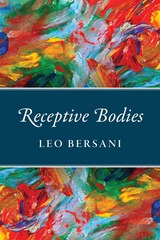 Receptive Bodies
Leo Bersani
University of Chicago Press, 2018 Leo Bersani, known for his provocative interrogations of psychoanalysis, sexuality, and the human body, centers his latest book on a surprisingly simple image: a newborn baby simultaneously crying out and drawing its first breath. These twin ideas—absorption and expulsion, the intake of physical and emotional nourishment and the exhalation of breath—form the backbone of Receptive Bodies, a thoughtful new essay collection. These titular bodies range from fetuses in utero to fully eroticized adults, all the way to celestial giants floating in space. Bersani illustrates his exploration of the body’s capacities to receive and resist what is ostensibly alien using a typically eclectic set of sources, from literary icons like Marquis de Sade to cinematic provocateurs such as Bruno Dumont and Lars von Trier. This sharp and wide-ranging book will excite scholars of Freud, Foucault, and film studies, or anyone who has ever stopped to ponder the give and take of human corporeality.
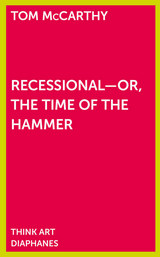 Recessional - Or, the Time of the Hammer
Tom McCarthy
Diaphanes, 2016 Modernist and contemporary literature are marked by a preoccupation with time, specifically with the passage of time characterized by starts and stops and suspended states of waiting. Acclaimed novelist Tom McCarthy brings out a temporal pattern, a subliminal convention of a certain fringe of modernism that works both in and against the canon of modernist literature in works by Thomas Pynchon, J. G. Ballard, Maurice Blanchot, Thomas Mann, Joseph Conrad, James Joyce, and William Faulkner, as well as in McCarthy’s own fiction.
The latest edition in Diaphanes’s THINK ART series, which explores the cultural and theoretical impact of artistic processes, Recessional—Or, the Time of the Hammer opens with an essay by McCarthy on recessional time as an aesthetic element and literary device. This essay is followed by an interview with McCarthy, in which he further discusses his own writing process, taking his most recent novel, Satin Island, as the starting point and casting new light on both avant-garde and realist literature.
Praise for Remainder
“An avant-garde challenge. . . . [McCarthy is] one of the great English novelists of the past ten years.”—Zadie Smith
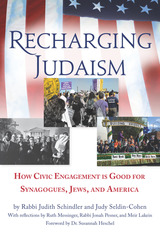 Recharging Judaism: How Civic Engagement Is Good for Synagogues, Jews, and America
Rabbi Judith Schindler
Central Conference of American Rabbis, 2018 Finalist of the 2018 National Jewish Book Award in Contemporary Jewish Life and Practice, Recharging Judaism offers a practical framework for implementing social action into our everyday lives. Using language that speaks to both those outside and inside synagogue life, the book inspires and guides Jews and Jewish institutions to address the challenges facing this country today. Recharging Judaism is the essential and timely guide for every synagogue and community seeking to strengthen the bonds of Jewish communal life through advocating for social justice. This volume delves into the enriching civic engagement and acts of righteousness already undertaken by Jews and Jewish communities across the country, and further explores the positive differences we can all affect upon the future of America. There are a myriad of ways in which advocating for social justice and participating in civic engagement can create lasting change. Those inspired to affect such change will find new meaning in the texts and history of our tradition. Using real examples from both small and large congregations across the country, Recharging Judaism offers a framework to guide us through our journey of civic responsibility and social duty and into a brighter future for our country.
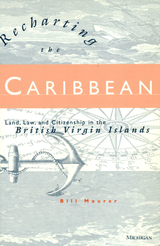 Recharting the Caribbean: Land, Law, and Citizenship in the British Virgin Islands
Bill Maurer
University of Michigan Press, 2000 If, as many cultural critics have asserted, the world is becoming more like the Caribbean, then the task of charting what we mean by "the Caribbean" is an urgent one. This careful study of the British Virgin Islands (BVI) calls attention to the ways in which ideas about nature and choice have come to justify a social order in which half the population is deemed not to belong and is denied legal rights. The BVI, one of Britain's few remaining colonial possessions, has become an important destination point for Caribbean migrants and a center for international financial services. Bill Maurer traces how the BVI came to be defined, legally and popularly, as a territorial entity, and how BVIslanders came to define themselves as a "people" sharing a "culture." He argues that law has been central to the construction of ethnic, racial, and cultural differences that create boundaries between peoples and places and that facilitate the exploitation of labor, the exclusion of people from the political process, and the globalization of capital. Recharting the Caribbean will be important reading for anthropologist, legal scholars, and historians of colonial discourse. Bill Maurer is Assistant Professor of Anthropology, University of California at Irvine.
 Re-Choreographing Cortical & Cartographic Maps: Going West to Find East. Going East to find West
Henry Daniel
Intellect Books, 2022 An autoethnographic approach to understanding the neurological process of embodied experiences.
This book is a transdisciplinary approach to practice-as-research, complete with an elaborate theory of practice and a set of four multi-year performance research projects through which the theory plays out. Its methodology is at times ethnographic, as the author deftly inserts himself and his Caribbean West African ancestry into a series of complex cortical and geographic maps, which become choreographic in every sense of the term.
The central argument in the book is based on a claim that human beings are cognitively embodied through their own lived experiences of movement through space and time; the spaces we inhabit and the practices we engage in are documented through cortical and cartographic maps. In short, as we inhabit and move through spaces our brains organize our experiences into unique cortical and spatial maps, which eventually determine how we see and deal with, or “become,” subjects in a world that we also help create. The argument is that through performance, we can claim the knowledge that is in the body as well as in the spaces through which it travels.
A Recipe for Success: Lizzie Kander and Her Cookbook
Bob Kann
Wisconsin Historical Society Press, 2007 A Recipe for Success: Lizzie Kander and her Cookbook celebrates the life of Milwaukee’s early twentieth-century culinary wonder. This new addition to the Badger Biography series will introduce young readers to a remarkable young woman who made a difference in the lives of the early immigrants in Wisconsin. Kander originally created The Settlement Cookbook to assist young Jewish immigrant girls in cooking nutritious "American-style" meals for their families. Since its publication, several generations of household cooks have been raised on the delicious recipes of the cookbook. Proceeds from the sale of the original cookbook helped build Milwaukee’s first settlement house and later the city’s Jewish Community Center. The century-old cookbook is still in print today. This is a delightful biography, filled with humorous asides, wonderful period illustrations, and of course recipes!
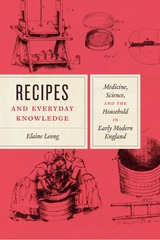 Recipes and Everyday Knowledge: Medicine, Science, and the Household in Early Modern England
Elaine Leong
University of Chicago Press, 2018 Across early modern Europe, men and women from all ranks gathered medical, culinary, and food preservation recipes from family and friends, experts and practitioners, and a wide array of printed materials. Recipes were tested, assessed, and modified by teams of householders, including masters and servants, husbands and wives, mothers and daughters, and fathers and sons. This much-sought know-how was written into notebooks of various shapes and sizes forming “treasuries for health,” each personalized to suit the whims and needs of individual communities.
In Recipes and Everyday Knowledge, Elaine Leong situates recipe knowledge and practices among larger questions of gender and cultural history, the history of the printed word, and the history of science, medicine, and technology. The production of recipes and recipe books, she argues, were at the heart of quotidian investigations of the natural world or “household science”. She shows how English homes acted as vibrant spaces for knowledge making and transmission, and explores how recipe trials allowed householders to gain deeper understandings of sickness and health, of the human body, and of natural and human-built processes. By recovering this story, Leong extends the parameters of natural inquiry and productively widens the cast of historical characters participating in and contributing to early modern science.
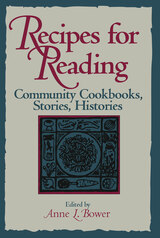 Recipes for Reading: Community Cookbooks, Stories, Histories
Anne L. Bower
University of Massachusetts Press, 1997 The community cookbook is a familiar item in many kitchens. Usually compiled by women and sold to raise funds for a charitable cause, these collections of recipes may seem to be utilitarian objects that exhibit little if any narrative interest. But this is hardly the case. In Recipes for Reading, scholars from a variety of disciplines examine community cookbooks as complex texts deserving serious study. The contributors contend that such cookbooks have stories to tell about the lives and values of the women who wrote them, stories that are autobiographical in most cases, historical in some, and fictive in others.
The volume is divided into three sections. Part One provides a historical overview of community cookbooks, a discussion of their narrative strategies, and insights into the linguistic peculiarities of recipes. Part Two contains essays about particular cookbooks and their relationship to specific cultural groups. Examined here are Methodist, Mormon, and Canadian recipe collections and a recent cookbook from the National Council of Negro Women. Part Three considers a range of community cookbooks in terms of their culinary, historical, ethnic, and literary contexts. Included is a reading of the novel Like Water for Chocolate, an analysis of an early Jewish cookbook, and a look at how Mexican history and culinary changes are paralleled in cookbooks of the nineteenth century.
 Recipes for Russia: Food and Nationhood under the Tsars
Alison K. Smith
Northern Illinois University Press, 2011 Alison K. Smith examines changing attitudes, behaviors, and beliefs about the production and consumption of food in Russia from the late 18th century through the mid 19th century. She focuses on the way that competing ideas based either in “traditional” Russian practice or in new practices from the “rational” West became the basis for Russians’ understanding of themselves and their society.
The Russians who participated in the process of self-definition were variously private authors and reformers or public servants of the Russian imperial state. Some had great success in creating a sense of themselves as ultimate authorities on a given topic. For example, a series of cookbook authors developed a system of writing Russian cookbooks in ways that borrowed from, but were still quite different from, foreign sources. Others found the process of mediating these ideas more difficult; agricultural reformers, in particular, sometimes found traditional practices, now deemed irrational, hard to eliminate. Recipes for Russia looks at the process of nation building within the framework of the modern world—that is, it looks at the way individuals sought to define their nationality not only against outside influences but also by incorporating those outside influences into some coherent, yet national, whole.
While Smith looks at food as part of Russian culture, she also connects it with the social, legal, and economic background that formed the culture, while examining the pre-reform period in significant detail. As a result, Recipes for Russia illuminates the great changes of this period, both in the food habits of Russians and in their views of themselves and of their nation.
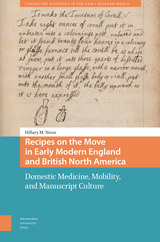 Recipes on the Move in Early Modern England and British North America: Domestic Medicine, Mobility, and Manuscript Culture
Hillary Nunn
Amsterdam University Press, 2025 Using feminist and ecocritical approaches alongside recent historical work on early modern trade and commerce, this volume focuses on early modern manuscripts whose travels can be traced from one location to another. It illustrates how recipes came to blend newly encountered ingredients and practices with long-established healthcare methods. In the process, it offers attention to both the English countryside and the American colonies to expand what is often a London-centered view of English healthcare. Tracing the circulation of women's domestic knowledge and considering the availability of ingredients, this work shows how mobility brought new methods and materials to home healthcare, which in turn influenced how women and their families envisioned their relationships to their environment, their bodies, and their nation.
 Recipes on the Move in Early Modern England and British North America: Domestic Medicine, Mobility, and Manuscript Culture
Hillary Nunn
Amsterdam University Press, 2025 Using feminist and ecocritical approaches alongside recent historical work on early modern trade and commerce, this volume focuses on early modern manuscripts whose travels can be traced from one location to another. It illustrates how recipes came to blend newly encountered ingredients and practices with long-established healthcare methods. In the process, it offers attention to both the English countryside and the American colonies to expand what is often a London-centered view of English healthcare. Tracing the circulation of women's domestic knowledge and considering the availability of ingredients, this work shows how mobility brought new methods and materials to home healthcare, which in turn influenced how women and their families envisioned their relationships to their environment, their bodies, and their nation.
Reciprocity
Lawrence C. Becker
University of Chicago Press, 1990 "Reciprocity is an exciting book—it forces its readers to rethink some important issues in recent moral philosophy."—Ruth Anna Putnam, Ethics
"By reciprocity Becker understands a complex disposition to make suitable return for the benefit we receive from others, to resist the harm others inflict on us rather than retaliate for it, and to make restitution for the harm we ourselves cause. . . . This is a clearly written book which makes fresh contributions to a number of topics."—A. D. M. Walker, Philosophical Books
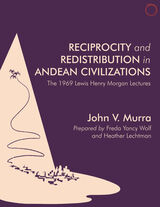 Reciprocity and Redistribution in Andean Civilizations: The 1969 Lewis Henry Morgan Lectures
John V. Murra
HAU, 2017 John V. Murra’s Lewis Henry Morgan Lectures, originally given in 1969, are the only major study of the Andean “avenue towards civilization.” Collected and published for the first time here, they offer a powerful and insistent perspective on the Andean region as one of the few places in which a so-called “pristine civilization” developed. Murra sheds light not only on the way civilization was achieved here—which followed a fundamentally different process than that of Mesopotamia and Mesoamerica—he uses that study to shed new light on the general problems of achieving civilization in any world region.
Murra intermixes a study of Andean ecology with an exploration of the ideal of economic self-sufficiency, stressing two foundational socioeconomic forces: reciprocity and redistribution. He shows how both enabled Andean communities to realize direct control of a maximum number of vertically ordered ecological floors and the resources they offered. He famously called this arrangement a “vertical archipelago,” a revolutionary model that is still examined and debated almost fifty years after it was first presented in these lecture. Written in a crisp and elegant style and inspired by decades of ethnographic fieldwork, this set of lectures is nothing less than a lost classic, and it will be sure to inspire new generations of anthropologists and historians working in South America and beyond.
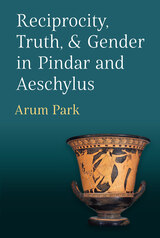 Reciprocity, Truth, and Gender in Pindar and Aeschylus
Arum Park
University of Michigan Press, 2023 In Reciprocity, Truth, and Gender in Pindar and Aeschylus, author Arum Park explores two notoriously difficult ancient Greek poets and seeks to articulate the complex relationship between them. Although Pindar and Aeschylus were contemporaries, previous scholarship has often treated them as representatives of contrasting worldviews. Park’s comparative study offers the alternative perspective of understanding them as complements instead. By examining these poets together through the concepts of reciprocity, truth, and gender, this book establishes a relationship between Pindar and Aeschylus that challenges previous conceptions of their dissimilarity. The book accomplishes three aims: first, it shows that Pindar and Aeschylus frame their poetry using similar principles of reciprocity; second, it demonstrates that each poet depicts truth in a way that is specific to those reciprocity principles; and finally, it illustrates how their depictions of gender are shaped by this intertwining of truth and reciprocity. By demonstrating their complementarity, the book situates Pindar and Aeschylus in the same poetic ecosystem, which has implications for how we understand ancient Greek poetry more broadly: using Pindar and Aeschylus as case studies, the book provides a window into their dynamic and interactive poetic world, a world in which ostensibly dissimilar poets and genres actually have much more in common than we might think.
 Recitational Permutations of the Saunakiya Atharvaveda
Madhav M. Deshpande
Harvard University Press This is a critical edition of the Kramapatha and Jatapatha forms of recitational permutations of several sections of the Saunakiya Atharvaveda available in six rare manuscripts found in Pune, India. Such recitational variations for the Atharvaveda are no longer available in the surviving oral tradition in India, and hence the texts, critically edited here, provide rare access to these materials. Some of these recitational variations are defined in the ancient text, Saunakiya Caturadhyayika, which was recently published in a critical edition in Harvard Oriental Studies (vol. 52, 1997).
The texts offered here allow scholars to compare the recitational tradition of the Atharvaveda with those of other Vedas, which are still available in the surviving oral tradition. The edition has a detailed introduction that investigates the historical origins, development, and significance of these recitational permutations.
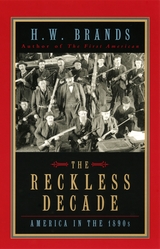 The Reckless Decade: America in the 1890s
H.W. Brands
University of Chicago Press, 2002 A rousing history that Douglas Brinkley called "the most accessible survey of America's turbulent 1890s ever composed"
Just as we do today, Americans of the 1890s faced changes in economics, politics, society, and technology that led to wrenching and sometimes violent tensions between rich and poor, capital and labor, white and black, East and West. In The Reckless Decade, H. W. Brands demonstrates that we can learn a lot about the contradictions that lie at the heart of America today by looking at them through the lens of the 1890s.
The 1890s saw the closing of the American frontier and a shift toward imperialist ambitions. Populists and muckrakers grappled with robber barons and gold-bugs. Americans addressed the unfinished business of Reconstruction by separating blacks and whites. Booker T. Washington, W. E. B. Du Bois, and other black leaders clashed over the proper response to continuing racial inequality. Those on top of the economic heap—Rockefeller, Carnegie, and Morgan—created vast empires of wealth, while those at the bottom worked for dimes a day. Brands brings all this to life in a vivid narrative filled with larger-than-life characters facing momentous challenges as they worked toward an uncertain future.
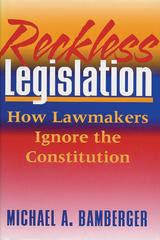 Reckless Legislation: How Legislators Ignore the Consitution
Bamberger, Michael A.
Rutgers University Press, 1999 Article 6 of the U.S. Constitution requires that every U.S. Senator and Representative, as well as all members of any state legislature, take an oath or affirmation to support the Constitution. Legislators, after all, must accept the basic principles embodied in the Constitution and Bill of Rights when interpreting questions of law. The only way to change these principles is through amendments to the Constitution. But in an increasing number of cases, contends Michael A, Bamberger, our legislators are knowingly abdicating their responsibility to uphold the Constitution. Instead of considering the constitutionality of legislation, they vote for what is politically expedient and popular, leaving it to the courts to determine the legality of their actions. Bamberger argues that legislators have a duty to consider constitutionality and not “pass the buck” to the judiciary regardless of political pressures or even well-meaning intentions to achieve desirable policy objectives. Reckless Legislation examines legislative consideration and avoidance of issues of constitutionality through a number of examples: the regulation of the Internet by Congress and two state legislatures; the reliance by legislatures of Minneapolis, Indianapolis, and Tennessee on “experts” to justify passage of unconstitutional laws; the repeated passage of unconstitutional laws in New York and Missouri relating, respectively, to religion and abortion to wear down the courts and the opposition; and the efforts by Congress to reverse Supreme Court decisions believed by it to be incorrect or harmful. Bamberger urges legislators to avoid the political motives that lead to “reckless legislation,” recommending that they “make full use of the full panoply of available support services . . . for a better and deeper knowledge of the issues raised.”
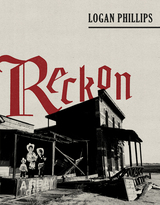 Reckon
Logan Phillips
University of Arizona Press, 2026 What’s it like to have been born in Tombstone, Arizona?
In Reckon, artist Logan Phillips returns to the fabled town to face the history he was raised on as a boy—gunfights, outlaws, and Hollywood cowboys—for a new, personal confrontation with the West’s foundational mythology. This hybrid memoir also explores sexuality, masculinity, parenting, and what it means to love a land rife with contradiction and “slathered in murder.”
As innovative as it is moving, this memoir is constructed of essays, photography, poetry, newspaper clippings from the Tombstone Epitaph Local Edition, and of course, movie screenplays. As he writes the characters of his past––including Youngfather and Teenme––Phillips finds the real history to be much more complex than the stories he was told. This is Tombstone in the 1980s and 90s, a century after the West’s most famous gunfight––a fifteen-second event still performed every day in historical reenactments––where Phillips’s father works as a historical exhibit designer at the Courthouse Museum and his uncle as a stuntman at Old Tucson Studios.
With an original, searing voice, Reckon is an essential answer to the tough questions of past and future, inheritance and reinvention, all from the perspective of a boy stuck in the middle.
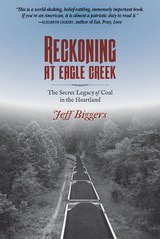 Reckoning at Eagle Creek: The Secret Legacy of Coal in the Heartland
Jeff Biggers
Southern Illinois University Press, 2010 Set in the ruins of his family’s strip-mined homestead in the Shawnee National Forest in southern Illinois, award-winning journalist and historian Jeff Biggers delivers a deeply personal portrait of the overlooked human and environmental costs of our nation’s dirty energy policy. Beginning with the policies of Thomas Jefferson and Andrew Jackson, chronicling the removal of Native Americans and the hidden story of legally sanctioned black slavery in the land of Lincoln, Reckoning at Eagle Creek vividly describes the mining wars for union recognition and workplace safety, and the devastating consequences of industrial strip-mining. At the heart of our national debate over climate change and the crucial transition toward clean energy, Biggers exposes the fallacy of “clean coal” and shatters the marketing myth that southern Illinois represents the “Saudi Arabia of coal.” Reckoning at Eagle Creek is ultimately an exposé of “historicide,” one that traces coal’s harrowing legacy through the great American family saga of sacrifice and resiliency and the extraordinary process of recovering our nation’s memory.
 Reckoning Day: Race, Place, and the Atom Bomb in Postwar America
Jacqueline Foertsch
Vanderbilt University Press, 2013 Too often lost in our understanding of the American Cold War crisis, with its nuclear brinkmanship and global political chess game, is the simultaneous crisis on the nation's racial front. Reckoning Day is the first book to examine the relationship of African Americans to the atom bomb in postwar America. It tells the wide-ranging story of African Americans' response to the atomic threat in the postwar period. It examines the anti-nuclear writing and activism of major figures such as W.E.B. Du Bois, Dr. Martin Luther King Jr., and Lorraine Hansberry as well as the placement (or absence) of black characters in white-authored doomsday fiction and nonfiction. Author Jacqueline Foertsch analyzes the work of African American thinkers, activists, writers, journalists, filmmakers, and musical performers in the "atomic" decades of 1945 to 1965 and beyond. Her book tells the dynamic story of commitment and interdependence, as these major figures spoke with force and eloquence for nuclear disarmament, just as they argued unstintingly for racial equality on numerous other occasions.
Foertsch also examines the location of African American characters in novels, science fiction, and survivalist nonfiction such as government-sponsored forecasts regarding post-nuclear survival. In these, black characters are often displaced or absented entirely: in doomsday narratives they are excluded from executive decision-making and the stories' often triumphant conclusions; in the nonfiction, they are rarely envisioned amongst the "typical American" survivors charged with rebuilding US society. Throughout Reckoning Day, issues of placement and positioning provide the conceptual framework: abandoned at "ground zero" (America's inner cities) during the height of the atomic threat, African Americans were figured in white-authored survival fiction as compliant servants aiding white victory over atomic adversity, while as historical figures they were often perceived as "elsewhere" (indifferent) to the atomic threat. In fact, African Americans' "position" on the bomb was rarely one of silence or indifference. Ranging from appreciation to disdain to vigorous opposition, atomic-era African Americans developed diverse and meaningful positions on the bomb and made essential contributions to a remarkably American dialogue.
 The Reckoning of Jeanne d'Antietam: Poems
Matthew Moore
University of Nevada Press, 2023 The collection of poems in The Reckoning of Jeanne d’Antietam circles the U.S. Civil War and the failed revolution of Reconstruction, and Matthew Moore makes incursions into the histories and beliefs of the era through architectures of sound, but also via ancillary histories and histories stacked upon histories—densely and visibly scrawled—like Anselm Kiefer's sculptures of lead books, melted and dripping with the texts of illegible songs. His poems include the figure of Joan of Arc (Jeanne d'Arc) and her voices; the explosion of the U.S. prison system and racial legal fictions amid the groundswell of mass terror in the wake of the U.S. Civil War; the politically poisoned poetic lineage that moves from Modernism, to New Criticism, and dead-ends in Southern Agrarianism; and the destructive colonial histories of the sugar and cotton industries.
The Reckoning of Jeanne d’Antietam stands imbricated with the spell of language-the-testament; language as hard rhyme and difficult music, evanescence and violence; and the invocation of names and events at their meeting places in history. Moore’s poems stand against sentiment and pity, and against the consolation of that which cannot be consoled.
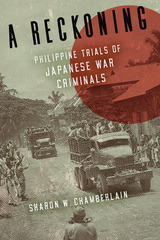 A Reckoning: Philippine Trials of Japanese War Criminals
Sharon W. Chamberlain
University of Wisconsin Press, 2019 After World War II, thousands of Japanese throughout Asia were put on trial for war crimes. Examination of postwar trials is now a thriving area of research, but Sharon W. Chamberlain is the first to offer an authoritative assessment of the legal proceedings convened in the Philippines. These were trials conducted by Asians, not Western powers, and centered on the abuses suffered by local inhabitants rather than by prisoners of war. Her impressively researched work reveals the challenges faced by the Philippines, as a newly independent nation, in navigating issues of justice amid domestic and international pressures.
Chamberlain highlights the differing views of Filipinos and Japanese about the trials. The Philippine government aimed to show its commitment to impartial proceedings with just outcomes. In Japan, it appeared that defendants were selected arbitrarily, judges and prosecutors were biased, and lower-ranking soldiers were punished for crimes ordered by their superior officers. She analyzes the broader implications of this divergence as bilateral relations between the two nations evolved and contends that these competing narratives were reimagined in a way that, paradoxically, aided a path toward postwar reconciliation.
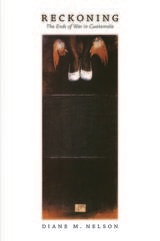 Reckoning: The Ends of War in Guatemala
Diane M. Nelson
Duke University Press, 2009 Following the 1996 treaty ending decades of civil war, how are Guatemalans reckoning with genocide, especially since almost everyone contributed in some way to the violence? Meaning “to count, figure up” and “to settle rewards and punishments,” reckoning promises accounting and accountability. Yet as Diane M. Nelson shows, the means by which the war was waged, especially as they related to race and gender, unsettled the very premises of knowing and being. Symptomatic are the stories of duplicity pervasive in postwar Guatemala, as the left, the Mayan people, and the state were each said to have “two faces.” Drawing on more than twenty years of research in Guatemala, Nelson explores how postwar struggles to reckon with traumatic experience illuminate the assumptions of identity more generally. Nelson brings together stories of human rights activism, Mayan identity struggles, coerced participation in massacres, and popular entertainment—including traditional dances, horror films, and carnivals—with analyses of mass-grave exhumations, official apologies, and reparations. She discusses the stereotype of the Two-Faced Indian as colonial discourse revivified by anti-guerrilla counterinsurgency and by the claims of duplicity leveled against the Nobel laureate Rigoberta Menchú, and she explores how duplicity may in turn function as a survival strategy for some. Nelson examines suspicions that state power is also two-faced, from the left’s fears of a clandestine para-state behind the democratic façade, to the right’s conviction that NGOs threaten Guatemalan sovereignty. Her comparison of antimalaria and antisubversive campaigns suggests biopolitical ways that the state is two-faced, simultaneously giving and taking life. Reckoning is a view from the ground up of how Guatemalans are finding creative ways forward, turning ledger books, technoscience, and even gory horror movies into tools for making sense of violence, loss, and the future.
 The Reckoning: The Murder of Christopher Marlowe
Charles Nicholl
University of Chicago Press, 1995 In 1593 the brilliant but controversial young playwright Christopher Marlowe was stabbed to death in a Deptford lodging house. The circumstances were shady, the official account—a violent quarrel over the bill, or "recknynge"—has been long regarded as dubious.
Here, in a tour de force of scholarship and ingenuity, Charles Nicholl penetrates four centuries of obscurity to reveal not only a complex and unsettling story of entrapment and betrayal, chimerical plot and sordid felonies, but also a fascinating vision of the underside of the Elizabethan world.
"Provides the sheer enjoyment of fiction, and might just be true."—Michael Kenney, Boston Globe
"Mr. Nicholl's glittering reconstruction of Marlowe's murder is only one of the many fascinating aspects of this book. Indeed, The Reckoning is equally compelling for its masterly evocation of a vanished world, a world of Elizabethan scholars, poets, con men, alchemists and spies, a world of Machiavellian malice, intrigue and dissent."—Michiko Kakutani, New York Times
"The rich substance of the book is his detail, the thick texture of betrayal and evasion which was Marlowe's life."—Thomas Flanagan, Washington Post Book World
Winner of the Crime Writer's Gold Dagger Award for Nonfiction Thriller
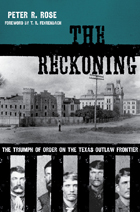 The Reckoning: The Triumph of Order on the Texas Outlaw Frontier
Peter R. Rose, with foreword by T. R. Fehrenbach
Texas Tech University Press, 2012 Isolated by geology and passed over by development, the vast, waterless tablelands of the Edwards Plateau of Texas became the stage for one of the great nineteenth-century dramas of western justice. In 1873, opportunistic Anglo-Celtic cattlemen and homesteaders, protected by little other than personal firearms and their own bravado, began settling the stream-laced rangelands east of the plateau. An insidious criminal element soon followed: a family-based tribal confederation of frontier outlaws took root in the canyonlands around the forks of the Llano River, in unorganized and lawless Kimble County. Sometimes disguised as Indians, they preyed on neighbors, northbound trail herds, and stockmen in adjacent counties. They robbed stagecoaches repeatedly. They traded in border markets alongside Mexican Indian raiders, and may have participated in the brutal Dowdy massacre of 1878.Outnumbering and intimidating law-abiding settlers, the confederation took over the nascent Kimble County government in 1876. Only dogged persistence by Texas Rangers, with increasing support from citizens and local law officers, would stem the tide. Meticulously researched and documented, The Reckoning examines all the players. Rose shows frontier West Texas as it really was: a raw, lawless, unforgiving place and time that yielded only stubbornly to Order and its handmaiden, the Rule of Law.
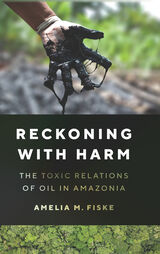 Reckoning with Harm: The Toxic Relations of Oil in Amazonia
Amelia Fiske
University of Texas Press, 2023 An ethnography of the Ecuadorian Amazon that demonstrates the need for a relational, place-based, contingent understanding of harm and toxicity. Reckoning with Harm is a striking ethnographic analysis of the harm resulting from oil extraction. Covering fifty years of settler colonization and industrial transformation of the Ecuadorian Amazon, Amelia Fiske interrogates the relations of harm. She moves between forest-courtrooms and oily waste pits, farms and toxic tours, to explore both the ways in which harm from oil is entangled with daily life and the tensions surrounding efforts to verify and redress it in practice. Attempts to address harm from the oil industry in Ecuador have been consistently confounded by narrow, technocratic understandings of evidence, toxicity, and responsibility. Building on collaborators’ work to contest state and oil company insistence that harm is controlled and principally chemical in nature, Fiske shows that it is necessary to refigure harm as relational in order to reckon with unremediated contamination of the past while pushing for broad forms of accountability in the present. She theorizes that harm is both a relationship and an animating feature of relationships in this place, a contingent understanding that is needed to contemplate what comes next when living in a toxic world.
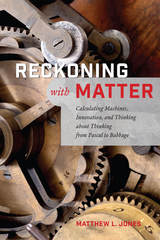 Reckoning with Matter: Calculating Machines, Innovation, and Thinking about Thinking from Pascal to Babbage
Matthew L. Jones
University of Chicago Press, 2016 From Blaise Pascal in the 1600s to Charles Babbage in the first half of the nineteenth century, inventors struggled to create the first calculating machines. All failed—but that does not mean we cannot learn from the trail of ideas, correspondence, machines, and arguments they left behind.
In Reckoning with Matter, Matthew L. Jones draws on the remarkably extensive and well-preserved records of the quest to explore the concrete processes involved in imagining, elaborating, testing, and building calculating machines. He explores the writings of philosophers, engineers, and craftspeople, showing how they thought about technical novelty, their distinctive areas of expertise, and ways they could coordinate their efforts. In doing so, Jones argues that the conceptions of creativity and making they exhibited are often more incisive—and more honest—than those that dominate our current legal, political, and aesthetic culture.
 Reckoning with Millet's "Man with a Hoe," 1863–1900
Scott Allan
J. Paul Getty Trust, The, 2023 A revelatory exploration of one of Jean-François Millet’s most contentious paintings.
A monumentalizing portrayal of a peasant bowed over by brutal toil, Man with a Hoe (1860–62) by Jean-François Millet (1814–1875) is arguably the most art historically significant painting in the J. Paul Getty Museum’s collection of nineteenth-century European art. This volume situates the work in the arc of Millet’s career and traces its fascinating and contentious reception, from its scandalous debut at the 1863 Paris Salon to the years following its acquisition by American collectors in the 1890s. The essays examine the painting’s tumultuous public life, beginning in France, where critics attacked it on aesthetic and political grounds as a radical realist provocation; through its transformative movement in the art market during the remaining years of the artist’s life and following his death; to its highly publicized arrival in California as a celebrated masterpiece. In the United States it was enlisted to serve philanthropic interests, became the subject of a popular poem, and once again became embroiled in controversy, in this case one that was strongly inflected by American racial politics. This is the first publication dedicated to the work since its acquisition by the Getty Museum in 1985.
This volume is published to accompany an exhibition on view at the J. Paul Getty Museum at the Getty Center from September 12 to December 10, 2023.
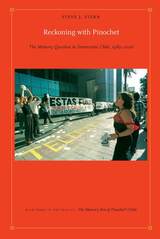 Reckoning with Pinochet: The Memory Question in Democratic Chile, 1989–2006
Steve J. Stern
Duke University Press, 2010 Reckoning with Pinochet is the first comprehensive account of how Chile came to terms with General Augusto Pinochet’s legacy of human rights atrocities. An icon among Latin America’s “dirty war” dictators, Pinochet had ruled with extreme violence while building a loyal social base. Hero to some and criminal to others, the general cast a long shadow over Chile’s future. Steve J. Stern recounts the full history of Chile’s democratic reckoning, from the negotiations in 1989 to chart a post-dictatorship transition; through Pinochet’s arrest in London in 1998; the thirtieth anniversary, in 2003, of the coup that overthrew President Salvador Allende; and Pinochet’s death in 2006. He shows how transnational events and networks shaped Chile’s battles over memory, and how the Chilean case contributed to shifts in the world culture of human rights. Stern’s analysis integrates policymaking by elites, grassroots efforts by human rights victims and activists, and inside accounts of the truth commissions and courts where top-down and bottom-up initiatives met. Interpreting solemn presidential speeches, raucous street protests, interviews, journalism, humor, cinema, and other sources, he describes the slow, imperfect, but surprisingly forceful advance of efforts to revive democratic values through public memory struggles, despite the power still wielded by the military and a conservative social base including the investor class. Over time, resourceful civil-society activists and select state actors won hard-fought, if limited, gains. As a result, Chileans were able to face the unwelcome past more honestly, launch the world’s first truth commission to examine torture, ensnare high-level perpetrators in the web of criminal justice, and build a public culture of human rights. Stern provides an important conceptualization of collective memory in the wake of national trauma in this magisterial work of history.
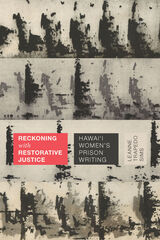 Reckoning with Restorative Justice: Hawai'i Women's Prison Writing
Leanne Trapedo Sims
Duke University Press, 2023 In Reckoning with Restorative Justice, Leanne Trapedo Sims explores the experiences of women who are incarcerated at the Women’s Community Correctional Center, the only women’s prison in the state of Hawai‘i. Adopting a decolonial and pro-abolitionist lens, she focuses particularly on women’s participation in the Kailua Prison Writing Project and its accompanying Prison Monologues program. Trapedo Sims argues that while the writing project served as a vital resource for the inside women, it also remained deeply embedded within carceral logics at the institutional, state, and federal levels. She foregrounds different aspects of these programs, such as the classroom spaces and the dynamics that emerged between performers and audiences in the Prison Monologues. Blending ethnography, literary studies, psychological analysis, and criminal justice critique, Trapedo Sims centers the often-overlooked stories of incarcerated Native Hawaiian and Pacific Islander women in Hawai‘i in ways that resound with the broader American narrative: the disproportionate incarceration of people of color in the prison-industrial complex.
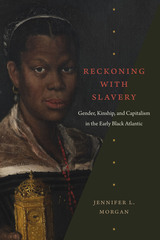 Reckoning with Slavery: Gender, Kinship, and Capitalism in the Early Black Atlantic
Jennifer L. Morgan
Duke University Press, 2021 In Reckoning with Slavery Jennifer L. Morgan draws on the lived experiences of enslaved African women in the sixteenth and seventeenth centuries to reveal the contours of early modern notions of trade, race, and commodification in the Black Atlantic. From capture to transport to sale to childbirth, these women were demographically counted as commodities during the Middle Passage, vulnerable to rape, separated from their kin at slave markets, and subject to laws that enslaved their children upon birth. In this way, they were central to the binding of reproductive labor with kinship, racial hierarchy, and the economics of slavery. Throughout this groundbreaking study, Morgan demonstrates that the development of Western notions of value and race occurred simultaneously. In so doing, she illustrates how racial capitalism denied the enslaved their kinship and affective ties while simultaneously relying on kinship to reproduce and enforce slavery through enslaved female bodies.
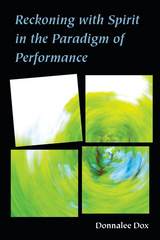 Reckoning with Spirit in the Paradigm of Performance
Donnalee Dox
University of Michigan Press, 2016 Performance has become a paradigm for analyzing contemporary culture, a pattern that structures a particular view of human interaction and experience. Performance is also widely used to better understand how we express values and ideas, including religious beliefs. Reckoning with Spirit in the Paradigm of Performance asks how the sensibilities of religious experience, which many people call spirituality, shape people's performance. When we observe people performing words, dances, music, and rituals they consider sacred, what (if any) conclusions can we draw about their experiences from what we see, read, and hear? By analyzing performances of spirituality and what people experience as "spirit," this book adds a new dimension to the paradigm of performance. Rather than reducing the spiritual dimension to either biology or culture, the book asks what such experiences might have to offer a reasoned analysis of vernacular culture. The specific performances presented are meditative dance and shamanic drumming, including descriptions of these practices and exegesis of practitioners' writings on the nature of spiritual experience and performance.
 Reckoning with the World: South Korean Television and the Latin American Imaginary
Benjamin M. Han
Temple University Press, 2026 For many Koreans, Latin America is foreign and unfamiliar, but popular television shows have generated considerable interest in this region of the Global South. In Reckoning with the World, Benjamin Han explores this phenomenon by providing a close reading of Korean TV programs that take place, are shot in, or depict Latin America. These dramas, reality shows, and travel documentaries present South Koreans with an understanding of themselves by projecting an illusion of difference that underscores themes of identity, race, and modernity.
Historical dramas like The Land of Humans, about Korean migrants in Mexico, consider diasporic identity and nationalism, while the fantasy series Secret Garden explores issues of modernity. In addition, the TV drama Encounter and the entertainment show Traveler contrast the cultures of global Korea with Cuba. As these programs create appealing storytelling, characters, and aesthetics, they inspire and resonate with audiences and fans across the globe. However, Korean television’s imaginary of Latin America is not about its investment in fostering greater interculturality with Latin American nations and their cultures but instead projects a façade of progressive racial and cultural politics shaping Korea’s reckoning with the world.
Reclaimed Powers: Men and Women in Later Life
David Gutmann
Northwestern University Press, 1994 A unique feature of human development is that mothers and fathers are bound to a long period of childrearing, during which the continuity of our species depends on the fulfillment of distinct parental roles and on the suppression of psychological potentials that conflict with those roles. But once the "parental emergency" is over, David Gutmann argues, men and women can assert those parts of themselves curbed by the restrictions of raising children. It is this shift in roles--a product of evolution found throughout our species--that led David Gutmann to propose a new psychology of aging, based not on the prospect of loss but on the promise of important new pleasures and capacities.
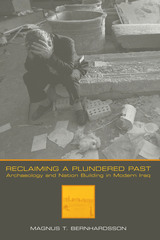 Reclaiming a Plundered Past: Archaeology and Nation Building in Modern Iraq
By Magnus T. Bernhardsson
University of Texas Press, 2006 The looting of the Iraqi National Museum in April of 2003 provoked a world outcry at the loss of artifacts regarded as part of humanity's shared cultural patrimony. But though the losses were unprecedented in scale, the museum looting was hardly the first time that Iraqi heirlooms had been plundered or put to political uses. From the beginning of archaeology as a modern science in the nineteenth century, Europeans excavated and appropriated Iraqi antiquities as relics of the birth of Western civilization. Since Iraq was created in 1921, the modern state has used archaeology to forge a connection to the ancient civilizations of Mesopotamia and/or Islamic empires and so build a sense of nationhood among Iraqis of differing religious traditions and ethnicities. This book delves into the ways that archaeology and politics intertwined in Iraq during the British Mandate and the first years of nationhood before World War II. Magnus Bernhardsson begins with the work of British archaeologists who conducted extensive excavations in Iraq and sent their finds to the museums of Europe. He then traces how Iraqis' growing sense of nationhood led them to confront the British over antiquities law and the division of archaeological finds between Iraq and foreign excavators. He shows how Iraq's control over its archaeological patrimony was directly tied to the balance of political power and how it increased as power shifted to the Iraqi government. Finally he examines how Iraqi leaders, including Saddam Hussein, have used archaeology and history to legitimize the state and its political actions.
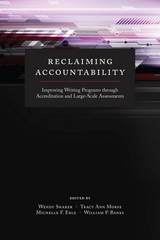 Reclaiming Accountability: Improving Writing Programs through Accreditation and Large-Scale Assessments
Wendy Sharer
Utah State University Press, 2016 Reclaiming Accountability brings together a series of critical case studies of writing programs that have planned, implemented, and/or assessed the impact of large-scale accreditation-supported initiatives. The book reimagines accreditation as a way to leverage institutional or programmatic change. Contributions to the volume are divided into three parts. Part 1 considers how specialists in composition and rhetoric can work most productively with accrediting bodies to design assessments and initiatives that meet requirements while also helping those agencies to better understand how writing develops and how it can most effectively be assessed. Parts 2 and 3 present case studies of how institutions have used ongoing accreditation and assessment imperatives to meet student learning needs through programmatic changes and faculty development. They provide concrete examples of productive curricular (part 2) and instructional (part 3) changes that can follow from accreditation mandates while providing guidance for navigating challenges and pitfalls that WPAs may encounter within shifting and often volatile local, regional, and national contexts. In addition to providing examples of how others in the profession might approach such work, Reclaiming Accountability addresses assessment requirements beyond those in the writing program itself. It will be of interest to department heads, administrators, writing program directors, and those involved with writing teacher education, among others.
Contributors: Linda Adler-Kassner, William P. Banks, Remica Bingham-Risher, Melanie Burdick, Polina Chemishanova, Malkiel Choseed, Kyle Christiansen, Angela Crow, Maggie Debelius, Michelle F. Eble, Jonathan Elmore, Lorna Gonzalez, Angela Green, Jim Henry, Ryan Hoover, Rebecca Ingalls, Cynthia Miecznikowski, Susan Miller-Cochran, Cindy Moore, Tracy Ann Morse, Joyce Magnotto Neff, Karen Nulton, Peggy O’Neill, Jessica Parker, Mary Rist, Rochelle Rodrigo, Tulora Roeckers, Shirley K. Rose, Iris M. Saltiel, Wendy Sharer, Terri Van Sickle, Jane Chapman Vigil, David M. Weed
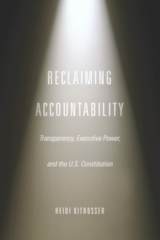 Reclaiming Accountability: Transparency, Executive Power, and the U.S. Constitution
Heidi Kitrosser
University of Chicago Press, 2014 Americans tend to believe in government that is transparent and accountable. Those who govern us work for us, and therefore they must also answer to us. But how do we reconcile calls for greater accountability with the competing need for secrecy, especially in matters of national security? Those two imperatives are usually taken to be antithetical, but Heidi Kitrosser argues convincingly that this is not the case—and that our concern ought to lie not with secrecy, but with the sort of unchecked secrecy that can result from “presidentialism,” or constitutional arguments for broad executive control of information.
In Reclaiming Accountability, Kitrosser traces presidentialism from its start as part of a decades-old legal movement through its appearance during the Bush and Obama administrations, demonstrating its effects on secrecy throughout. Taking readers through the key presidentialist arguments—including “supremacy” and “unitary executive theory”—she explains how these arguments misread the Constitution in a way that is profoundly at odds with democratic principles. Kitrosser’s own reading offers a powerful corrective, showing how the Constitution provides myriad tools, including the power of Congress and the courts to enforce checks on presidential power, through which we could reclaim government accountability.
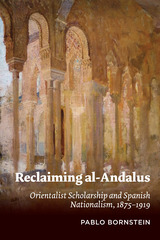 Reclaiming al-Andalus: Orientalist Scholarship and Spanish Nationalism, 1875–1919
Pablo Bornstein
Sussex Academic Press, 2022 Reclaiming al-Andalus focuses on the construction of the scholarly discipline of Orientalist studies in Spain. Special attention is paid to the impact that the elaboration of a series of historical interpretations of the legacy left by Muslim and Jewish culture in Spain had over the writing of national history in the period of the Bourbon Restoration. A historiographical account of Spain's Orientalism tackles the problematized issues that both Arabist and Hebraist scholars sought to address. Orientalist scholarship thereby became inextricably linked to different interpretations of the historical shaping of Spanish national identity. Political circumstances of the day impacted on the approach these scholars took as they engaged with the Iberian Semitic past. And this at a critical moment in the crystallization of modern Spanish nationalism.
A common thread running through the work of these Orientalist scholars was the tendency to nationalize or Hispanicize cultural activity of the Semitic populations that lived on the Iberian Peninsula in medieval times. This Hispanizication was instrumentalized in diverse ways in order to serve nation-building efforts. Hence Orientalist sc
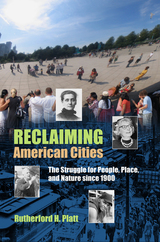 Reclaiming American Cities: The Struggle for People, Place, and Nature since 1900
Rutherford H. Platt
University of Massachusetts Press, 2014 For most of the past century, urban America was dominated by top-down policies serving the white business and cultural elite, the suburbs, and the automobile. At times these approaches were fiercely challenged by reformers such as Jane Addams and Jane Jacobs. Yet by the 1980s, mainstream policies had resulted in a nation of ravaged central cities, sprawling suburbs, social and economic polarization, and incalculable environmental damage.
In the 1990s, this entrenched model finally yielded to change as local citizens, neighborhood groups, and other stakeholders, empowered by a spate of new laws and policies, began asserting their own needs and priorities. Though hampered by fiscal crises and internal disagreements, these popular initiatives launched what the author terms a new era of "humane urbanism" marked by a determination to make cities and suburbs greener, healthier, safer, more equitable, more efficient, and generally more people-friendly. In the process, the mayors, architects, engineers, and bureaucrats who had previously dominated urban policy found themselves relegated to supporting roles.
As Rutherford H. Platt points out, humane urbanism can take many forms, from affordable housing and networks of bike paths to refurbished waterfronts and urban farms. Often spontaneous, low-tech, and self-sustaining programs, their shared goal is to connect people to one another and to bring nature back into the city. Reclaiming American Cities examines both sides of this historic transformation: the long struggle against patricians and technocrats of earlier decades and the recent sprouting of grassroots efforts to make metropolitan America more humane and sustainable.
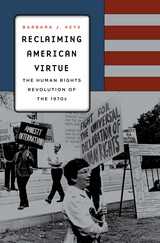 Reclaiming American Virtue: The Human Rights Revolution of the 1970s
Barbara J. Keys
Harvard University Press, 2014 The American commitment to international human rights emerged in the 1970s not as a logical outgrowth of American idealism but as a surprising response to national trauma, as Barbara Keys shows in this provocative history. Reclaiming American Virtue situates this novel enthusiasm as a reaction to the profound challenge of the Vietnam War and its tumultuous aftermath. Instead of looking inward for renewal, Americans on the right and the left alike looked outward for ways to restore America’s moral leadership.
Conservatives took up the language of Soviet dissidents to resuscitate a Cold War narrative that pitted a virtuous United States against the evils of communism. Liberals sought moral cleansing by dissociating the United States from foreign malefactors, spotlighting abuses such as torture in Chile, South Korea, and other right-wing allies. When Jimmy Carter in 1977 made human rights a central tenet of American foreign policy, his administration struggled to reconcile these conflicting visions.
Yet liberals and conservatives both saw human rights as a way of moving from guilt to pride. Less a critique of American power than a rehabilitation of it, human rights functioned for Americans as a sleight of hand that occluded from view much of America’s recent past and confined the lessons of Vietnam to narrow parameters. It would be a small step from world’s judge to world’s policeman, and American intervention in the name of human rights would be a cause both liberals and conservatives could embrace.
Reclaiming Basque: Language, Nation, and Cultural Activism
Jacqueline Urla
University of Nevada Press, 2015 The Basque language, Euskara, is one of Europe’s most ancient tongues and a vital part of today’s lively Basque culture. Reclaiming Basque examines the ideology, methods, and discourse of the Basque-language revitalization movement over the course of the past century and the way this effort has unfolded alongside the simultaneous Basque nationalist struggle for autonomy. Jacqueline Urla employs extensive long-term fieldwork, interviews, and close examination of a vast range of documents in several media to uncover the strategies that have been used to preserve and revive Euskara and the various controversies that have arisen among Basque-language advocates.
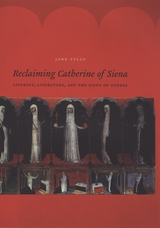 Reclaiming Catherine of Siena: Literacy, Literature, and the Signs of Others
Jane Tylus
University of Chicago Press, 2009 Catherine of Siena (1347–1380) wrote almost four hundred epistles in her lifetime, effectively insinuating herself into the literary, political, and theological debates of her day. At the same time, as the daughter of a Sienese dyer, Catherine had no formal education, and her accomplishments were considered miracles rather than the work of her own hand. As a result, she has been largely excluded from accounts of the development of European humanism and the language and literature of Italy. Reclaiming Catherine ofSiena makes the case for considering Catherine alongside literary giants such as Dante and Petrarch, as it underscores Catherine's commitment to using the vernacular to manifest Christ's message—and her own.
Jane Tylus charts here the contested struggles of scholars over the centuries to situate Catherine in the history of Italian culture in early modernity. But she mainly focuses on Catherine’s works, calling attention to the interplay between orality and textuality in the letters and demonstrating why it was so important for Catherine to envision herself as a writer. Tylus argues for a reevalution of Catherine as not just a medieval saint, but one of the major figures at the birth of the Italian literary canon.
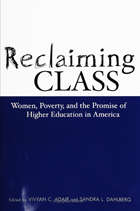 Reclaiming Class: Women, Poverty, And The Promise
edited by Vivyan C. Adair and Sandra L. Dahlberg
Temple University Press, 2003 Reclaiming Class offers essays written by women who changed their lives through the pathway of higher education. Collected, they offer a powerful testimony of the importance of higher learning, as well as a critique of the programs designed to alleviate poverty and educational disparity. The contributors explore the ideologies of welfare and American meritocracy that promise hope and autonomy on the one hand, while also perpetuating economic obstacles and indebtedness on the other. Divided into the three sections, Reclaiming Class assesses the psychological, familial, and economic intersections of poverty and the educational process. In the first section, women who left poverty through higher education recall their negotiating the paths of college life to show how their experiences reveal the hidden paradoxes of education. Section two presents first person narratives of students whose lives are shaped by their roles as poor mothers, guardian siblings, and daughters, as well as the ways that race interacts with their poverty. Chapters exploring financial aid and welfare policy, battery and abuse, and the social constructions of the poor woman finish the book. Offering a comprehensive picture of how poor women access all levels of private and public institutions to achieve against great odds, Reclaiming Class shows the workings of higher learning from the vantage point of those most subject to the vicissitudes of policy and reform agendas.
 Reclaiming Diasporic Identity: Transnational Continuity and National Fragmentation in the Hmong Diaspora
Sangmi Lee
University of Illinois Press, 2024 The Hmong diaspora radiates from Southeast Asia to include far-flung nations like the United States, New Zealand, and Argentina. Sangmi Lee draws on the concept of diasporic identity to explore the contemporary experiences of Hmong people living in Vang Vieng, Laos, and Sacramento, California. Hmong form a sense of belonging based on two types of experiences: shared transnational cultural and social relations across borders; and national differences that arise from living in separate countries. As Lee shows, these disparate influences contribute to a dual sense of belonging but also to a transnational mobility and cultural fluidity that defies stereotypes of Hmong as a homogenous people bound to one place. Lee’s on-the-ground fieldwork lends distinctive detail to communities and individuals while her theoretically informed approach clarifies and refines what it means when already hybrid and dynamic identities become diasporic. In-depth and interdisciplinary, Reclaiming Diasporic Identity blends ethnography and history to provide a fresh consideration of Hmong life today.
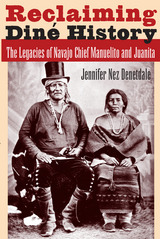 Reclaiming Diné History: The Legacies of Navajo Chief Manuelito and Juanita
Jennifer Nez Denetdale
University of Arizona Press, 2007 In this groundbreaking book, the first Navajo to earn a doctorate in history seeks to rewrite Navajo history. Reared on the Navajo Nation in New Mexico and Arizona, Jennifer Nez Denetdale is the great-great-great-granddaughter of a well-known Navajo chief, Manuelito (1816–1894), and his nearly unknown wife, Juanita (1845–1910). Stimulated in part by seeing photographs of these ancestors, she began to explore her family history as a way of examining broader issues in Navajo historiography.
Here she presents a thought-provoking examination of the construction of the history of the Navajo people (Diné, in the Navajo language) that underlines the dichotomy between Navajo and non-Navajo perspectives on the Diné past. Reclaiming Diné History has two primary objectives. First, Denetdale interrogates histories that privilege Manuelito and marginalize Juanita in order to demonstrate some of the ways that writing about the Diné has been biased by non-Navajo views of assimilation and gender. Second, she reveals how Navajo narratives, including oral histories and stories kept by matrilineal clans, serve as vehicles to convey Navajo beliefs and values.
By scrutinizing stories about Juanita, she both underscores the centrality of women’s roles in Navajo society and illustrates how oral tradition has been used to organize social units, connect Navajos to the land, and interpret the past. She argues that these same stories, read with an awareness of Navajo creation narratives, reveal previously unrecognized Navajo perspectives on the past. And she contends that a similarly culture-sensitive re-viewing of the Diné can lead to the production of a Navajo-centered history.
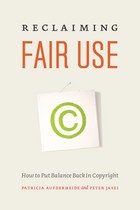 Reclaiming Fair Use: How to Put Balance Back in Copyright
Patricia Aufderheide and Peter Jaszi
University of Chicago Press, 2011 In the increasingly complex and combative arena of copyright in the digital age, record companies sue college students over peer-to-peer music sharing, YouTube removes home movies because of a song playing in the background, and filmmakers are denied a distribution deal when some permissions “i” proves undottable. Patricia Aufderheide and Peter Jaszi chart a clear path through the confusion by urging a robust embrace of a principle long-embedded in copyright law, but too often poorly understood—fair use. By challenging the widely held notion that current copyright law has become unworkable and obsolete in the era of digital technologies, Reclaiming Fair Use promises to reshape the debate in both scholarly circles and the creative community.
This indispensable guide distills the authors’ years of experience advising documentary filmmakers, English teachers, performing arts scholars, and other creative professionals into no-nonsense advice and practical examples for content producers. Reclaiming Fair Use begins by surveying the landscape of contemporary copyright law—and the dampening effect it can have on creativity—before laying out how the fair-use principle can be employed to avoid copyright violation. Finally, Aufderheide and Jaszi summarize their work with artists and professional groups to develop best practice documents for fair use and discuss fair use in an international context. Appendixes address common myths about fair use and provide a template for creating the reader’s own best practices. Reclaiming Fair Use will be essential reading for anyone concerned with the law, creativity, and the ever-broadening realm of new media.
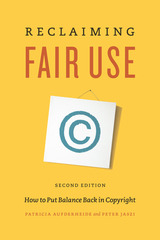 Reclaiming Fair Use: How to Put Balance Back in Copyright, Second Edition
Patricia Aufderheide and Peter Jaszi
University of Chicago Press, 2018 In the increasingly complex and combative arena of copyright in the digital age, record companies sue college students over peer-to-peer music sharing, YouTube removes home movies because of a song playing in the background, and filmmakers are denied a distribution deal when a permissions i proves undottable. Analyzing the dampening effect that copyright law can have on scholarship and creativity, Patricia Aufderheide and Peter Jaszi urge us to embrace in response a principle embedded in copyright law itself—fair use.
Originally published in 2011, Reclaiming Fair Use challenged the widely held notion that copyright law is obsolete in an age of digital technologies. Beginning with a survey of the contemporary landscape of copyright law, Aufderheide and Jaszi drew on their years of experience advising documentary filmmakers, English teachers, performing arts scholars, and other creative professionals to lay out in detail how the principles of fair-use can be employed to avoid copyright violation. Taking stock of the vibrant remix culture that has only burgeoned since the book’s original publication, this new edition addresses the expanded reach of fair use—tracking the Twitter hashtag #WTFU (where’s the fair use?), the maturing of the transformativeness measure in legal disputes, the ongoing fight against automatic detection software, and the progress and delays of digitization initiatives around the country.
Full of no-nonsense advice and practical examples, Reclaiming Fair Use remains essential reading for anyone interested in law, creativity, and the ever-broadening realm of new media.
|
|
